





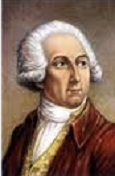



















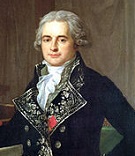
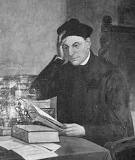



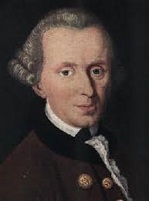




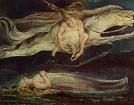
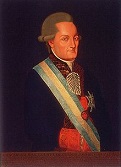
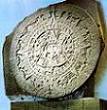
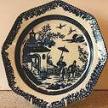

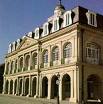

1790 The First (1st) U.S. Census (Aug. 1), run by U.S. secy. of state Thomas Jefferson reports the total pop. as 3,929,214, in a land area of 864,746 sq. mi., for a pop. density of 4.5 per sq. mi.; that's 3,277,000 white inhabitants (80.7%), 698K slaves, and 59K freed slaves; a total of 410,636 families, of which 47,664 own slaves; 40K are Irish-born, and 160K are of Irish descent; the pop. of New York City (which had been nearly deserted in 1776) is back up to a whopping 33K; Penn. is the most populous state with 434,373 pop.; the U.S. Jewish pop. is about 2K, mainly Sephardim, although Ashkenazim from C and E Europe are beginning to arrive; Mass. is the only state to record no slaves; only 5% of the pop. lives in cities; by 2000 the pop. of Puerto Rico alone is 3.9M. The U.S. dollar this year has the same purchasing power as $19.26 in the year 2002; the English pound has the same purchasing power as 70 pounds in 2002; a fine ounce of gold costs $19.50 or £4.25; the exchange rate is English £1 for U.S. $4.55 or 23.5 French livres. The Dual Rev. (economic and political) (ends 1848) begins in England and France, leading to the 19th cent. becoming a powder keg of people on the make and on the take? On Jan. 8 (Fri.) Pres. George Washington rides a carriage driven by six horses from his house on Cherry St. to Federal Hall in New York City to give the first State of the Union speech, welcoming the new state of N.C. - something so gigantic only one man can pull it off? On Jan. 23 nine HMS Bounty mutineers along with six Tahitian men and 12 Tahitian women land on 1.75-sq.-mi. Pitcairn Island, halfway between Australia and South Am. (near the three uninhabited islands of Henderson, Duicie, and Oeno), and sink HMS Bounty, creating Bounty Bay; the 24-gun frigate HMS Pandora is sent to capture Fletcher Christian, but fails, even though it does catch some of the other mutineers; in 1800 only one of the original nine British sailors, Adams, is left on Pitcairn, and Britain annexes it in 1838-9. Early in the year after Ottoman cmdr. Batal Pasha landed on the Black Sea coast last fall to gather local highland tribesmen, 3.6K Russian forces under Saxony, Germany-born Gen. Johann Hermann von Fersen (IVan Ivanovich Herman von Versen) (-1801) defeat 18K Turks and 15K tribesmen on the Upper Kuban River, losing only 150 Russian casualties while capturing Batal Pasha, causing a military fort to be built there in 1804 named Batalpashinsk, which later becomes Cherkessk, Russia. On Feb. 2 the U.S. Supreme Court (chief justice and four associate justices) holds its first session in the Royal Exchange Bldg. on Broad Street in New York City near Federal Hall before an eager crowd, but it adjourns on Feb. 10 because it has no cases to hear; the first members are John Jay (1745-1820) of N.Y. (#1) (Sept. 26, 1789-June 29, 1795), John Rutledge (1739-1800) of S.C. (#2) (Sept. 26, 1789-Mar. 4, 1791), who becomes U.S. Supreme Court justice #2 on June 30, 1795 (until Dec. 28, 1795), William Cushing (1732-1810) of Mass. (#3) (Sept. 27, 1789 to Sept. 13, 1810), James Wilson (1742-98) of Penn. (#4) (Sept. 29, 1789 to Aug. 21, 1798), John Blair Jr. (1732-1800) (#5) (Sept. 30, 1789 to Oct. 25, 1795), and James Iredell (1751-99) of N.C. (#6) (May 12, 1790 to Oct. 20, 1799) (youngest). On Feb. 20 Mozart-snubbing HRE Joseph II (b. 1741) dies, leaving a legacy of Josephinism (state control of the Church), and his brother Leopold II (1747-92) succeeds as ardchduke of Austria, and king of Bohemia, Hungary, and Croatia, followed on Sept. 30 by HRE and king of Germany (until Mar. 1, 1792); on July 22 Leopold's son Ferdinand III (1769-1824) succeeds him as grand duke of Tuscany (until Aug. 3, 1801, and 1814-24). On Mar. 4 the French nat. assembly replaces the old system of provinces and provincial parlements by 83 departments, which grows to 96 depts. in France and five overseas depts. (French Guiana, Guadeloupe, Martinique, Reunion, and Mayotte) by 1975; the depts. are subdivided into 342 arrondissements, which are divided into cantons. The Great American White-Is-Right Dream begins with the Father of the Country? On Mar. 26 Pres. Washington signs the U.S. Naturalization Act of 1790, barring anyone not a "free white person" from becoming a U.S. citizen; when Puerto Rico's citizens are allowed to become U.S. citizens in 1917, the govt. looks the other way and classifies them all as white. In Mar. Maximilien François Marie Isidore Robespierre (1758-94), member of the Estates-Gen. since 1789 becomes pres. of the Jacobin Club; meanwhile the more radical Cordeliers, led by Georges Jacques Danton (1759-94), Jean-Paul Marat, and radical journalists Camille Desmoulins and Jacques Rene Hebert (1757-94) (AKA Pere Duchesne) take the extreme left, while the moderate Feuillants (pr. foo-ya) (Fr. "leaves"), incl. Marquis de Lafayette and Jean-Sylvain Bailly break from the Jacobins and take the right (of the left); Hebert lived in poverty in Paris from 1780-90, until he became ed. of Le Journal du Soir, followed by Le Pere Duchesne, which makes him famous for its violent imagine-what-it-tastes-like republican tirades; meanwhile in the spring Comte de Mirabeau begins secret negotiations with the king, who gives him 100 louis a month to pay his lousy debts, with another 300 livres for his copyist De Comps, causing Mirabeau to begin living extravagantly again; too bad, the king never trusts him because of his attacks on the Church and his advocacy of the civil constitution of the clergy, plus his health is failing. On Apr. 10 after a dispute between steamboat inventors John Fitch and James Ramsey, the first U.S. Patent Act is passed; the first patent is issued to Samuel Hopkins (1743-1818) of Vt. for an apparatus for making potash, and is signed by Washington and Jefferson? On Apr. 12 the U.S. House votes down the U.S. Assumption Bill, proposed by U.S. treasury secy. Alexander Hamilton (1757-1804), then passes it by one vote on July 26, causing the U.S. govt. to assume the $25M war debt of the states (adding to its $54M nat. debt) while assuming a superior position to the states with regard to taxation, starting the unstoppable trend towards centralization of power in Washington, D.C. On Apr. 17 (a rainy spring) (11:00 p.m.) Benjamin Franklin (b. 1706) dies in his bed in Philly while drafting a memo to Jefferson about U.S.-Canadian relations; his funeral procession to Christ Church, led by all the clergymen of the city is watched by 20K mourners (the largest peacetime gathering in early U.S. history); despite a long life weasling about the propriety of slavery, "Dr. Doubleface" finally makes unambiguous antislavery remarks on Nov. 9, 1789, weeks before his death, and his position in history in a new country needing heroes is secure, although he never became U.S. pres. On May 13 the naval Battle of Reval (modern-day Talinn) in Estonia sees a 14-ship Russian fleet under Anglophile Adm. Vasily Yakovlevich Chichagov (1726-1809) defeat a 26-ship Swedish fleet under Prince Karl, Duke of Sodermanland, which retreats E of Hogland Island. On May 21 Thomas Warton Jr. (b. 1728) dies, and Henry James Pye (1744-1813) becomes poet laureate of England (until Aug. 11, 1813). On May 29 "Little Rhody", "Ocean State", "Littlest State" Rhode Island (R.I.), the first colony to renounce allegiance to King George III becomes the last of the original 13 states to ratify the U.S. Constitution, and by the closest vote of all (34-32), and it is admitted as the 13th U.S. (free) state; the "beauteous dome" (Mass. Centinel) is complete. On June 3 the Lady Juliana (Julian) (departed 1789) arrives in Sydney, Australia with 220 convict women ages 18-25, followed by three more ships on June 21 with provisions, saving the dying colony; en route the women fathered eight babies by the crew and others, as the women turned the ship into a floating brothel in ports such as Santa Cruz and Tenerife; Mary Wade (1778-1859) spawns 300 descendants in five generations before her death. On June 3-4 the naval Battle of Kronstadt in the Gulf of Finland sees Swedish naval forces unsuccessfully engage the Russian Kronstadt Squadron in an attempt to open a sea route to Kronstadt and St. Petersburg. On June 22 8K Russian troops under Gen. Count Ivan Vasilyevich Gudovich (1741-1820) siege Anapa, Russia, annihilating the 15K-man garrison while losing 4K Russians, capturing Sheikh Mansour; too bad, Anapa is returned by the 1792 Treaty of Jassy. On July 9 the U.S. House passes the U.S. Residence Act, ending a nat. quarrel in the spring about the location of the U.S. nat. capital, with Alexander Hamilton backing New York City (branded by his enemies as Hamiltonopolis), others backing Philadelphia, and Southerners backing the Potomac River area; Philadelphia is designated as the temporary nat. capital; Pres. George Washington selects the District of Columbia (Washington, D.C.) on the Potomac River in the swamp called Foggy Bottom (the closest commute to Mount Vernon) (on land originally inhabited by the Algonquian-speaking Nacotchtanks) as the new U.S. capital, to be readied for govt. use by June 1800; the site incl. an additional 30.75 sq. mi. on the Va. side of the Potomac River, which are returned to Va. in 1846; after a contest, Irish-born architect James Hoban (1755-1831) is selected as architect for the President's House and the U.S. Capitol. On July 12 the French Nat. Assembly approves the Civil Constitution of the Clergy, putting Roman Catholic bishops and priests as well as Church income under govt. control, and providing for the election of priests and bishops, pissing Pope Pius VI, who denounces it next year, while less than half of French priests declare loyalty to the govt.; on July 14 the king accepts the constitution, and the French clergy is disestablished, and all ecclesiastical orders dissolved, causing many to become beggars, and others to cross the Alps and take refuge in the Vatican. On July 17 Pres. Washington signs the U.S. Copyright Act of 1790, with the stated object of the "encouragement of learning" by securing to authors the "sole right and liberty of printing, reprinting, publishing and vending" copies of their "maps, charts, and books" for a term of 14 years, with the right to renew one time for an additional 14 years; too bad, it only applies to works of U.S. citizens until 1891, retaining the country's status as a pirate haven for works of foreign authors - we are a beacon of light around the world, at least that's what we can be again, should be again? On July 22 the U.S. (Indian) Intercourse (Nonintercourse) Act is passed, set to expire after four years, seting the boundaries of Native Am. reservations (Rezes), and prohibiting the purchase of Native Am. lands without the approval of the federal govt.; new ones are passed in 1793, 1796, 1799, 1802, and 1834, creating the ever-shrinking Indian Territory. On July 26 an attempted French counter-rev is put down by the Nat. Guard in in Lyons. On July 27 HRE Leopold II of Austria signs the Reichenbach Treaty in an attempt to be conciliatory toward Prussia regarding its gains (along with Russia) against the Ottoman Empire. In July the first settled portion of Illinois is organized into a county of the Ohio Territory; Pres. Washington appoints William Blount (1749-1800) of N.C. (member of the 1787 Constitutional Convention) as gov. of the "Territory of the United States South of the Ohio", and he soon founds the town of Knoxville in modern-day Tenn. On Aug. 4 the U.S. Coast Guard is established as the Revenue Cutter Service. On Aug. 9-10 the Columbia, captained by Robert Gray (1755-1806) returns to Boston Harbor after a 3-year voyage E via China (begun Sept. 30, 1787), becoming the first ship to carry the U.S. flag around the world; he then begins a 2nd voyage to the NW Am. coast - wasn't that the name of the shuttle that went kaboom? In Aug. Rama Varma VIII dies, and his nephew Rama Varma IX (Skhakthan Thampuran) (1751-1805) becomes Perumal king of Cochin (until 1805), signing a pact with the British. On Sept. 4 French finance minister (since Oct. 1776) Jacques Necker resigns, and Comte de Mirabeau makes a last ditch attempt to save the monarchy with a limited constitutional role of having the right to declare peace and war along with a royal veto. On Oct. 28 after Spain begins seizing British ships at Nootka Sound, and under threat of war backs down, the Nootka Sound Convention is negotiated. On Dec. 6 Congress moves from New York City to Philadelphia (until 1800). On Dec. 13 U.S. treasury secy. Alexander Hamilton jolts Congress with a call for an excise tax on liquor, followed on Dec. 14 by a call to charter America's first central bank. On Dec. 17 after Spanish viceroy (Oct. 17, 1789 to July 11, 1794) Juan Vicente de Guemes (Güemes) Padilla Horcasitas y Aguayo, 2nd Count of Revillagigedo (1738-99) orders work done on the Plaza de Armas (modern-day Zocalo) in Mexico City's main square, the 12-ft.-diam., 24 metric ton Aztec Calendar Stone (Stone of the Fifth and Last Sun or Era or Creation) is discovered, along with a statue of Aztec mother goddess Coatlicue (kwahTLEEkway); the calendar stone is embedded for viewing in the base of the city's main cathedral; the first four suns (creation of the world) were destroyed by jaguars, then wind, then fiery rain, and finally water; the 5th and last sun (of the Aztecs) was created in 1011 (13-Reed in the Aztec calendar), and would be destroyed on 4-Movement, which recurs every 52 years, but can be forstalled by sacrifices? On Dec. 20 the first cotton mill in the U.S. opens in Rhode Island. On Dec. 22 the Russians under Gen. Count Alexander Vasiliyevich Suvorov (1729-1800) sack the Turkish fort of Ismail in Bessaria, staging a bloody massacre that stinks Suvorov's name up enough to be placed in charge of an army to do ditto to the Poles and get a promotion to field marshal next year, staying in stinkin' Poland until 1795. The Alsace Province of NE France since 1648 gains its independence; the women are known for their giant black bow hats. The Creeks, who supported the British during the Am. Rev. make a peace treaty with the U.S. After learning that Maui king Kahekili II is on Oahu, Kamehameha I leads his 1.2K men to Maui against an equal size force led by Kalanikupule (b. 1760) in the bitter 3-day Battle of Kepaniwai (the Clawed Cliffs) (the Dammed Waters of Iao/Ka'uwa'upali) near modern-day Wailuku in the Iao Valley, which is a push until day three, when Kamehameha I uses two cannons named Lopaka and Kalola, causing the many corpses floating in the water to cause it to run red and dam the river; after killing his half-brother Keawemauhili in Hilo, Keoua Kuahu'ula ambushes Kamehameha I as he returns from Maui in the thick Pa'auhau Forest, resulting in a push, after which Keoua's retreating forces are caught by a volcanic eruption of Halemaumau Crater, the pit of 14K-ft. Kilauea below Mauna Loa on Hawaii Island (home of Pele, daughter of Hina) that kills two of three parties, allegedly leaving the 1790 Footprints, causing Kamehameha I to build the Pu'ukohola Heiau (Hawaiian "temple on the hill of the whale") in summer 1791, after which he invites Keoua to sign a peace treaty than ambushes and massacres his party, using the bodies to dedicate the new temple. British PM William Pitt refuses to recognize Belgian independence as the Austrians suppress the Belgian rev. in Brussels. The British make an alliance with the Nizam of Hyderabad. After returning from France bringing a goose-handled waffle iron that starts a craze, U.S. secy. of state Thomas Jefferson recommends that Congress declare war on the Muslim Barbary pirates, but after John Adams convinces them that it's just the cost of doing business in the Mediterranean, they whimp out and decide to earmark $140K for ransom (jizya) payments; Jefferson, James Madison, and Alexander Hamilton make a deal to make Washington, D.C. the U.S. capital at Jefferson's house. Taking advantage of Russia's preoccupation with the Ottoman Empire, Sweden negotiates the Treaty of Varala with Russia. Cluj-Napoca (pr. kluz na poka) in NW Romania (equidistant approx. 275 mi. from Bucharest, Budapest, and Belgrade) becomes the capital of the Grand Principality of Transylvania (until 1848, then 1861-7). After living for generations in Morocco and building the cities of Meknes and Fez, a change in rulers causes the Jews to be expelled, and 60 jump to their deaths by fire rather than convert to Islam on the orders of Moulay Yazid. The U.S. Congress forbids "benefit of clergy", which had been recognized in Va. and the Carolina colonies. The Roman Catholic archiepiscopal see in Arles, France, which goes back to the late 1st or early 2nd cent. is suppressed. The Society of Friends (Quakers) petitions the U.S. Congress to abolish slavery. Late in the cent. the town of Camborne (Gael. "crooked hill") at the S tip of Wales sees a boom in tin and cooper mining, becoming the richest mining area on Earth. Late in the cent. several thousand persecuted mainly rich merchant Jews from Arab countries, incl. Iraq (esp. Baghdad), Syria, Yemen. and Persia begin immigrating to India, becoming known as the Yehudi or Baghdadi Jews, settling in commercial cities incl. Surat, Bombay, and Calcutta, as well as Rangoon, Burma, later adopting the English language and migrating to England by the end of the 19th cent. About this time the Second Great Awakening begins in the U.S., ramping up about 1800 and peaking in the 1820s, increasing membership in Baptist and Methodist congregations by millions before fizzling by 1840; the Holiness movement, that a second work of grace leads to Christian perfection, whose roots are in Methodism gets a big boost; in 1817-25 the burned-over district of W. N.Y. between the Erie Canal and the Finger Lakes incl. the Palmyra, N.Y. area hosts several camp revival meetings, and 12-y.-o. Joseph Smith Jr. (1805-44) gets religion, attending church classes and reading the King James Bible, getting interested in Methodism and engaging in religious folk magic with family members incl. parents and maternal grandfather, who report visions and dreams from God; Smith's education never incl. history, philosophy, lit., or science, just the Bible and popular historical moose hockey?; the burned-over district goes on to spawn religious nonconformist sects. incl. Latter Day Saints, Millerites, Adventists, Internat. Bible Students (Jehovah's Witnesses), the table-rapping Fox Sisters, Shakers, and Oneida Society, and social radicals incl. Elizabeth Cady Stanton, the Fourierist utopian Socialist movement, the Skaneateles Community, and Walter Rauschenbusch, leader of the Social Gospel. In this decade the Romantic Movement (ends 1850s), rejecting the cold mechanistic view that people are just cogs in a machine, and stressing individuals with all their passions and mood swings as the only real deal; take Napoleon for instance? In this decade Thomas Jefferson discovers vanilla in France, and has 50 pods sent to him in Philly. James Monroe is elected to the U.S. Senate from Va. (until 1794), working for the Anti-Federalists against Washington's admin. Russian fur trader Alexander Baranov (1747-1819) explores Alaska, establishing trading posts in Kodiak Island and becoming dir. of the Russian Am. Co. in 1799. The British Vancouver Expedition (ends 1793) led by English naval Capt. George Vancouver (1758-98) and 2nd Lt. Peter Puget (1765-1822) begins exploring the NW Am. coast; in 1792 they explore 100-mi.-long Puget Sound, names 14,408-ft. Mt. Rainier after British Adm. Peter Rainier (1741-1808), circumnavigates Vancouver Island, then heads for Hawaii, discovering the yummy Chatham Islands (10 islands 800 km E of New Zealand) (later the first inhabited land on Earth to greet the first dawn of each year) along the way; in 1793 Vancouver brings a gift of one bull and five cows to Hawaiian king Kamehameha I on the Big Island of Hawaii, who escape and multiply, damaging the ecosystem until Newton, Mass.-born John Palmer Parker (1790-1868) establishes Parker Ranch on the N slope of Mauna Kea in 1847; in 1794 Vancouver claims the Hawaiian Indians, er, Islands as a protectorate of Great Britain. John Paul Jones resigns from the Russian navy grumbling about not receiving proper credit for his Vs, and goes to Paris, where he awaits an appointment as U.S. consul to Algiers, which arrives after he dies in 1792. The Marquis de Lafayette gives Pres. George Washington the key to the Bastille. In this decade the French Rev. causes French hairstyles for men and women to go decidedly simple and unaristocratic - if you want to keep your head? Late in this decade after being excommunicated by his local Congregationalist church in 1789, Nathaniel Wood Sr. founds the New Israelites sect in Middletown, Rutland County, Vt., which practices polygamy (spiritual wifery) and divination, believes in perfectionist immortalism, and believes they are descendants of the Ten Lost Tribes of Israel and possess power of revelation through dowsing (divining) rods (a cover for counterfeiting?), going on to get into the Wood Scrape on Jan. 14, 1802 when he predicts the imminent arrival of a Destroying Angel, causing the militia to be called out, after which he flees to Ellisburg, Jefferson County, N.Y.; Joseph Smith Sr., father of Mormonism founder Joseph Smith Jr. becomes a member, along with Mormon Church co-founder Oliver Cowdery, who may be a co-author of the Book of Mormon because the original ms. is in his handwriting? The Hasty Pudding Social Club undergrad theatrical society is formed at Harvard U., named after the tasty dish they ate at their first meeting, becoming known for staging burlesque cross-dressing musicals beginning with "Bombastes Furioso" on Dec. 13, 1844; members incl. Theodore Roosevelt, Franklin D. Roosevelt, J.P. Morgan, Oliver Wendell Holmes, William Randolph Hearst, Alan Jay Lerner, and Jack Lemmon, and Harvard pres. (1849-53) Jared Sparks, who grants them their first club rooms at Stroughton Hall. Welsh Enlightenment philosopher David Williams (1738-1816) founds the Royal Literary Fund to help authors, distributing £1,738 to 105 authors in the next 12 years - every night is ladies' night? The soft red-pointed Phrygian Cap, worn by freed slaves in the ancient Roman Empire, and used during the Am. Rev. to top a Liberty Pole makes its appearance at Cafe Procope in Paris, becoming the symbol of the French Rev., and later of many freedom movements, ending up on the official seals of the U.S. Army and Senate, plus the coats of arms of Argentina, Cuba, Nicaragua, Colombia, Haiti, and other C and S Am. countries. In this decade English begins to replace Gaelic in Irish lit.; it takes a cent. for a Gaelic revival to take place. Wojciech Boguslawski (1757-1829) becomes dir. of the Royal Theater in Warsaw, and goes on to become the father of Polish theater. Annalen der Physik (Annals of Physics), later Albert Einstein's favorite periodical begins pub. in Germany. Dunderdale & Co. of Castleford, Yorkshire begins producing Castleford Ware, smooth white stoneware teapots with four concave or convex corner panels and blue enamel relief decoration (until 1821). Architecture: The Church of St. Genevieve in Paris (begun 1758) is finished and turned into the Pantheon (Panthéon) (Gr. "Temple of All the Gods"), enshrining tombs of famous Frenchmen, starting with Mirabeau on Apr. 4, followed by Voltaire on July 11. The land that later becomes the South Lawn of the White House is sold in this decade by planter Davy Burns - when do the Easter egg hunts begin? The Oxford-Birmingham Canal is begun. The Forth and Clyde Canal (begun 1768) is completed. In this decade a classic revival movement begins in Euro-Am. architecture, along with a Romantic literary-driven Gothic revival, which reaches it peak in the mid 19th cent.; France already has so many Gothic bldgs. that the Gothic revival is limited to restoring them. In this decade the Cabildo is built as the seat of govt. for Spanish New Orleans. Sports: The Turf Club in Ireland is formed to oversee Irish horseracing and run the Curragh Racecourse. Inventions: Pierre Jacquet-Droz (1721-90) and his able apprentice Jean Frederic Leschot (1746-1824) of Geneva make the first Wristwatch. Am. dentist Josiah Flagg (1763-1816) invents the Dental Chair. The first Ocean Wave Electrical Generator is invented by ?. The Blue Willow Pattern for China (river, pagoda, willows, etc., in blue on a white background) is invented in Stoke-on-Trent, Staffordshire, England by Thomas Minton (1765-1836) - how many years to Bluetooth? In 1790 William Nicholson of England patents the Rotary Press, but fails to build a prototype. William Pollard receives the first U.S. patent for a cotton spinning and weaving machine. London cabinetmaker Thomas Saint is issued the first patent for a sewing machine, which uses an awl to create a hole through which a needle passes when stitching leather; modern attempts to replicate it fail to make it work? The Shoestring is invented in England to replace buckles by ?. Science: French chemist Antoine-Laurent Lavoisier (1743-94) becomes a member of a commission to establish a uniform system of weights and measures, coming up with the Metric System. French surgeon-chemist Nicolas Leblanc (1742-1806) develops a process for producing sodium carbonate (alkali) (used to make lye) from common table salt using sulfuric acid, carbon, and calcium carbonate, paving the way for industrial soap manufacture, but it takes until the end of the 19th cent. for manufactured soap to become popular and have a global market. Nonfiction: The Grimoire Decade? Anon., The Black Pullet (La Pule Noire); a grimoire (magician's handbook) written by a French officer in Napoleon's army who allegedly was taken by an old Turkish man into a pyramid and shown Ptolemy's ancient library. Anon., The Sixth and Seventh Books of Moses; a grimoire probably written in this decade or earlier, which becomes popular in Germany after an 1849 printing. Alibek the Egyptian, Grimorium Verum (The True Grimoire) (Grimoire of Truth) (Grimorium Verum); claims to be written in Memphis in 1517. Anon., The Grand Grimoire; another grimore claiming to be written in 1522 by "the Red Dragon"; both probably written in this decade or earlier. Johann Friedrich Blumenbach (1752-1840), Collectionis suae Craniorium Diversarum Gentium (1790-1828); his observations of skulls of different races: Caucasian, Mongolian, Malay, American, Ethiopian - soft on illegal aliens? James Bruce (1730-94), Travels to Discover the Sources of the Nile, 1768-1773; his credibility is questioned at the time, but later confirmed. Edmund Burke (1729-97), Reflections on the Revolution in France (Nov. 1); alt. title: Feudalism Rocks?; founds the philosophy of modern conservatism; written in response to radical Protestant dissenter Richard Price and other French Rev. supporters, questioning it from a reactionary POV, supporting religious institutions as moral stabilizers of society; predicts that the French Rev. will go corrupt and violent, ending in a military dictatorship, becoming a favorite of George III and Joseph de Maistre; condemns the French Rev. persecution of the Roman Catholic Church, causing accusations of being a secret Catholic; when Charles James Fox becomes practically the only MP to support the French Rev., he loses Burke's friendship, becoming leader of the New Whigs, while Burke leads the Old Whigs; replies incl. "A Vindication of the Rights of Men" (1790) by Mary Wollstonecraft, and "Rights of Man" (1791) by Thomas Paine; "As literature, as political theory, as anything but history, his Reflections is magnificent" (Alfred Cobban); "All circumstances taken together, the French revolution is the most astonishing that has hitherto happened in the world. The most wonderful things are brought about in many instances by means the most absurd and ridiculous; in the most ridiculous modes; and apparently, by the most contemptible instruments. Every thing seems out of nature in this strange chaos of levity and ferocity, and of all sorts of crimes jumbled together with all sorts of follies"; "The age of chivalry is dead, that of sophisters, economists and calculators has succeeded, and the glory of Europe is extinguished forever." Jean-Antoine Chaptal (1756-1832), Elements of Chemistry (3 vols.) (Montpellier); coins the term "nitrogen", from Fr. "nitre" (potassium nitrate AKA saltpeter) + "gene" (producing). Andre Marie Chenier (1762-94), Avis au Peuple Francais (Aug. 24); Jeu de Paume ; moral ode addressed to Jacques David. Dobson's Encyclopedia (18 vols.); a U.S. ed. of the Encyclopedia Britannica. Johann Wolfgang von Goethe (1749-1832), Versuch, die Metamorphose der Pflanzen zu Erklaren; develops ideas on comparative morphology and anticipates Darwinian evolution. Gustav von Hugo (1764-1844), Civilistisches Magazin (6 vols.) (1790-1837). Samuel Ireland (1744-1800), A Picturesque Tour through Holland, Brabant, and Part of France Made in the Autumn of 1789 (2 vols.). Immanuel Kant (1724-1804), Critique of Judgment (Kritik der Urteilskraft); founds modern aesthetics; divided into Critique of Aesthetic Judgment and Critique of Teleological Judgment. Nikolai Karamzin (1766-1826), Letters of a Russian Traveller (1790-2); pub. in the Moscow Journal; earns him a rep and gets him appointed as imperial historiographer in 1803. Manuel De Lacunza (1731-1801); The Coming of the Messiah in Glory and Majesty (La venida del Mesias en gloria y majestad); his magnum opus; printed secretly in Cadiz in 1810-11 under the alias Rabbi Juan Josafat Ben-Ezra, backing Francisco Ribera's Biblical doctrine of Futurism; too bad, on Jan. 15, 1819 the Spanish Inquisition orders it suppressed, and in Sept. 1824 Pope Leo XII places it on the Index of Prohibited Books, which only makes it more popular, causing eds. to be pub. in Paris in 1825 and London in 1826? Antoine Lavoisier (1743-94), Table of 31 Chemical Elements; founds modern chemistry with the first quantitive chemical experiments, rejecting the phlogiston theory after meticulously burning things and measuring all the byproducts and proving that matter is conserved, considering heat (caloric) and light to be elements and counting the role of oxygen and hydrogen, the components of water, naming both; "Nothing is lost, nothing is created, everything is transformed"; too bad, he pisses-off aspiring scientist Jean-Paul Marat, who later pays him back by circulating a denouncement that gets him a free French close shave. William Paley, Horae Paulinae; why the New Testament isn't a fable because of its "undesigned coincidences". America and France go one way, Russia the other? Alexander Radishchev (Raditcheff) (1749-1802), Journey from St. Petersburg to Moscow; the first book describing the horrors of serfdom and pleading for their emancipation; Catherine II the Great gets pissed, has him arrested and exiled to Siberia until 1801; upon release he commits suicide. David Ramsay (1749-1815), The History of the American Revolution (2 vols.). Thomas Taylor (1758-1835), The Eleusinian and Bacchic Mysteries. Music: Carl Michael Bellman (1740-95), Epistles of Fredman; more Swedish hits. Vicente Martin y Soler (1754-1806), Melomania (opera) (St. Petersburg). Wolfgang Amadeus Mozart (1756-91), Cosi Fan Tutte (opera) (Vienna) (Jan. 2); 1st time since 1787 that he receives a commission? Art: Francesco Guardi (1712-93), Gondola on the Lagoon (Venice). Jean-Antoine Houdon (1741-1828), Louis XVI (sculpture). Sir Henry Raeburn (1756-1823), The Skating Minister (Rev. Robert Walker on Duddingston Loch); relatively unknown until 1949, when it becomes a Scottish icon. Edward Savage (1761-1817), Portrait of George Washington; gift to Harvard U. Plays: Johann Wolfgang von Goethe (1749-1832), Torquato Tasso (poetic drama); "The day of fortune is like a harvest day,/ We must be busy when the corn is ripe" (4.4.63); Fragment (work on Faust). August von Kotzebue (1761-1819), Menschenhass und Reue; Die Indianer in England; Doktor Bahrdt Mit der Eisernen Stim (satire); links to political opponents of J.G. Zimmermann to sexual perversions, backfiring on him and hurting his rep. Leandro Fernandez de Moratin (1760-1828), The Old Man and the Young Girl (El Viejo y la Nina) (comedy) (first play). Poetry: Mercy Otis Warren (1728-1814), Poems, Dramatic and Miscellaneous; her first pub. with her name; incl. the plays "The Sack of Rome" and "The Ladies of Castille". Novels: William Blake (1757-1827), The Marriage of Heaven and Hell (1790-3); disses Emanuel Swedenborg's 1759 "Heaven and Hell", arguing that the material world and sexual desire are equally part of the divine order; "If the doors of perception were cleansed, everything would appear to man as it is, infinite." Ann Radcliffe (1764-1823), A Sicilian Romance. Charlotte Ramsay Lennox (1729-1804), Euphemia. Births: Irish archeologist George Petrie (d. 1866) on Jan. 1 in Dublin; son of James Petrie. English paleontologist Gideon Algernon Mantell (d. 1852) on Feb. 3 in Lewes, Sussex. English physician-physiologist ("Father of Modern Neurology") Marshall Hall (d. 1857) on Feb. 18 in Basford (near Nottingham); educated at Edinburgh U. English chemist-physicist John Frederic Daniell (d. 1845) on Mar. 12 in London; educated at King's College, London. Am. philanthropist William Johnson Walker (d. 1865) on Mar. 15 in Charlestown, Mass. U.S. Dem. pres. #10 (1841-5) and vice-pres. #10 (1841) ("His Accidency") John Tyler IV (d. 1862) on Mar. 29 in Greenway, Charles City County, Va.; of English descent; educated at William and Mary College; first pres. born after the adoption of the U.S. Constitution, and first to not be elected - Tyler too? French surgeon Jacques Lisfranc de St. Martin (d. 1847) on Apr. 2; the Lisfranc joint in the foot is named after him. Hawaiian rancher John Palmer Parker (d. 1868) on May 1 in Newton, Mass.; immigrates to Hawaii in 1809. French sculptor James (Jean-Jacques) Pradier (d. 1852) on May 23 in Geneva, Switzerland. French naval officer and explorer (1820 discoverer of the Venus de Milo) rear adm. Jules Sebastien Cesar Dumont d'Urville (d. 1842) on May 23 in Conde-sur-Noireau, Normandy. U.S. Sen. (D-Ark.) (1844-8) (co-founder of Rose Law Firm) Chester Ashley (d. 1848) on June 1 in Amherst, Mass.; educated at Williams College; namesake of Ashley County, Ark. Venezuelan rev. leader Gen. Jose Antonio Paez (Paéz) Herrera (d. 1873) on June 13 in Curpa. Welsh sculptor John Gibson (d. 1866) on June 19 near Conwy; student of Antonio Canova. Breakin' my back just to know your name? British (Welsh) surveyor-gen. of India (1830-43) Col. Sir George Everest (d. 1866) on July 4 in Crickhowell, Wales; first Euro to discover (not climb) Mt. Everest. Am. "Young America", "Marco Bozzaris" Knickerbocker Group poet (gay?) ("the American Byron") Fitz-Greene Halleck (d. 1867) on July 8 in Guilford, Conn. Hungarian "Himnusz" poet Ferenc (Francis) Kolcsey (Kölcsey) (d. 1838) on Aug. 8 in Szodemeter (Sauca, Romania). English Big Ben watchmaker Edward John Dent (d. 1853) on Aug. 19 in London. English atty.-economist (utilitarian) Nassau William Senior (d. 1864) on Sept. 26 in Compton, Berkshire; educated at Eton School, and Magdalene College, Oxford U. English "Combination" novelist Charlotte Elizabeth Tonna (d. 1846) on Oct. 1. Am. Cherokee chief (1828-66) John Ross (Coowescoowe) (Kooweskoowe) (Guwisguwi) ("the Heron") (d. 1866) on Oct. 3 in Turkeytown, Ala.; part-Cherokee father, Scottish mother. French Romantic "Le Lac" writer-poet-politician Alphonse Marie Louise de Prat de Lamartine, Knight of Pratz (d. 1869) on Oct. 21 in Macon, Burgundy; first French Romantic poet. Scottish Stirling Engine engineer Rev. Robert Stirling (d. 1878) on Oct. 25 in Cloag Farm, Perthshire - the real Scotty? Paraguayan pres. (1844-62) Carlos Antonio Lopez (d. 1862) on Nov. 4 in Asuncion. U.S. First Lady (1841-2) Letitia Christian Tyler (d. 1842) on Nov. 12 in Tidewater Va.; ballsy Pres. Tyler's first of two fecund wives. German mathematician August Ferdinand Mobius (d. 1868) in Saxony on Nov. 17. English freethinker-reformer Richard Carlile (d. 1843) on Dec. 9 in Ashburton, Devonshire. Corsican adventurer Giuseppe Marco Fieschi (d. 1836) on Dec. 13 in Bocognano. English Artic explorer rear Adm. Sir William Edward Parry (d. 1855) on Dec. 19 in Bath; knighted in 1829. Belgian king #1 (1831-65) Leopold I (Georges Chretien Frederic) (d. 1865) (Prince Leopold of Saxe-Coburg) on Dec. 16 in Coburg; father of Leopold II (1835-1909). French polyglot philologist (Rosetta Stone decipherer) Jean-Francois Champollion (d. 1832) on Dec. 23 in Figeac, Lot. Canadian explorer Peter Skene Ogden (d. 1854) in Quebec City, Quebec. Uruguayan poet Francisco Acuna (Acuña) de Figueroa (d. 1862) in Montevideo. Am. Sioux Indian chief Lone (One) Horn (d. 1875) on Nov. 16 in S.D.; son of Black Buffalo, whom he commemorates by wearing a single shell (horn) around his neck; father of Big Foot (1824-90) and Touch the Clouds (1836-1905); uncle of Crazy Horse (1842-77). Scottish physician-explorer Walter Oudney (d. 1824); educated at the U. of Edinburgh. English merchant John Owens (d. 1846) in Manchester. U.S. Supreme Court justice #23 (1835-67) James Moore Wayne (d. 1867) in Savannah, Ga.; educated at Princeton U. Deaths: Am. demigod Benjamin Franklin (b. 1706) on Apr. 17 in Philadelphia, Penn.: "One today is worth two tomorrows"; "We get old too soon and wise too late"; "Nothing is certain except death and taxes"; "My face is now almost as well known as that of the Moon"; "They that can give up essential liberty to obtain a little temporary safety deserve neither liberty nor safety"; "There never was a good war or a bad peace"; "Whoever would overthrow the liberty of a nation must begin by subduing the freeness of speech"; "Our new Constitution is now established, everything seems to promise it will be durable; but, in this world, nothing is certain except death and taxes"; "He that is of the opinion money will do everything may well be suspected of doing everything for money"; "When the people find they can vote themselves money, that will herald the end of the republic"; "If you would not be forgotten, as soon as you are dead and rotten, either write things worth reading, or do things worth the writing"; "Life is a kind of chess"; "In wine there is wisdom, in beer there is Freedom, in water there is bacteria." French adm. Luc Urbain de Bouexic, comte de Guichen (b. 1712) on Jan. 13 in Morlaix. French artist Charles-Nicolas Cochin the Younger (b. 1715) on Apr. 29 in Paris. Spanish sign language inventor Giacobbo Rodriguez Pereire (b. 1715) on Sept. 1 in Paris. Austrian field marshal Baron Ernst Gideon von Laudon (b. 1717) on July 14 in Novy Jicin, Czech. Am. Rev. War. Gen. Israel "Old Put" Putnam (b. 1718) on May 29 in Brooklyn, Conn. Am. Congregationalist minister Joseph Bellamy (b. 1719) on Mar. 6 in Bethlehem, Conn. Scottish "Wealth of Nations" political economist Adam Smith (b. 1723) on July 17 in Edinburgh. Am. statesman William Livingston (b. 1723) on July 25 in Elizabeth, N.J. German pedagogue J.B. Basedow (b. 1724) on July 25 in Magdeburg. Am. Rev. leader (DOI signer) Lyman Hall (b. 1724) on Oct. 19 in Ga. Am. politician James Bowdoin II (b. 1726) on Nov. 6 in Boston, Mass. (TB); namesake of Bowdoin College. German deaf educator Samuel Heinicke (b. 1727) on Apr. 30 in Leipzig. English poet laureate Thomas Warton Jr. (1728) on May 21. Am. Baptist scholar Robert Robinson (b. 1735) on June 9. in Showell Green (near Birmingham); dies in the home of a Unitarian friend of Unitarian chemist Joseph Priestley. Austrian HRE Joseph II (b. 1741) on Feb. 20 in Vienna. Am. jurist Robert Hanson Harrison (b. 1745) on Apr. 2 in Charles County, Md.






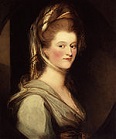





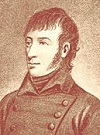
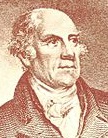









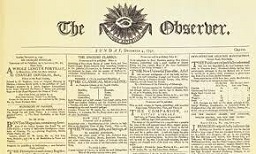
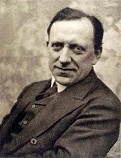

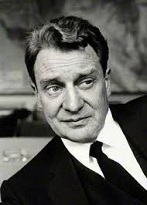
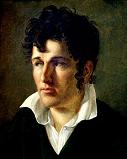

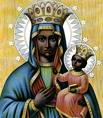

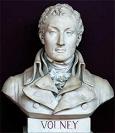


1791 On Jan. 3 the Methodist Episcopal (Old) New York Hospital (planned since 1769) opens, becoming the first public hospital in Brooklyn, N.Y. (40 years after Philly), and the first Methodist hospital. On Jan. 16 margrave (since Aug. 3, 1757) Charles Alexander sells his margraviate of Brandenburg-Ansbach to Prussia in return for 300K guilders/year, and abdicates in Bordeaux, France on Dec. 2 after marrying Lady Elizabeth Craven (1750-1828), daughter of the 4th earl of Berkeley in England on Oct. 13 (31?), moving to England, buying the Benharm Park estate in Speen (near Newbury) in West Berkshire, breeding horses. On Feb. 13 Pomare II (1782-1821) is installed as king #2 of Tahiti by his father Pomare I, and rules under regents until 1803. On Feb. 25 the First Bank of the U.S., proposed by U.S. treasury secy. Alexander Hamilton is chartered for 20 years by the U.S. Congress, becoming the first central bank of the U.S. (until 1811); it is housed in Carpenter's Hall in New York City until 1795, when a new $110K neo-classical bldg. is built to house it at Third St. between Chestnut and Walnut Sts. (finished 1797), becoming the first bldg. in the U.S. with a classical facade; Hamilton is a secret agent of German Jewish banker Mayer Amschel Rothschild (1744-1812)? In Feb. the U.S. Supreme (Jay) Court accepts its first docketed case, Van Staphorst v. Md., regarding an Am. Rev. War loan that Md. reneged on; it is settled before oral arguments. Tres Amigos? In Feb.-Mar. in England Thomas 'Tom' Paine (1737-1809) pub. the bestseller The Rights of Man, Pt. 1, a refutation of Edmund Burke's 1790 Reflections on the Revolution in France, defending the French Rev. and opposing monarchy, selling 1.5M copies and getting him into trouble with the govt., which assesses heavy penalties; British dramatist Thomas Holcroft (1745-1809) assists Paine in the publication, and in fall 1794 after joining the Society for Constitutional Information, he is indicted for high treason and held in Newgate Prison, then released in Dec. 1794 without a trial, causing secy. of war William Windham to call him an "acquitted felon", ruining his career, which doesn't stop him from cranking out 31 plays - heads will roll? On Feb. 28 Marquis de Lafayette stops a riot and plot against the royal family. On Mar. 4 9.25K-sq.-mi. "Green Mountain State" Vermont (Vt.) is admitted as the 14th U.S. state (free). On Apr. 2 Comte de Mirabeau (b. 1749) dies of pericarditis after being elected pres. of the French nat. assembly, declaring "I carry with me the ruin of the monarchy; after my death factions will dispute about the fragments", and the moderate republican Girondist party takes power in France (until 1793), eager for war. On May 3 Poland proclaims the U.S.-style Third of May Constitution, pissing off greedy Russia, Austria, and Prussia, who declare war on it and kick its butt by 1793. On June 14 the Le Chapelier Law outlaws all worker assocs. incl. cooperatives in an attempt to destroy the last remnants of the guild system and demonstrate the govt.'s commitment to recognize only one type of property, land; on July 20 it is extended to agricultural workers and servants. On June 20 after a year and a half of living without her fairy tale Petit Trianon world, Marie Antoinette finally quits being a bubble-headed blonde, gets smart, and plans and executes the secret Flight to Varennes, with her beau Count Hans Axel von Fersen the Younger (1755-1810) as driver, but since the king and queen are unable to get over the royal protocol bit and insist on traveling in a fancy new carriage which sticks out like a sore cake (and Louis' face is on the money?) on June 20 they are spotted and stopped at Varennes, 40 mi. from Austrian troops on the NE frontier waiting to protect them and lead an invasion to quash the rev., and turned back to Paris, driven slowly through angry crowds, who spit on "the most hated woman in France" Marie Antoinette while crying "we love you alone" to cypher-brained peasant-faced Louis, arriving on June 25; after this caper, their heads are as good as in the basket? On July 2 the Treaty of (the) Holston settles Tenn. territorial boundaries with the Cherokees, also establishing that the Cherokee tribes fall under the protection of the U.S., which will manage all their foreign affairs. On July 4 the First Bank of the United States puts its stock up for sale, and all $2M of it sells out within a few hours. On July 16 the king is suspended from office until he agrees to ratify the constitution (Sept. 14). On July 17 Marquis de Lafayette, cmdr. of the French Nat. Guard makes his last effort to control the sacred right of insurrection on the Champ de Mars in Paris, where a crowd attempts to draft a petition demanding the removal of Louis XVI, but after they fire on his soldiers, they fire back, causing the Massacre of the Champ de Mars, which discombobulates Europe; French astronomer (mayor since 1789) Jean-Sylvain Bailly (1736-93), who ordered it, becomes unpopular and retires to Nantes, and ends up getting guillotined 1793 after trying to visit his scientific colleague Pierre Simon Laplace at Melun and getting arrested - like a Three Stooges moron? In July Irish sympathy for the French Rev. results in 6K in "Athens of the North" Belfast voting a congratulatory message to the French nation; meanwhile on Oct. 18 after pub. "Argument on Behalf of the Catholics of Ireland", Dublin-born ("Father of Irish Republicans") Theobald Wolfe Tone (1763-98), along with Dublin-born James Napper Tandy (1740-1803), County Cork-born Thomas Paliser Russell (1767-1803), and London-born Archibald Hamilton Rowan (1751-1834) found the Society of the United Irishmen in Dublin (until 1804), with the aims of union among the Irish people, constitutional reform, and removal of all religious disqualifications; it is soon outlawed. In July the unpopular 28% federal excise tax on whiskey and domestic spirits takes effect, becoming the first federal excise tax on a U.S. product; it doubles the fun by imposing a higher rate on small producers, most of whom are in the west, and is doubled again by Alexander Hamilton's explanation that the tax is needed to pay off the nat. debt, which the western victims of the tax believe is due to wealthy easterners?; soon federal collectors are shunned, tarred, feathered, blindfolded and whipped as popular sentiment equates them with the hated former British tax collectors of the Stamp Act era, and mock guillotines are set up, stirring fears of a French-style rev. on Am. soil?; Washington decides to set a precedent by using a federalized militia against them, while Hamilton sees it as his big chance, supervising the mobilization and serves as chief of staff? On Aug. 3 the U.S. Supreme (Jay) Court rules unanimously in West v. Barnes that a writ of error (appeal) must be issued within 10 days by the clerk of the Supreme Court, not by a circuit court, causing Congress to pass section 9 of the U.S. Judicial Act of 1793 to permit it, becoming the first U.S. Supreme Court decision and the first calling for oral argument, which are all pub. by Philly lawyer Alexander James Dallas (1759-1817), the first (unofficial) Supreme Court Reporter in the U.S. Reports starting with vol. 2 (vol. 1 contains Penn. court decisions); in 1817 Congress makes the Reporter of Decisions an official salaried position; they are printed privately until 1874, when the govt. starts funding them. On Aug. 22-23 Black August in N Haiti (the French colony of Santo Domingo) (home of large-scale Indian genocide and African slavery) sees 400K-500K African slaves begin the Haitian Rev. (ends Jan. 1, 1804), an emeute (émeute) (uprising) against 30K white French slavemasters over the brutal conditions that have killed nearly 25K each year for the past cent., which later turns into the Haitian Rev. (ends 1804) becoming the first successful slave rebellion in history; before they start the uprising they dance a Voodoo Dance in Bwa Kayiman (Cayman) (Bois Caiman) (Caiman Forest), led by Haitian voodoo priestess Cecile Fatiman, who channels the spirit of warrior-love goddess black madonna with child Ezili Dantor, and crowns the African warrior Boukman with her royal red Petwo scepter to declare war, after which those present drink the blood of a black pig and swear that they will drive out the white French slavemasters or die trying, causing Euros to claim they made a pact with the Devil and that therefore Haiti is forever cursed by God. On Aug. 27 the Declaration of Pillnitz (Pilnite) is signed at Pillnitz Castle near Dresden by Frederick William II of Prussia and HRE Leopold II of Austria (brother of Marie Antoinette), promising to intervene in French affairs to restore Louis XVI, but only with the unanimous consent of the other powers incl. Britain; instead of stopping the French Rev., it helps trigger it a few weeks after Leopold II's death? On Aug. 30 after finding out about self-educated free black almanac maker Benjamin Banneker (1731-1806), who could do math and knew astronomy, Thomas Jefferson writes a letter him, expressing his delight in being proved wrong about their supposed incurable inferiority, with the soundbyte: "No body wishes more than I do to see such proofs as you exhibit, that nature has given to our black brethren, talents equal to those of the other colors of men, & that the appearance of a want of them is owing merely to the degraded condition of their existence both in Africa & America. I can add with truth that no body wishes more ardently to see a good system commenced for raising the condition both of their body & mind to what it ought to be, as fast as the imbecility of their present existence, and other circumstance which cannot be neglected, will admit." In Aug. after running off together from the frontier town of Memphis, Tenn., aspiring politician Andrew Jackson (b. 1767) marries Mrs. Rachel Donelson Robards (1767-1828) despite legal uncertainties about the status of her divorce to jealous hubby Capt. Lewis Robards of Ky., who obtains the first divorce in the history of Tenn. after suing the legislature for the right on the grounds of adultery; too bad, their marriage is later declared invalid because the divorce was not yet final, and they remarry on Jan. 17, 1794, becoming plagued with allegations of adultery forever, causing Andy to fight 13 duels, killing one; they have no children, but adopt her nephew and name him Andrew Jackson Jr.; when he runs for U.S. pres. in 1828, the press digs it up and causes her to freak and die of a heart attack, embittering him. Let's get started now, 1-800-1791-ZAPEM? On Sept. 3 the first-ever French Constitution of 1791 is promulgated in France, and ratified by the king on Sept. 13, followed by swearing an oath of alliegiance to the assembly while being made to wear a Red Cap of Liberty (Phrygian Cap) and drink to its health; the king retains only the right to delay legislative measures through a veto; only males are given citizenship, and must be born in France or of French parents, and are considered passive (nonvoting) until they take a civic oath, reach 25 years of age, be non-Jewish (waved on Sept. 27, although Jewish synagogues are closed, and Hebrew is prohibited), be on the rolls of the Nat. Guard, and pay a tax equivalent to three days' wages; after all that they get to choose electors who elect reps for a 2-year term in the legislature and are eligible to become officers of the depts., while as active citizens they can become municipal officers and judges; all ecclesiastical orders except those having to do with care of the sick or education are abolished, and clerics are once again required to take a civic oath; incorruptible humanitarian atty. Maximilien Robespierre, who gets every member of the Jacobin Club to take a theatrical oath to defend his life, opposes the death penalty when it is brought up in the Nat. Assembly, and is crowned with chaplets (along with Petion) is carried home in triumph by the mob at the close of the Nat. Assembly on Sept. 30 after it votes that none of its members are eligible for election to the next assembly then dissolves itself, and on Oct. 1 the 745-member Nat. Legislative Assembly (Parlementeront) convenes (ends Sept. 21, 1791) as the mobs threaten to get out of control; leftist-dominated from the get-go, the right steadily slides to zero, leaving three main parties on the left, the Plain Party (moderate republicans and monarchists), Girondists (Guadet, Vergniaud, Brissot et al., who advocate a U.S.-style federal repub.), and the Mountain Party, composed of Jacobins and Cordeliers, and led by Robespierre; as the legislature meets, the Mountain and Girondists begin a split as Robespierre (elected as first deputy for Paris) joins Danton and Marat in urging the king's execution. On Sept. 22 the city of Paterson, N.J. (modern-day pop. 147K) is founded by the Society for the Establishment of Useful Manufactures (SUM), founded by U.S. treasury secy. Alexander Hamilton, and named for N.J. gov. William Paterson, becoming the cradle of the Industrial Rev. in the U.S.; it is incorporated as a town on Apr. 11, 1831, and as a city on Apr. 14, 1851. In the fall there is a poor harvest in France, causing rising grain prices, which, compounded by the war, abolition of religious orders and elimination of the church tithe causes problems in administering relief to the poor, sparking unrest and riots in Paris. On Nov. 4 after a surprise dawn attack, the Battle of the Wabash River (Battle of a Thousand Slain) (St. Clair's Defeat) near modern-day Ft. Recovery, Ohio is a decisive V by 1.1K Native Ams. led by Little Turtle of the Miamis, Blue Jacket of the Shawnees, and Buckongahelas of the Delawares (Lenapes) over 1.1K U.S. troops led by Scottish-born George Washington-lookalike Gen. Arthur St. Clair (1737-1818), who lose 632 KIA or taken POW and 264 wounded, with only 24 escaping unharmed, becoming the largest Native Am. V and one of the worst U.S. Army defeats in percentage of casualties, causing Pres. Washington to force St. Clair to resign and Congress to launch its first investigation of the executive branch; Osage chief White Hair (Paw-Hiu-Skah) (1763-1809) gains his name when he attempts to scalp an officer and his powdered wig comes off in his hand as he escapes, causing him to keep it for the rest of his life. On Nov. 7 after John Rutledge resigns on Mar. 4 and he is nominated by Pres. Washington on Oct. 31, Thomas Johnson Jr. (1732-1819) is confirmed by the U.S. Senate as U.S. Supreme Court justice #7, and on Aug. 5, 1792 he is sworn-in, resigning on Jan. 16, 1793 after 163 days due to the difficulties of circuit-riding, becoming the shortest tenure (until ?) after becoming the first member to author a written opinion; he later becomes a member of the commission which lays out the city of Washington, D.C. On Dec. 4 The Observer Sun. broadsheet newspaper is founded in London, England by W.S. Bourne, becoming the world's first Sun. newspaper; too bad, he goes bankrupt and sells it to his brother, who gets govt. backing in return for influence over ed. content, going on to preach against Thomas Paine, Francis Burdett, Joseph Priestley et al.; in 1901 it is acquired by Lord Northcliffe, who sells it in 1911 to William Waldorf Astor, who gives it to his son Waldorf Astor, 2nd Viscount Astor (1879-1952) in 1915, with Conservative ed. (since 1908) James Louis Garvin boosting circ. to 200K by 1942 when he is forced out by Waldorf's liberal son Francis David Langhorne Astor (1912-2001), who becomes ed. in 1948-75, going on to oppose the 1956 govt. invasion of Suez, which causes circ. to tank, after which the Astors sell it to Atlantic Richfield (ARC), who sells it to Lonrho plc in 1981, who sells it to Guardian Media Group in June 1993. On Dec. 5 U.S. treasury secy. #1 (1789-95) Alexander Hamilton (1755-1804) presents his magnum opus Report on the Subject of Manufactures to Congress, proposing that the U.S. govt. vigorously encourage the growth of manufacturing in order to end all dependence on the Continent, incl. promotion of science, technology, and agriculture, along with immigration and moderate tariffs to subsidize manufacturing; U.S. Sen. Henry Clay (1777-1852) uses it to found the American (Nat.) System, consisting of high tarrifs, govt. investment in infrastructure, and a nat. bank that promotes productive enterprises rather than speculation. On Dec. 15 while godless revolutionists grab unlimited power in France, the really revolutionary power-limiting U.S. Bill of Rights (Amendments 1-10) (proposed and sent to the states by the first session of the First Congress in Federal Hall in New York City) is ratified after Va. becomes the 11th state to approve it; in 1941 Dec. 15 is declared U.S. Nat. Bill of Rights Day; by the year 2000 it is amended an average of once every 12 years; 1: freedom of religion, speech, press, assembly and petition; 2: right to bear arms; 3: quartering of soldiers limited; 4: searches and seizures; 5: due process; 6: right to an atty.; 7: right to trial by jury; 8: unfair punishment forbidden; 9: reservation of rights by citizens; 10: reservations of rights to states or people; 11: rules for lawsuits against states (1795); 12: new way of selecting pres. and vice-pres. (1804); 13: slavery abolished (1865); 14: equal protection under law (1868); 15: black voting rights (1870); 16: federal income tax (1913); 17: U.S. senators directly elected (1913); 18: sale of alcohol banned (1919); 19: voting rights for women (1920); 20: date of pres. and congressional terms set (1933); 21: 18th amendment repealed 1933); 22: pres. limited to two terms (1951); 23: people in D.C. given right to vote for pres. (1961); 24: no poll taxes in federal elections (1964); 25: pres. succession and disability (1967); 26: voting age lowered to 18 (1971); 27: congressional salaries regulated (1992). On Dec. 17 the first one-way street in the U.S. opens in New York City - a good test for the Bill of Rights? The Catholic Relief Act finally permits Mass, travel, and schools for Roman Catholics in England - check my vital signs now? The Constitutional (Clergy Endowments) (Canada) Act is passed by the British Parliament, helping loyalists fleeing unloyal America to feel at home; Canada is divided into two provinces, Upper and Lower; Quebec City is the capital of Lower Canada; meanwhile Prince Edward, Duke of Kent and Strathearn (1767-1820) becomes the first member of the British royal family to live in North Am. for any length of time (until 1800), and in 1794 the first prince to enter the U.S. when he travels by foot from Lower Canada to Boston, Mass.; on June 27, 1792 in an attempt to quell a riot at a polling station in Charlesbourg, Lower, Canada he becomes the first to use the term "Canadian" to mean both French and English settlers in Upper and Lower Canada, becoming known as "Father of the Canadian Crown"; in May 1799 he is appointed CIC of British forces in North Am. (until 1802), then gov. of gibraltar on Mar. 23, 1802. Avignon is ceded by the Vatican to France. The first gen. workers' strike is held in Hamburg, Germany. After being put up to it by his evangelical minister Johann Christof Wollner, Frederick William II of Prussia sets up an Inquisition-like commission in Berlin to watch over Protestant appointments and weed out "enlighteners" (modernists). Antonie-Laurent Lavoisier becomes commissary of the French treasury, and attempts to reform the monetary and taxation system as well as farming methods. The city of Jacksonville, Fla. (modern-day pop. 880K/1.6M) on the St. Johns River 25 mi. S of Ga. and 340 mi. N of modern-day Miami, Fla. is founded as Cow Ford on the King's Road to Ga.; on Feb. 9, 1832 it is chartered as a town and named after Andrew Jackson. The town of Watkins Glen, N.Y. (modern-day pop. 1.8K) at the S end of Seneca Lake 20 mi. N of Elmira is settled, originally called Salubria for its springs, incorporated in 1842, then renamed in 1852 in honor of resident Dr. Samuel Watkins. Paris-born French engineer (Valley Forge veteran) Maj. Pierre Charles L'Enfant (1754-1825) draws up the original plan for the District of Columbia (Washington, D.C.); a gridwork of parallel streets are overlaid with diagonal "grand avenues" which radiate from Jenkins' Hill (Capitol Hill) (site of the U.S. Capitol) and the Executive Mansion, which face each other along Pennsylvania Ave., with the President's Park to be located N of the President's House, later becoming Lafayette Square, and the President's Park South to be located S of the President's House, with the 1km circumference street in it called the Ellipse; a third focus is planned for the Supreme Court, but it ends up being put in the basement of the Capitol instead; there were a lot of Freemasons among the the Am. Founding Fathers, and they even laid out Washington, D.C. in a Masonic configuration? - the Satanic hexagram design is an Illuminati symbol in disguise? Alexandria, Va. (founded in 1749; incorporated as a town in 1779) (modern-day pop. 150K) 7 mi. S of Washington, D.C becomes part of the District of Columbia (until 1846), making big money trading slaves; it is incorporated as a city in 1852, and becomes independent in 1870. Aaron Burr defeats Alexander Hamilton's father-in-law for N.Y. Sen.; Thomas Jefferson later utters the soundbyte: "I never indeed thought him an honest, frank-dealing man, but considered him as a crooked gun, or other perverted machine, whose aim or stroke you could never be sure of." After leaving his native Brittany to join the French army in Navarre as a 2nd lt. and rise to the rank of capt., visiting Paris in 1788 and meeting French writers Andre Chenier, Jean-Francois de La Harpe, Louis-Marcelin de Fontanes et al., then initially backing the French Rev. only to have its violence turn him against it, future founder of French Romanticism Francois-Rene de Chateaubriand (François-René de Chateaubriand) (1768-1848) travels to the U.S. Deep South, claiming to visit the Natchez Indians of La. and meet George Washington, returning in 1792 and joining an army of royalist emigres in Coblenz under the Prince of Conde, after which he is wounded during the siege of Thionville and flees to exile in England, abandoning his wife Celeste and spending the rest of his life in poverty in London studying Milton et al. and cheating on his wife, reconverting to Roman Catholicism in 1798. Mission Santa Cruz is founded on the N edge of Monterey Bay in Calif. 75 mi. S of modern-day San Francisco by missionary priest Juan Crespi; in 1797 Villa de Branciforte is founded by the Spanish colonial govt. of Alta Calif. on the E bluff of the San Lorenzo River facing the mission on the other side; in 1866 the city of Santa Cruz, Calif. (modern-day pop. 64K/262K) is incorporated, and chartered in Apr. 1876; in 1905 Branciforte is annexed; in the 20th cent. it calls itself "Surf City", becoming a center of progressive liberal activism. Dmitry Bocharov (Becharof) explores the NW shore of the Alaska Peninsula, discovering 37-mi.-long Becharof Lake, 2nd largest lake in Alaska after Iliamna Lake. The word "whopper"> is first used to mean a big lie; its meaning of impressively big dates back to the 1620s. An English court case blames a cat for stealing a baby's breath and killing it. The U.S. issues a pre-Mint Washington Cent. Comte de Rochambeau is appointed gov. of Picardy and Artois and made a marshal. The first Irish prisoners, often country folk given life sentences by the British for political crimes arrive in Botany Bay after a 6-mo. slave ship horror voyage. The U.S. Supreme Court moves from Independence Hall in Philly to the Federal style Old City Hall in Philly at 5th and Chestnut St. until 1800, after which it has no permanent meeting location until 1810. Goethe becomes dir. of the ducal theater in Weimar (until 1813), which keeps him in the burg that still sticks to lame Sturm und Drang and doesn't appreciate his classical mind? The Albany Inst. of History and Art is founded in Albany, N.Y. Wilhelm von Goethe is named dir. of the Weimar Court Theater (until 1817). Benares College is founded in Benares, India, becoming a center of Sanskrit study. The U. of Vt. is founded in Burlington, Vt. by Ira Allen (1751-1814), brother of Ethan Allen and the Marquis de Lafayette, who visits it in 1825, becoming its main claim to fame. The Royal Veterinary College in London is founded. Architecture: The Brandenburg Gate (Brandenburger Tor) in Berlin (begun 1788) is finished - lots of fun to goose-step under? Inventions: Wolfgang Ritter von Kempelen (1734-1804) pub a book detailing the design for a human voice speaking machine capable of reproducing short phrases. Science: The horrors of future wars are seen in a twitching frog leg in Italy? Italian scientist Luigi Galvani (1737-98) accidentally discovers that electric current makes a frog's leg muscles twitch, and that twitching can be produced by connecting a nerve ending and the end of the leg with a metal strip, calling it "animal electricity", believing that only living tissues can generate it; he also discovers that electricity and magnetism are linked, and develops an experimental electrical motor. Am. dentist John Greenwood invents a foot drill, along with a method for mounting natural or artificial (prosthetic) teeth, and about this time constructs two partial and three full dentures for Pres. Washington; about this time silversmith Paul Revere sidelines as a dentist. English Anglican minister and mineralogist William Gregor (1761-1817) of Cornwall, England discovers the metallic element Titanium (Ti) (#22) (melting point 3,272 F) in (ilmenite) (FeTiO3) from the Manaccan Valley, and names it manaccanite; in 1795 Martin Klaproth of Germany rediscovers it in rutile from Hungary, and names it for the Greek Titans. Nonfiction: William Bartram (1739-1823), Travels through North and South Carolina. Jeremy Bentham (1748-1832), Panopticon; his idea of a prison where one guard can observe all the prisoners without being seen, keeping them on their toes. Johann Friedrich Blumenbach (1752-1840), Uber den Bildungstrieb und das Zeugungsgeschaft. James Boswell (1740-95), Life of Samuel Johnson [1709-84]; the ultimate masterpiece of biography? Jacques Pierre Brissot (1754-93), Theorie des Lois Criminelles; the philosophy of criminal law. Isaac Disraeli (1766-1848), Curiosities of Literature (6 vols.) (1791-1834). Rev. William Gilpin (1724-1804), Remarks on Forest Scenery and Other Woodland Views. Johann Wolfgang von Goethe (1749-1832), Beitrage zur Optiks (1791-2). Olympe de Gouges, (1748-93) Declaration of the Rights of Women and the Female Citizen; "Male and female citizens, being equal in the eyes of the law, must be equally admitted to all honors, positions, and public employment according to their capacity and without other distinctions besides those of their virtues and talents" - laugh this one off, Laffy? Johann von Herder (1744-1803), Ideen zur Philosophie der Geschichte der Menschheit. August von Kotzebue (1761-1819), Meine Flucht nach Paris im Winter 1790 (autobio.). Philippe Pinel (1745-1826), Traite Medico-Philosophique sur l'Alienation Mentale. William Robertson (1721-93), An Historical Disquisition Concerning the Knowledge Which the Ancients Had of India. Christian Friedrich Daniel Schubart (1739-91), Schubart's Life and Thought (autobio.) (2 vols.) (1791-3). Thomas Sheraton (1751-1806), The Cabinet Maker's and Upholsterer's Drawing Books (4 vols.); his designs are widely copied although he never actually builds any furniture of his own? John Sinclair, The Statistical Account of Scotland. Count de Volney (1757-1820), Les Ruines, ou Meditations sur les Revolutions des Empires (The Ruins, or Meditations on the Revolutions of Empires); questions the historicity of Jesus Christ along with all revealed religions, calling for absolute separation of church and state in a govt. that allows enlightened self-interest to flourish, after which all religions will recognize their common underlying truth and unite; after which all religions will recognize their common underlying truth and unite; "From this we conclude, that, to live in harmony and peace... we must trace a line of distinction between those (assertions) that are capable of verification, and those that are not; (we must) separate by an inviolable barrier the world of fantastical beings from the world of realities"; Volney visits Thomas Jefferson at Monticello in June 1796, getting Jefferson to agree to trans. his book into English, giving up after 20 chapters and handing the work to Paris-based Joel Barlow. John Walker (1732-1807), Critical Pronouncing Dictionary and Expositor of the English Language. James Weatherby, The General Stud Book; pub. in England, with 387 mares tracing to one of the three foundation Arabian horses, becoming the official registry for the English Thoroughbred. Juan Yuan (1764-1849), Verse of Astronomer Zhang Hang (-78 to 139); claims that all Western science originated in China. Art: Angelica Kauffmann (1741-1807), Self-Portrait Hesitating Between the Arts of Music and Painting. George Morland (1763-1804), Inside of a Stable. Augustin Pajou (1730-1809), Psyche Abandoned (sculpture). Music: Carl Michael Bellman (1740-95), Songs of Fredman; more hits. Luigi Cherubini (1760-1842), Lodoiska (Lodoïska) (opera) (Theatre Feydeau, Paris) (July 18); libretto by Claude-Francois Fillette-Loraux, from the novel "Les Amours du Chevalier de Faublas" by Jean-Baptiste Louvet de Couvrai, about the Princess of Altanno and Count Floreski; his first big hit (200 perf.), praised for realistic heroism, although later it is mistaken as an early Romantic opera. Nicholas Dalayrac, Camille (opera); introduces the innovation of bells - who cares if they're unwieldy they're crowd-pleasers? Franz Joseph Haydn (1732-1809), The Surprise Symphony; "This will make the ladies jump" (a sudden loud symbol crash). Vicente Martin y Soler and Vasili Pashkevich, Fedul and His Children (opera) (St. Petersburg). Wolfgang Amadeus Mozart (1756-91), La Clemenza di Tito (opera) (Sept.); The Magic Flute (Die Zauberflote) (about Sarastro) (Vienna) (Sept. 30); (he conducts the debut 10 weeks before his death); German libretto by Emanuel Schikaneder; the #1 Zauberopera; filled with Masonic symbolism, incl. 3-part harmony, three raps on the door, etc.; Quintet for the Glass Armonica; Requiem Aeternam (unfinished); composed on his deathbed after being commissioned by Count Franz von Walsegg (1763-1827), an amateur musician living in Stuppach Castle near Gloggnitz, who likes to pass off others' works as his own; to get the rest of the money Mozart's wife Constanze arranges for his pupil Franz Xaver Sussmayr (1766-1803) to complete it; Clarinet Concerto in A major (K.622); written for fellow Freemason clarinetist friend Anton Stadler. Plays: Marie-Joseph Blaise de Chenier (1764-1811), Henry VIII (Palais Royal, Paris); inaugurates the theater; his best work?; Jean Calas, ou l'Ecole des Juges (Jean Calas, or The Judges' School) (Paris); both star Francois Joseph Talma. Rhyijnvis Feith (1753-1824); Lady Jane Grey (tragedy). Poetry: William Blake (1757-1827), The French Revolution; calls for the destruction of the Bastille in the name of freedom. Robert Burns (1759-96), Tam O'Shanter; a drunken farmer of Ayr stumbles on a witches' sabbath in the kirkyard of Alloway, and is pursued by wanton Cutty Sark ("short skir") to the River Doon, with his horse Meg's tail pulled off just as he reaches the Brig O'Doon; the name is adopted for a Scottish cap with a wide round flat top and center pompon. Andre Marie Chenier (1762-94), Jeu de Paume. Births: Austrian "The Golden Fleece" #1 dramatist Franz Seraphicus Grillparzer (d. 1872) on Jan. 15 in Vienna; educated at the U. of Vienna. Italian "The Kiss" Romantic painter Francesco Hayez (d. 1882) on Feb. 10 Venice; French descent Father, Italian mother. Am. industrialist-politician (designer of the Tom Thumb locomotive and inventor of Jell-O) Peter Cooper (d. 1883) on Feb. 12 in New York City; of Dutch descent; father of Edward Cooper (1824-1905). Austrian pianist-composer Karl (Carl) Czerny (d. 1857) on Feb. 21 in Vienna; pupil of Beethoven; teacher of Franz Liszt. Spanish Romantic dramatist-poet Angel de Saavedra, Duke of Rivas (d. 1865) on Mar. 10 in Cordoba. Am. journalist-politician (member of Pres. Andrew Jackson's Kitchen Cabinet, and co-founder of the Repub. Party) Francis Preston Blair (d. 1876) on Apr. 21 in Abingdon, Va.; educated at Transylvania U. U.S. Doughface Dem. pres. #15 (1857-61) and U.S. secy. of state #17 (1845-9) James Buchanan Jr. (d. 1868) on Apr. 23 in Mercersburg (Cove Gap) (Lancaster County), Penn.; 3rd U.S. pres. born in a log cabin, although his daddy is a well-to-do storekeeper-farmer?; first pres. from Penn. (until ?); first lifelong bachelor pres. (until ?); educated at Dickinson College. Am. "The Dying Hercules" artist and electric telegraph inventor ("the American Leonardo") Samuel Finley Breese Morse (d. 1872) on Apr. 27 in Charlestown, Mass.; educated at Yale U.; studies painting in England under Washington Allston (1779-1843); co-inventor of the electric telegraph with Alfred Lewis Vail (1807-59). English Worcestershire sauce king John Wheeley Lea (d. 1874) on May 8 in Feckenham, Worcestershire; partner of William Henry Perrins (1793-1867). Omani sultan (1804-56) Sa'id ibn Sultan (Sa'id bin Sultan al-Busaidi) (d. 1856) on June 5 in Somail; son of Sultan(1792-1804) bid Ahmed. English botanist-explorer Allan Cunningham (d. 1839) on July 13 in London. Swedish poet-writer Adolf Ivar Arwidsson (d. 1858) on Aug. 7 in Padasjoki, Finland. German operatic composer (Jewish) Giacomo Meyerbeer (Jakob Liebmann Beer) (d. 1864) on Sept. 5 near Berlin; rich parents; brother of Wilhelm Beer (1797-1850) and Michael Beer. English businessman (founder of the Manchester Guardian) John Edward Taylor (d. 1844) on Sept. 11 in Ilminster, Somerset; son of Unitarian minister-turned Quaker John Taylor and poet Mary Scott (1751-93); grows up in Manchester; father of John Edward Taylor Jr. (1830-1905). German linguist Franz Bopp (d. 1867) on Sept. 14 in Mainz; grows up in Aschaffenburg. Hungarian statesman-writer Count Istvan Szechenyi (István Széchenyi) (d. 1860) on Sept. 21 in Vienna. English physicist (strict evangelical Protestant who parts his hair in the middle) Michael Faraday (d. 1867) on Sept. 22 in Newington Butts, South London; son of a failed Sandermanian blacksmith; apprentices to a London bookbinder, attends public lectures on science, switches to asst. demonstrator at London's Royal Inst., and begins a climb to the top, never seeking financial gain? - gets a physical unit named after him, oh boy? German poet-soldier Carl Theodor Korner (Körner) (d. 1813) on Sept. 23 in Dresden. French Romantic "The Raft of the Medusa", "Decapitated Heads" painter-lithographer Jean-Louis Andre Theodore Gericault (Jean-Louis André Théodore Géricault) (d. 1824) on Sept. 26 in Rouen, Normandy. French Dulong and Petit Law physicist Alexis Therese (Thérèse) Petit (d. 1820) on Oct. 2 in Vesoul, Haute-Saone. Am. brewer Peter Ballantine (d. 1883) on Nov. 16 in Dundee, Scotland; emigrates to the U.S. in 1820. Scottish engineer George Rennie (d. 1866) on Dec. 3 in London; son of John Rennie the Elder (1761-1821); brother of John Rennie the Younger (1794-1874). Austrian archduchess and French empress (1810-4) Marie Louise (d. 1847) on Dec. 12 in Vienna; daughter of HRE Francis (Franz) II (Emperor Francis I of Austria); 2nd wife of Napoleon I, and empress of France (1810-15). French "Night of the National Guard" well-made play (piece bien faite) dramatist-librettist Augustin Eugene (Eugène) Scribe (d. 1861) on Dec. 24 in Paris. English mathematician-philosopher (inventor of the programmable computer) Charles Babbage (d. 1871) on Dec. 26 in London; educated at Trinity College and Peterhouse College, Cambridge U. French technocrat (disciple of Comte de Saint-Simon) Saint-Amand Bazard (d. 1832). Danish dramatist Johan Ludvig Heiberg (d. 1860) in Copenhagen; educated at the U. of Copenhagen. Deaths: English divine (Methodist Church founder) John Wesley (b. 1703) on Mar. 2: "Cleanliness is next to godliness" (Sermons, no. 93, "On Dress"); "Ever since the religion of Islam appeared in the world, the espousers of it have been as wolves and tigers to all that fell into their merciless paws, and grinding them with their iron teeth; that numberless cities are raised from the foundation, and only their name remaining; that many countries, which were once as the garden of God, are now a desolate wilderness; and that so many once numerous and powerful nations are vanished from the earth! Such was, and is at this day, the rage, the fury, the revenge, of these destroyers of human kind." French sculptor Etienne Maurice Falconet (b. 1716) on Jan. 24. Welsh hymn writer William Panycelyn (b. 1717). French Adm. Count Toussaint-Gillaume Picquet de la Motte (b. 1720) on June 10 in Brest. Am. printer William Bradford (Jr.) (b. 1722); official printer of the Continental Congress. Welsh Congregationalist minister Richard Price (b. 1723). Polish Jewish religious leader Jacob Frank (b. 1726) on Dec. 10 in Offenbach am Main, Isenburg-Birstein, Germany; dies using the title of Baron of Offenbach, leaving his daughter Eve Frank (-1816) as leader of his sect. Am. statesman Benjamin Harrison V (b. 1726) on Apr. 24 in Charles County, Va. English writer Hester Chapone (b. 1727). British rear adm. Charles Inglis (b. 1731) on Oct. 10. English historian Catharine Macaulay (b. 1731) on June 22 in Binfield. Am. Rev. leader and poet-jurist (DOI signer) Francis Hopkinson (b. 1737). British lt. col. Archibald Campbell (b. 1739) on Mar. 31 in London; buried in Westminster Abbey. Russian field marshal Prince Grigori Potemkin (b. 1739) on Oct. 16 (Oct. 5 Old Style) between Nikolayev and Jassy; dies after eating a whole goose while in a high fever - talk about the English Stud Book? German poet-musician Christian Schubart (b. 1739) on Oct. 10 in Stuttgart. English explorer Samuel Hearne (b. 1745) in Nov. in London. French Rev. statesman Comte de Mirabeau (b. 1749) on Apr. 2 in Paris (pericarditis); last word (written): "dormir" (sleep); the Paris Pantheon is created for him, until his secret double-dealings with the king are revealed in 1792, causing his remains to be removed in 1794. Spanish poet Tomas de Iriarte y Oropesa (b. 1750) on Sept. 17 in Madrid (gout). Austrian classical master wunderkind composer Wolfgang Amadeus Mozart (b. 1756) on Dec. 5 in Vienna (typhoid fever) (caused by lack of sunshine and Vitamin D?); dies at the tender age of 35, leaving his "Requiem" unfinished, along with 625 other works, incl. 22 operas, 10 string quartets, 'and 27 piano concertos (most ever for a classical composer), the first at age 11 (the best are a series of 12 written in 1784-6?); he was hot in Prague but only lukewarm in Salzburg; funeral services are held at St. Stephen's Cathedral (Stephansdom) only 1 block away from where he lived, and few attend; he is buried in an unmarked mass grave: "Neither a lofty degree of intelligence nor imagination nor both together go to the making of genius. Love, love, love, that is the soul of genius."


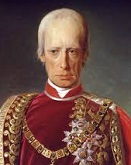

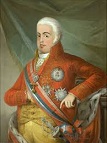


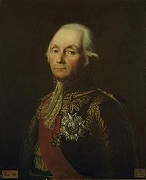









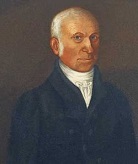



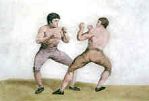





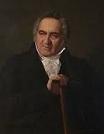

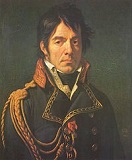
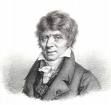










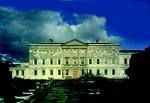

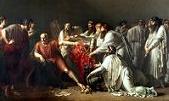
1792 On Jan. 15 after they don't fare any better than before the Am. Rev., 1,193 freed blacks leave Halifax, N.S., Canada for Sierra Leone; the Book of Negroes of escaped Am. slaves that fought for the British in the Am. Rev. War and were resettled in Novia Scotia contains the names of 1,336 men, 914 women, and 750 children; meanwhile the U.S. Congress excludes blacks from military service, allowing only "free able-bodied white male citizens". In Jan. Requiem Aeternam, the last composition of the late Wolfgang Amadeus Mozart (1756-91) (whose portrait bears a striking resemblance to English actor Tim Roth (1961-)?), completed by his pupil Franz Xaver Sussmayr (Süssmayr) (1766-1803) debuts, attended by respectful colleague Antonio Salieri (1750-1825) to benefit his ne'er-do-well family - what to do if your squeeze is way better looking than you are? On Feb. 7 Frederick William II of Prussia and HRE Leopold II sign an alliance against the French repub. govt. in favor of Louis XVI; too bad, Leopold dies within 1 mo., and Frederick William II is more interested in stealing Poland than helping bolster monarchism in France, so he does a half-job, which ultimately boomerangs at the 1806 Battle of Jena? On Feb. 10 Portuguese queen (since Feb. 24, 1777) Maria I (b. 1734) is declared insane by 17 physicians, and her son Joao VI "the Clement" (1767-1826) begins to rule in her name, being officially declared regent in 1799 until her death on Mar. 20, 1816 - nothing takes care of you like state farm? On Feb. 20 Pres. Washington signs an act creating the U.S. Post Office - in the good old days before automatic weapons? On Feb. 23 Sir Joshua Reynolds (b. 1723) dies, and U.S. immigrant Benjamin West becomes pres. #2 of the Royal Academy of Arts in London; George III makes Sir Thomas Lawrence (1769-1830) (knighted in 1815) his royal portraitist, joining Thomas Gainsborough and Sir Joshua Reynolds as the big three in English portrait painting. On Mar. 1 Leopold II (b. 1747) dies, and his son Francis II (1768-1835) becomes the last Holy Roman emperor (HRE) (until 1806), becoming known for his diplomatic and admin. abilities. On Mar. 8 a large Chinese army reaches Lhasa to help Tibet fight landlocked Nepal (home of Mt. Everest), and the combined army invades Nepal; after a flood of the Betrawoti River washes away many of the Chinese troops, on Oct. 5 the Treaty of Betrawoti ends the war; Nepal signs a commercial treaty with Britain. On Mar. 9 British Christian evangelical abolitionist naval officer Lt. John Clarkson (1764-1828) arrives in Sierra Leone with 1.2K unwelcome freed Am. black slaves from the Am. Rev. War from Nova Scotia in 15 ships led by Thomas Peters (Potter) (1738-92), who found the utopian settlement of Freetown, with Clarkson as gov. #1 (until Dec. 1792); Big Peter gets into a political struggle with Clarkson then dies of malaria in Freetown during the rainy season, leaving descendants who become the Krio (Creole) people of Sierra Leone; too bad, these whitened-up Africans end up creating a race-based class society that keeps the indigenous African pop. down, causing resentment and hostility? On Mar. 16 Gustavus (Gustav) (Gustaf) III of Sweden is shot at a masquerade party at the Stockholm Opera House by Jacob Johan Anckarstrom (Anckarström) (b. 1762), one of his nobles (former member of his regiment) (executed Apr. 27), with the soundbyte "Bonjour, beau masque" (Good day, fine mask), and dies on Mar. 29 from infection, his last words being "I feel sleepy, a few moments rest will do me good"; famous medium Ulrica Anna Arfvidsson (1734-1801), who predicted his assassination in 1786 is questioned by the police; his 14-y.-o. son Gustavus (Gustav) (Gustaf) IV Adolf (1778-1837) succeeds him (until 1809). On Mar. 16 Denmark becomes the first country to abolish the slave trade (takes effect in 1803). Welcome to the next round? A classic case of what goes around comes around? The pen is mightiless against the sword? On Mar. 20-25 the Legislative Assembly in Paris sticks its neck out and approves the use of the centuries-old "painless" Guillotine, named after physician (Freemason) Joseph-Ignace Guillotin (1738-1814), who recommends it as a humane form of execution, as well as a way of eliminating the class distinction of hanging commoners while beheading nobles, who are expected to go to their deaths without displaying emotions unless they're women; on Apr. 4 the first guillotine is installed in the Place de Greve in Paris; on Apr. 25 highwayman Jacques Nicolas Pelletier becomes the first person executed by the new "feminine" form of execution; in Aug. a giant guillotine is erected in the Place de Carrousel in the center of Paris, whose blade makes a noise like thunder when it falls, designed by German harpsichord maker Tobias Schmidt, who was working with Metz-born king's surgeon Antoine Louis (1723-92) (secy. of the surgical academy), and main executioner (since 1754) Charles Henri Sanson (1739-1806) (4th hereditary executioner in the family since 1688); Schmidt turns the blade o a 45-deg. angle and changes it from round to you know what, and it is weighted by a pulley system as it travels down two 14-ft. upright greased wooden planks, all of which are reached by a 24-step platform; in 1890 asst. executioner Leon Burger adds refinements; the machine is set up also at the Place de la Revolution, Place St. Antoine, and Barriere (Barrière) Ranverse; it is originally called "La Veuve" (window), and after Louis XVI's execution "La Louison", then after Marie Antoinett'e execution "La Louisette", and not called guillotine until after 1800; 15K heads roll by 1799, out of 40K total killed during the Terror, 70%-80% of them commoners; tricoteuses sometimes sit near the base of the scaffold knitting stockings for soldiers - well, shiver me carotids? On Apr. 2 the first U.S. Mint in Philly is established by the U.S. Mint (Coinage) Act, which specifies coinage of silver and gold in the ratio of 15:1; dir. #1 is Penn.-born self-taught scientist David Rittenhouse (1732-96) (until 1795). On Apr. 5 the first U.S. pres. veto is cast as Pres. Washington rejects a congressional measure for apportioning reps among the states. On Apr. 18 the Nat. Guard orders Louis XVI, Marie Antoinette and their family to not leave Paris; Maximilien Robespierre is appointed public accuser. On Apr. 20 after getting pissed-off by the 1791 Declaration of Pillnitz and issuing ultimatums against HRE Leopold II and Francis II, France declares war on the HRE (Austria), which lasts 23 years (until 1815) and results in 1.5M French KIA; the First Coalition against France is formed. On Apr. 25 French army officer (capt. of engineers at Strasbourg) Claude Joseph Rouget de Lisle (1760-1836) composes the French nat. anthem (adopted in 1795) La Marseillaise (Song of Marseille) (originally "War Song of the Army of the Rhine") (Chant de guerre pour l'Armée du Rhin) (dedicated to Bavarian-born French marshal Nicolas Luckner), which is sung at a patriotic meeting in Marseille by Francois Mireur (1770-98) and catches on, being sung in the streets of Paris upon arrival by volunteers from Marseille then spreading to the rest of the French army; it is adopted as the French nat. anthem on July 14, 1795; after they occupy the town of Carmagnola in Piedmont, Italy, French revolutionaries begin wearing their costume, the Carmagnole, a short jacket with wide lapels, worn with black trousers instead of knee breeches, earning them the name "sans-culottes", meaning without breeches, along with a red cap and tricolored girdle; "La Marseillaise" is first sung on July 30 in Paris. On May 5 the first U.S. Militia Acts of 1792 is passed by Congress, providing for the U.S. pres. to take command of state militas in times of insurrection or imminent invasion; it is first used to suppress the 1794 Whiskey Rebellion; the 2nd act is passed on May 8. On May 11 New England ship capt. Robert Gray (1755-1806) enters the estuary of the Columbia River (which he names after his ship) in NW Am., which event is later cited by the U.S. when claiming the region. Back it up, hook it up, and don't look back? Don't just stand there, say something? Breathtaking? On May 17 after a meeting by 24 traders under a buttonwood tree at 68 Wall Street in New York City, the Buttonwood Agreement creates the New York Stock and Exchange Board, the precursor of the New York Stock Exchange (1817); in 1863 it shortens the name to New York Stock Exchange (NYSE). In May the U.S. tax rates on whiskey are lowered to no avail, and the Whiskey Rebellion ferments to nearly 200 proof? In May Alexander Mackenzie leaves with nine companions and 1.5 tons of supplies in a 25-ft. birch bark canoe to find a westerly route to the Pacific Ocean from Peace River near Lake Athabasca in Alberta, Canada; they reach the Continental Divide on June 12 after deciding to take the Parsnip River south rather than the Finlay River north at Willaston Lake. In May an aide-de-camp to Col. Marquis de Toulengeon deserts, and his daddy the Marquis de Sade, who was elected to the Nat. Convention in 1790 representing the far left, where he wrote a pamphlet calling for the direct vote is forced to disavow him to save his neck; next year he writes a eulogy of Jean-Paul Marat to save his job, but is accused of moderatism, forced to resign, and imprisoned, after which he is released after the July 28, 1794 execution of Maximilian Robespierre, and becomes a penniless bum, selling his ruined castle in Lacoste in 1796, which in the 1990s is purchased by French fashion designer Pierre Cardin for theater festivals. On June 1 "Bluegrass State" Kentucky (Ky.) ("Land of Tomorrow") ("Meadow Lands") ("Cane and Turkey Lands") is separated from Va. and admitted as the 15th U.S. state (slave), becoming the 4th commonwealth in the Union (Va., Penn., Mass.), with Isaac Shelby (1750-1826) (ancestor of historian Shelby Foote) as gov. #1 (until 1796); not too fond of U.S. whiskey taxes, the state slogan is "Spirits Unbridled" - the future of bourbon is secure? In July France declares war on Sardinia. In July Comte de Rochambeau, cmdr. of the French Rev. Northern Army freaks at the excesses and retires in disgust, and ends up imprisoned during the Reign of Terror, escaping the guillotine by the fall of Robespierre in 1794, being released and restored by Napoleon to his rank and estates. Beyond the Yellow Brick Road? On Aug. 10 popular demonstrations lead to the storming of the Tuileries Palace, the royal residence on the right bank of the Seine River in Paris, and the royal Swiss Guard (created 1616) shows their loyalty by defending it, losing 800 KIA; all functions of the monarchy are suspended, and not only is the king's veto power quashed, but the Nat. Legislature votes to enact all legislation he previously vetoed, and calls for a convention elected by universal male suffrage to enact a new constitution; the poor royal family is confined to tower of the the gloomy Square du Temple (old Knights Templar house) in Paris; La Carmagnole, a song written after the storming of the Tuileries, consisting of 13 2-line stanzas ridiculing the king and queen becomes popular until the end of the Terror in 1794; "Dansons la carmagnole,/ Vive le son, vive le son;/ Dansons la carmagnole,/ Vive le son du canon". On Aug. 11 as the allies score big Vs against the French revolutionaries, the 9 (later 12) man Jacobin Provisional Executive Council (Committee of Public Safety) under Danton, Robespierre, Saint-Just, et al., and the male suffrage-based Paris Commune under Jacques Rene Hebert (René Hébert) (1757-94) (founder of the ultra-radical newspaper "La Pere Duchesne"), Pierre Gaspard Chaumette (1763-94) and Jean Baptiste du Val-de-Grace, Baron de Cloots (1755-94) (AKA Anacharsis Cloots) seize power. On Aug. 20 the Battle of Verdun is a V for the Prussians over French Rev. forces, after which the 12 Virgins of Verdun carry a basket of sugared almonds to the Prussian king's tent (they are later guillotined); on Sept. 2-7 news of it causes the September Massacres to take place in Paris, in which 1.2K-1.4K suspects taken from prisons are tried in improvised tribunals and then executed; the riots spread to Versailles, Lyons, Rheims, Meaux, and Orleans, and anarchy threatens, while cries for the king's head increase. On Sept. 9-16 free trade on grain is suspended in France, with army and civil authorities empowered to requisition it; amnesty is granted to people arrested for agitation over grain. On Sept. 20 a French Repub. army under Lt. Gen. Francois Christophe Kellermann (1735-1820) (gen. of the army of Alsace since 1791) finally defeats the Prussians under the Duke of Brunswick, the Prince of Hohenlohe, and the Count of Clerfayt at the Battle of Valmy in N France, giving them their first V, which Goethe claims "opened a new era in the history of the world", making Kellermann a star, with Napoleon uttering the soundbyte: "I think I'm the boldest general that ever lived, but I daren't take post on that ridge with windmill at Valmy"; too bad, after being transferred to the army of the Moselle River, Kellermann is accused of Gen. Adam Custine of incompetence, but is acquitted at the Nat. Convention in Paris and given the army of the Alps and Italy, until he is ordered to stop a revolt in Lyons, and is accused again and imprisoned for 13 mo. before being acquitted and assigned to the SE border until his army is merged with Napoleon's in Italy, with big fan Napoleon getting him named senator in 1800, pres. of the senate in 1801, marshal of France on May 19, 1804, and created duke of Valmy in 1808; in 1814 he votes to depose Napoleon, and becomes a liberal member of the Chamber of Peers until Louis XVIII. Louis Philippe Joseph, Duc de Chartres (Valois) (1773-1850) (later Duc de Orleans), who joined the Jacobins in 1790 fights at Valmy as a lt. gen., and later at Jemappes. On Sept. 20 the French Nat. Legislature orders the state to take over the recording of marriages, births and deaths from the Church, and legalizes divorce. On Sept. 21 the French Nat. Convention convenes (until Aug. 22, 1795), elected by universal male suffrage and composed of 749 members (486 new), with the Plain Party in the majority, the Girondists on the right, and the Mountain Party (Danton, Robespierre et al.) on the left; it immediately votes to abolish the monarchy (making the king and queen ordinary citizens) and suspend the legislative assembly; the hated gabelle (salt tax) (begun 1341) is abolished (until 1804); nobles kiss their titles goodbye, and become "ci-devant" (heretofore) nobles. On Sept. 22 the First French Repub. is declared, with the calendar reset to Year 1 (ends 1804); on Sept. 25 the repub. is declared "one and indivisible". On Oct. 2 the Committee of Gen. Security is formed in France, with undefined police powers - Halloween 1-999 music here? On Oct. 12 the U.S. celebrates its first Columbus Day to commemorate the 300th anniv. of the big landing; on Oct. 13 the cornerstone of the President's House, the U.S. executive mansion is laid during a ceremony in the District of Columbia (finished in 1800); Irish-born Am. architect James Hoban (1762-1831) models it after Leinster House, home of the duke of Leinster in Ireland (later seat of the Irish parliament); African-Am. slaves are used in the construction, along with Scottish immigrants; too bad, the British torch it in 1814, causing it to need whitewashing and end up with the name you know what. On Nov. 2-Dec. 5 the 1792 U.S. pres. election sees George Washington and John Adams are reelected unanimously; too bad, the unanimous stuff ends as Thomas Jefferson founds the Democratic-Republican Party (later the Democratic Party) as a congressional caucus to fight against the Federalist Party, formed in 1789 by Alexander Hamilton, launching the First Party System (ends 1824), with the Federalists becoming dominant until 1800; on Feb. 12, 1798 Thomas Jefferson writes the soundbyte: "Two political Sects have arisen within the U. S. the one believing that the executive is the branch of our government which the most needs support; the other that like the analogous branch in the English Government, it is already too strong for the republican parts of the Constitution; and therefore in equivocal cases they incline to the legislative powers: the former of these are called federalists, sometimes aristocrats or monocrats, and sometimes Tories, after the corresponding sect in the English Government of exactly the same definition: the latter are stiled republicans, Whigs, jacobins, anarchists, dis-organizers, etc. these terms are in familiar use with most persons." On Nov. 6 45K French under Gen. Charles Francois du Perier (Périer) Dumouriez (1739-1823) defeat 13K Austrians in their winter HQ in the Battle of Jemappes in SW Belgium, causing them to retreat, after which the French capture Brussels. On Nov. 19 the Decree of Fraternity offers French aid to people wishing to overthrow their govts., causing the English govt. to get antsy, while Irish nationalists take them up on their offer. On Dec. 4 the French Nat. Convention declares the death penalty for advocating monarchy; on Dec. 8 it repeals its suspension on free trade in grain but outlaws exports; in the Beauce region prices are fixed, causing peasant demonstrations. On Dec. 10 Louis XVI goes before the Nat. Convention to face neckable charges of treason, and on Dec. 11 is presented with incriminating letters from his iron cupboard, claiming to have never seen them and denying his own signature, causing the Jacobins to decide he's guilty; on Dec. 27 the Girondists (moderate republicans) propose a referendum of the people to decide - the original American Idol? On Dec. 11 British Capt. Arthur Phillip, first gov. of New South Wales, Australia (since 1788) resigns and leaves for England in the ship Atlantic, bringing plant and animal specimens, leaving a colony of pop. 4,221 pop., of which 3,099 are convicts. On Dec. 16 the Nat. Convention makes threatening the unity and integrity of the republic punishable by death - what are ya gonna do about it, cut off my head? In Dec. Francisco de Goya (1746-1828) visits S Spain and contracts a serious disease that leaves him temporarily blind, permanently deaf, and partially paralyzed (caused by lead, mercury and cadmium poisoning from his paints?), after which he suddenly does an artistic left turn toward ferocious social satire and horrific, pornographic visions from Hell, raising him from mediocrity and ensuring his artistic immortality; liking to paint at night, he devises a big hat with candles - the original Mad Hatter? On Dec. 31 the city of Raleigh, N.C. (modern-day pop. 468K/2.2M), named for Sir Walter Raleigh is incorporated as the capital of N.C., replacing New Bern; a planned city, its location is chosen because it's only 11 mi. from Isaac Hunter's Tavern, a favorite of state legislators; the city plan is based on the 1682 Thomas Holme plan for Philly; on Jan. 21, 1797 it is granted a city charter. In Dec. after touring France and Switzerland by foot the previous year, nature-lover William Wordsworth (b. 1770) hooks up with Marie Ann "Annette" Vallon of Orleans; she bears him a daughter. Ineffectual Spanish king Charles IV virtually surrenders his govt. to his chief minister Manuel de Godoy (1767-1851) (until 1808). After French officers train a navy, the forces of Nguyen Anh destroy the Tay Son fleet at Qui Nhon, then begin sieging the fortress (until 1799). Marquis de Lafayette is given command of the French Rev. Army of the Center, becomes disgusted by the excesses of the French Rev. and bolts for Belgium, where he is captured by the Austrians and imprisoned for five years. The (which number?) Sixth Russo-Turkish War (begun in 1787) ends with the Treaty of Jassy, confirming Russia's annexation of the Crimea; the success against their masters gives the Serbs ideas. The Third Anglo-Mysore War (begun 1789) ends with the Treaty of Srirangapatnam, with Mysore ceding half its territory. The new French govt. seizes Hospitaller property in France; the Sorbonne in Paris is suppressed and its property confiscated (until 1808); the Hope Diamond, owned by Louis XVI vanishes during the turmoil in Paris, and doesn't resurface for almost 40 years - who had to die? PM Pitt the Younger recalls old Gen. Amherst to his post of CIC of the British army (until 1795). The first U.S. legislation establishing consular posts is enacted. Pierre Samuel du Pont de Nemours is imprisoned for his royalist views, and narrowly escapes the guillotine. The British Parliament passes the Libel Act - the original stick it where it hurts well patch, making it easy to be a touchhole and win in court? French military surgeon Dominique Jean Larrey (1766-1842) joins the Army of the Rhine, inventing Flying Ambulances after seeing French Flying Artillery, and combining them with the first MASH units complete with triage; after becoming a favorite of Napoleon and becoming a baron in 1809, he leads the surgical team that performs a mastectomy on English writer Frances "Fanny" Burney in Paris on Sept. 30, 1811; in 1810 he becomes one of the first surgeons to operate on the pericardial sac. French navigator Antoine Raymond Joseph de Bruni d'Entrecasteaux (1739-)93 of France begins a rescue expedition for La Perouse (disappeared 1788), visiting many Pacific islands and exploring New Caledonia (until 1793); he discovers the D'Entrecasteaux Islands SE of New Guinea, incl. Ferguson, Goodenough and Normanby, inhabited by Papuans. London literati throw a dinner party honoring both Am. hero Thomas Paine and celebrated French transsexual/hermaphrodite/cross-dresser Chevalier D'Eon, who volunteers to lead a brigade against outside enemies of rev. France, but he/she is too in debt to be allowed to leave England, and is forced to auction off a huge 6K-vol. library of feminist lit. (largest private collection) through Christie's - could she have become the next Joan of Arc, and prevented the rise of Napoleon? After La Trappe Abbey is confiscated by the French govt., the Trappistines (Order of Cistercian Nuns of the Strict Observance) (originally the Oder of Reformed Cistercians of Our Lady of La Trappe) (founded in 1664) reform in La Sainte Volonte de Dieu (Val-Sainte) near Fribourg, Switzerland, getting even more strict; in 1794 Pope Pius VI raises it to the status of an abbey and motherhouse of the Trappists, with Dom Augustin (Louis-Henri) de Lestrange (1754-1827) as abbot #1; too bad, in 1798 the French invade Switzerland and exile the monks, who roam several countries until they are able to reestablish themselves back in La Trappe. The Baptist Missionary Society is founded in London. Federalist Alexander Hamilton almost gets into a duel with Anti-Federalist James Monroe (1758-1831), but Aaron Burr intervenes and stops it? Gouverneur Morris, who has been in Paris since 1789 and kept a Diary of the French Rev., 1789-93 becomes U.S. minister to France (until 1794). The world's first chemical society is founded in Philadelphia, Penn. Cadwalader, Wickersham & Taft LLP is founded in New York City, becoming the oldest continuously-operated U.S. law firm to survive to modern times (until ?). 22-y.-o. Ludwig van Beethoven (b. 1770) becomes Haydn's pupil in Vienna as the latter finishes his 100th symphony. Devon, England-born religious prophetess Joanna Southcott (Southcote) (1750-1814) announces that she is the Woman Clothed With the Sun in Rev. 12:1-6, and begins charging 12s to 1 guinea to seal followers as one of the 144K elect - the first Jehovah's Witness? The Petticoat Duel sees Lady Almeria Braddock take on Mrs. Elphistone after the latter questions her age, using pistols followed with swords, after which Elphistone writes a letter of apology. N.H. waives taxes on brewing property to stimulate construction. Architecture: The Old State House in Dover, Del. on the E side of Dover Green (begun 1787) is completed in May, becoming the 2nd oldest state house in the U.S to survive to modern times. Sports: In May English 5'7 160 lb. Jew Daniel Mendoza (1764-1836), the first scientific boxer, who defeated his mentor "gentleman boxer" Richard Humphreys in three bouts in 1790-1 (the 3rd bout being the 1st time that spectators are charged to see a sporting event) and became the first boxer to win the patronage of the prince of Wales and the first Jew to speak to George III becomes world heavyweight boxing champ (until 1795) after Ben Brain retires and he defeats Bill Warr in 23 rounds; too bad, on Apr. 15, 1795 he takes on "Gentleman" John Jackson (1769-1845) for the championship in Essex, and Jackson wins after holding Mendoza's long hair with one hand while bitch-slapping him with the other for 10 min., causing boxers to begin wearing their hair short; Jackson sets up a saloon at 13 Bond St. where he gives instruction to Lord Byron et al. Inventions: Claude Chappe (1763-1805) of France invents the mechanical semaphore, the first practical telecomm system? - the guillotine turned into a signalling device? William Murdock (1754-1839) demonstrates coal gas lighting in England on July 29, causing candlemakers to quake in their boots. Science: French mathematician Baron Gaspard Clair Francois Marie Riche de Prony (1755-1839) begins calculating log and trig tables to 14-29 decimal place accuracy - why didn't he invent the computer first? Nonfiction: Joel Barlow (1854-1912), Advice to the Privileged Orders; banned by the British govt., but it gets him made a citizen of France. J.B. Cloots, La Republique Universelle. Morgan Edwards (1722-95), Materials Towards a History of the Baptists in New Jersey. Johann Gottlieb Fichte (1762-1814), Versuch einter Kritic aller Offenbarung. Gustav von Hugo (1764-1844), Lehrbuch Eines Civilistischen Cursus (7 vols.) (1792-1821); separates the Roman from the German elements of the law, founding the German Historical School of Jurisprudence, which regards law as springing from the Volksgeist (popular consciousness), and which splits into the Romanists (von Hugo, Friedrich Carl von Savigny) and the Germanists (Karl Friedrich Eichhorn, Jakob Grimm, Georg Beseler, Otto von Gierke). Mary Wollstonecraft Shelley (1759-97), A Vindication of the Rights of Woman (Jan.); the first feminist treatise, arguing for a woman's right to education et al.; "It is time to effect a revolution in female manners... and make them, as a part of the human species" - she had to spoil it all by giving birth to Frankenstein's mother? Thomas Paine (1737-1809), The Rights of Man, Pt. 2. Thomas Taylor (1758-1835), A Vindication of the Rights of Brutes; satire in response to Thomas Paine's "Rights of Man" and Mary Wollstonecraft's "A Vindication of the Rights of Woman". Robert Bailey Thomas (1766-1846), The (Old) Farmer's Almanac (fall); first (1793) ed.; by the late 1860s circ. zooms from 3K to 200K. Arthur Young, Travels in France. Music: Domenico Cimarosa (1749-1801), Il Matrimonio Segreto (comic opera) (Venice). Vicente Martin y Soler (1754-1806), Didon Abandonee (ballet). Claude Joseph Rouget de Lisle (1760-1836), La Marseillaise; original title "Chant de guerre por l'Armée du Rhin" (War Song of the Rhine Army); composed in Strasbourg after France's declaration of war against Austria; becomes the nat. anthem of France. Art: Jean Duplessi-Bertaux, The Taking of the Tuileries. Antonio Canova (1757-1822), Self-Portrait; Pope Clement XIII (sculpture). Leon-Maxine Faivre, Corpse of the Princess de Lamballe. Anne-Louis Girodet (1767-1824), Hippocrates Refusing the Gifts of Artaxerxes; the incorruptible Greek philosopher tells the rich Persian king to stuff his bling; very PC in Paris at this time - seriously, what's up with the money suit? Plays: Joseph-Marie Blaise Chenier, Caius Gracchus. Thomas Holcroft (1745-1809), The Road to Ruin (comedy); his biggest hit; a revival runs for 118 nights in 1873. Poetry: Andre Marie Chenier (1762-94), Hymne sur les Suisses. Leandro Fernandez de Moratin (1760-1820), The New Comedy (La Neva Comedia); attack the extravagant plots of other playwrights. Rhyijnvis Feith (1753-1824), The Grave Novels: Thomas Holcroft (1745-1809), Anna St. Ives; first British Jacobin novel. Hannah More (1745-1833), Village Politics, by Will Chip; disses Tom Paine and the godless French Rev.; a big hit, causing her to begin producing 30-40 Cheap Repository Tracts along with her sisters for the next three years, teaching reverence for religion, the British constitution and the gentry, and hatred for the French, with 2M copies circulated in 1 year, the most famous being The Shepherd of Salisbury Plain; the farmers get pissed-off at her for trying to teach their laborers to read? Ann Radcliffe (1764-1823), The Romance of the Forest. Marquis de Sade (1740-1814), Justine; or, The Misfortunes of Virtue; pub. anon.; Therese tells her story to Madame de Lorsagne before being executed. Christoph Martin Wieland (1733-1813), Geheime Geschichte des Philosophen Peregrinus Proteus. Births: Am. hymnodist Lowell Mason (d. 1872) on Jan. 8 in Medfield, Mass. U.S. Second Lady #7 (1825-31) Floride Bonneau Calhoun (nee Colhoun) (d. 1866) on Feb. 15 in Charleston, S.C.; first cousin once removed (father's first cousin) of hubby John C. Calhoun (1782-1850). German (Prussian-Estonian) biologist (founder of Embryology) Karl Ernst von Baer (d. 1876) (AKA Karl Maksimovich Ber) on Feb. 28 (Feb. 17 Old Style) in Piep, Estonia; educated at the Imperial U. of Dorpat. Am. Mormon leader and hymnodist William Wines Phelps (d. 1872) on Feb. 17 in Hanover Township, N.J. Mexican pres. #14 (1844-5, 1848-51) Gen. Jose Joaquin (José Joaquín) Antonio de Herrera (d. 1854) on Feb. 23 in Xalapa, Veracruz; gorws up in Perote. Italian "The Barber of Seville", "William Tell", "La Cenerentola" composer ("the Italian Mozart") Gioacchino Antonio Rossini (d. 1868) on Feb. 29 in Pesaro; covers himself with blankets when composing. English astronomer-chemist-physicist Sir John Frederick William Herschel (1738-1822), 1st Baronet (d. 1871) on Mar. 7 in Slough, Buckinghamshire (Berkshire); son of Sir William Herschel (1738-1822); educated at Eton College, and St. John's College, Cambridge U.; coiner of the term "photography", and inventor of blueprints. U.S. Rep. (R-Penn.) (1859-68) (Radical Repub. leader) ("Father of Reconstruction") Thaddeus Stevens (d. 1868) on Apr. 4 in Danville, Vt.; common law husband of Lydia Hamilton Smith (1815-84). English Whig statesman and Canadian gov.-gen. #1 (1838-47) John George "Radical Jack" Lambton, 1st Earl of Durham (d. 1840) on Apr. 12 in London. Salvadoran rebel leader Anastasio Martir Aquino (d. 1833) on Apr. 15 in Santiago Nonualco. English Anglican clergyman and poet founder of the Oxford Movement (1833-45) John Keble (d. 1866) on Apr. 25 in Fairford, Gloucestershire; educated at Corpus Christi College, Oxford U. Am. brewer-philanthropist (founder of Vassar College) Matthew Vassar (d. 1868) on Apr. 29 in East Dereham, Norfolk, England; emigrates to the U.S. in 1796 Italian pope (1846-78) (longest-reigning) Pius IX (Giovanni Maria Mastai-Ferretti) (d. 1878) on May 13 in Senigallia. English celeb Anne Isabella "Annabella" Noel Byron, 11th Baroness Wentworth and Baroness Byron (nee Milbanke) (d. 1860) on May 17 in Elmore Hall, County Durham; wife (1815-16) of George Gordon, Lord Byron (1788-1824); mother of Augusta Ada King, countess of Lovelace (1815-52). French physicist (discoverer of the Coriolis Effect in 1835) Gustave Gaspard de Coriolis (d. 1843) on May 21 in Paris; first to coin the term "work" for force times distance, along with the equation 1/2 * m * v^2 for kinetic energy (1829). German theologian Ferdinand Christian Baur (d. 1860) on June 21 in Schmiden (near Cannstadd); educated at the U. of Tubingen. Scots-Irish "Stories from Waterloo", "O'Hara" novelist William Hamilton Maxwell (d. 1850) on June 30 in Newry, County Down, Ireland; educated at Trinity College, Dublin. U.S. Dem. vice-pres. #11 (1845-9) George Mifflin Dallas (d. 1864) on July 10 in Philadelphia, Penn.; son of Alexander James Dallas (1759-1817); educated at the College of N.J. (Princeton U.). English "Mr. Midshipman Easy" novelist Capt. Frederick Marryat (d. 1848) on July 10 in Westminster, London. Scottish Presbyterian minister Edward Irving (d. 1834) on Aug. 4 in Annan, Dumfriesshire; forerunner of the Pentecostal and Charismatic movements. English "Ozymandias", "To a Skylark" ("Hail to thee, blithe spirit") poet Percy Bysshe Shelley (d. 1822) on Aug. 4 in Field Place (near Horsham), Sussex, England; husband (1811-6) of Harriet Westbrook (1795-1816), and (1816-22) Mary Wollstonecraft Godwin (1797-1851). English Whig-Liberal "Reform Act of 1832" PM (1846-52, 1865-66) John "Languid Johnny" Russell, 1st Earl Russell of Kingston Russell (d. 1878) on Aug. 18 in London; a son of the 6th duke of Bedford who does not inherit his vast estates; educated at Westminster School, and Edinburgh U.; grandfather of philosopher Bertrand Russell (1872-1970). Irish clergyman-archeologist Edward Hincks (d. 1866) on Aug. 19 in Cork; educated at Trinity College, Dublin. Am. Presbyterian abolitionist anti-Mason revivalist ("America's foremost revivalist") Charles Grandison Finney (d. 1875) on Aug. 29 in Warren, Conn. Am politician-atty. Frederick Augustus Tallmadge (d. 1869) on Aug. 29 in Litchfield, Conn.; educated at Yale U. German "Conversations with Goethe" poet-writer Johann Peter Eckermann (d. 1854) on Sept. 21 in Winsen, Hanover; educated at the U. of Gottingen; buddy of Johann Wolfgang von Goethe from 1822, becoming his lit. asst. and posth. editor of writings. Am. businessman William Backhouse Astor Sr. (d. 1875) on Sept. 19 in New York City; 2nd son of John Jacob Astor (1763-1848) and Sarah Todd Astor; husband (1818-) of Margaret Rebecca Armstrong (1800-72); father of John Jacob Astor III (1822-90) and William Backhouse Astor Jr. (1829-92); educated at Gottingen U., and Heidelberg U.; becomes richest man in the U.S. in 1848. English "Oliver Twist" illustrator-caricaturist George Cruikshank (d. 1878) on Sept. 27 in London; son of caricaturist Isaac Cruikshank (1756-1811); brother of caricaturist Isaac Robert Cruikshank (1789-1865). Kashmiri prince (maharaja) #1 (1846-57) Gulab Singh (d. 1857) on Oct. 18. British field marshal Sir Colin Campbell, 1st Baron Clyde (d. 1863) on Oct. 20 in Glasgow; son of carpenter Colin Macliver; nephew of Col. John Campbell, whom the Duke of York mistakes for him, causing him to assume the name; created baron in 1858. French sculptor Jean-Baptiste Roman (d. 1835) on Oct. 31 in Paris. Am. mayor #1 of San Antonio, Tex. (1837-8, 1840-1, 1842-4) (redhead) John William (William John) Smith (d. 1845) on Nov. 4 in Va.; grows up in Ralls County, Mo. Am. Mormon leader William Marks (d. 1872) on Nov. 15 in Rutland, Vt. Czech playwright Vaclav Kliment Klicpera (d. 1859) on Nov. 23 in Chlumec nad Cidlinou, Bohemia. Am. abolitionist-suffragist Sarah Moore Grimke (Grimké) (d. 1873) on Nov. 26 in Charleston, S.C.; daughter of a plantation owner; sister of Angelina Grimke (1805-79). French eclectic philosopher Victor Cousin (d. 1867) on Nov. 28 in Paris. U.S. postmaster-gen. #10 (1841) Francis Granger (d. 1868) on Dec. 1 in Suffield, Conn.; son of Gideon Granger (1767-1822); educated at Yale U. Russian mathematician (co-founder of Non-Euclidean Geometry) Nikolai Ivanovich Lobachevsky (Lobachevski) (d. 1856) on Dec. 1 (Nov. 20 Old Style) in Nizhnii Novgorod (Gorki); Polish parents; educated at the U. of Kazan. Spanish Bolivian pres. #7 (1829-39) and Peruvian pres. #7 (1827, 1836-8) Marshal Andres de Santa Cruz y Calahumana (d. 1865) on Dec. 5 in Huarina (near La Paz), Bolivia. Dutch king #2 and grand duke of Luxembourg (1840-9) William II (d. 1849) on Dec. 6 in The Hague; son of William I (1772-1843) and Wilhelmine of Prussia (1774-1837). Austrian "Silent Night" lyricist-composer and priest Josef Mohr (d. 1848) on Dec. 11 in Salzburg. Greek rev. leader Alexander Ypsilanti (Ypsilantis) (d. 1828) on Dec. 12 in Istanbul; son of Constantine Ypsilanti (-1816); brother of Demetrios Ypsilanti (1793-1832). Am. politician-statesman-businessman Abbott Lawrence (d. 1855) on Dec. 16 in Groton, Mass.; founds the city of Lawrence, Mass. English clergyman-writer-historian Samuel Roffey Maitland (d. 1866) in London. English "Christmas Carols Ancient and Modern" atty.-antiquarian William Sandys (d. 1874). Deaths: Arab Muslim leader Muhammad ibn Abd al-Wahhab (b. 1703). German theologian Bishop August Gottlieb Spangenberg (b. 1704) on Sept. 18 in Berthelsdorf. British Adm. Sir George Pocock (b. 1706) on Apr. 3; buried in Westminster Abbey. French adm. Comte d'Orvilliers (b. 1708). French dramatist Charles Simon Favart (b. 1710). British statesman John Stuart, 3rd Earl of Bute (b. 1713). French novelist Marie-Jeanne Riccoboni (b. 1714) on Dec. 7 in Paris; dies in poverty. British lord of the admiralty John Montagu, 4th Earl of Sandwich (b. 1718) on Apr. 30 - rolled up in a sliced loaf of whole wheat and rye bagels, what a pita? British Adm. George Rodney (b. 1718) on May 24 in Hanover Square, London. Scottish architect John Adam (b. 1721) on June 25 British dramatist-gen. John Burgoyne (b. 1722). English painter Sir Joshua Reynolds (b. 1723) on Feb. 23. English civil engineer John Smeaton (b. 1724) on Oct. 28 in Austhorpe, Leeds. Am. statesman George Mason (b. 1725) on Oct. 7 in Guston Hall, Va. Scottish architect Robert Adam (b. 1728) on Mar. 3 in London. German piano maker Johann Andreas Stein (b. 1728) on Feb. 29 in Augsburg. French economist Nicolas Baudeau (b. 1730) in Paris. English type designer Joseph Jackson (b. 1733). British U.S.-losing PM (1770-82) Frederick North, 2nd earl of Guilford (b. 1732) on Aug. 5 in Grosvenor Square, London. English explorer Samuel Hearne (b. 1745) in Nov. in London. Am. naval hero John Paul Jones (b. 1747) on July 18 in Paris; buried in St. Louis Cemetery, Paris; his remains are moved to the U.S. in 1905 and buried in 1913 in the U.S. Naval Academy. Austrian HRE (1790-2) Leopold II (b. 1747) on Mar. 1 in Vienna. French princess Marie Theresa Louise of Savoy, princess of Lamballe (b. 1749) on Sept. 3 in Paris (killed by a mob). German writer Jakob Michael Reinhold Lenz (b. 1751) on June 4 in Moscow, Russia; found dead in the street. Persian Shiite Usuli scholar Vahid Bihbahani (b. ?); defined the Usuli Shiite School of Law, which defeated the Akhbari School and established the authority of mujtahids for Shiites into modern times.



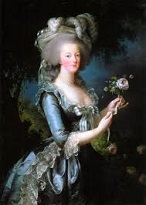











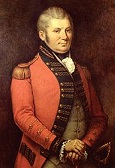


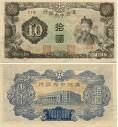
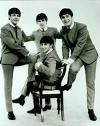



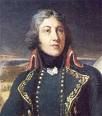
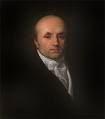









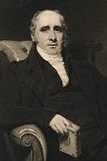





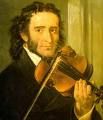


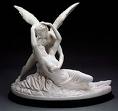


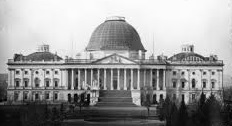
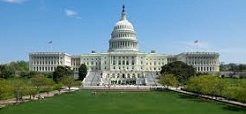
1793 The first wave of state-sponsored German immigrants from the Bohemian Forest arrives in the U.S. (ends 1817). There is an influenza epidemic in Vt., Va., and Penn.; America's first local health dept. with a permanent board of health is formed in Baltimore, Md., followed by New York City, formed to stave off a a yellow fever epidemic in Philadelphia in Aug.-Nov. that kills 5K of 50K and nearly destroys the city after 20K flee by Sept., causing Philly surgeon Philip Syng Physick (1768-1837) to step up, coming up with new surgical methods and tools, becoming known as the "Father of Am. Surgery"; too bad, yellow fever reaches New York City, killing hundreds and causing more to flee. On Jan. 9 Jean Pierre Blanchard makes the first balloon flight in North Am. (his 45th), from the prison yard of Wall Street Penitentiary in Philadelphia, Penn. in front of a crowd that incl. Pres. George Washington, Vice-pres. John Adams, Thomas Jefferson, James Madison, and James Monroe, crossing the Delaware River and making a safe landing after 45 min. in Deptford, N.J.. On Jan. 14 the French Nat. Convention decides against a referendum and finds Louis XVI guilty of treason, then on Jan. 20 sentences him to death by a margin of one, with the leading Girondists voting against the death penalty, pissing off the Jacobins; on Jan. 21 (Mon.) (10:30 a.m.) French king (May 10, 1774 - Sept. 4, 1791) Louis XVI (b. 1754) is guillotined; an unknown man allegedly leaps onto the scaffold, dips his hand in the king's blood, flings it over the crowd,and cries "Jacques de Molay, thou art avenged", referring to the Mar. 18, 1314 Templar Curse on French kings pronounced by Knights Templar grandmaster Jacques de Molay (1244-1314); Thomas "Tom" Paine (1737-1809), now a deputy to the Nat. Convention from Pas-de-Calais, who votes with the Girondists is imprisoned in 1794 for 11 mo. for opposing the execution; he went to France after giving up on getting citizens of Philly to fund an iron bridge over the Schuykill River; the king is dragged from the Temple on a tumbril with his feet tied to face his execution, while reciting the Third Psalm ("exaltus caput meum"); his wife Marie Antoinette, and children, dauphin Louis Charles (Louis XVII) (1785-95) and Marie-Therese Charlotte (1778-1851) are imprisoned in the Tower in Paris, and 5 mo. later the dauphin is separated from his mommy, kept in the dark like a wild beast, and mistreated while she is forced to listen; 1 mo. after that she is taken to the Conciergerie (part of the Palais de Justice) on Ile de la Cite on the Seine River (home of previous prisoners Georges Dandon, Camille Desmoulins, Chretien Malesherbes, Madame Roland, and Maximilien Robespierre) and put in a small squalid cell, which after her death is changed into a chapel - no more cakey? On Feb. 1 repub. rev. France declares war on Britain, Holland, and Spain, causing them to form an alliance against it; France annexes Belgium, causing the emigres to proclaim Louis XVI's imprisoned son as king Louis XVII (d. 1795), the 6th and last Bourbon king (nominal ruler only); France and Britain keep at it for the next 22 years, presenting the U.S. with a problem, since the Treaty of 1778 makes it the perpetual ally of France, obligated to defend its possessions in the West Indies, while it wants no part of this war. On Feb. 3 sections of Paris demonstrate against price increases, followed by more consumer protests on Feb. 24-27, and off on and in Mar.-Apr. On Feb. 12 the Second U.S. Congress passes the U.S. Fugitive Slave Act, permitting slave owners to send their agents across state lines to recapture escaped slaves ("fugitives from justice") - poor Liza? On Feb. 18 the U.S. Supreme Court rules 4-1 in Chisholm v. Georgia that federal courts have power to hear disputes between private citizens and states, becoming the first significant case they decide, and leading to the 11th Amendment of 1795. On Feb. 25 the dept. heads of the U.S. govt. meet with Pres. Washington at his home in the first cabinet meeting on record. On Mar. 1 the French prohibit trade with Britain, causing foreign trade to slump. On Mar. 2 after Pres. Washington calls for changes in his annual address to Congress in Nov. at the urging of U.S. atty. gen. Edmund Randolph, the U.S. Judiciary Act of 1793 is passed by the 2nd U.S. Congress (2nd session), authorizing circuit courts to function with only one U.S. Supreme Court justice, modifying regs on who can take bail payments, making rules for writs of ne exeat and injunction, authorizing inter-district subpoenas and limiting witnesses in civil cases to traveling 100 mi., authorizing courts to make their own rules et al. On Mar. 4 U.S. pres. #1 George Washington is inaugurated for his 2nd term in the 2nd U.S. Pres. Inauguration in Philly, with John Adams continuing as the 1st vice-pres.; Washington's Second Inaugural Speech is only 30-sec. long (135 words) due to his bad teeth, becoming the shortest (until ?). On Mar. 4 after Pres. Washington nominates him on Feb. 27 for the seat vacated by Thomas Johnson Jr., County Antrim, withdraws it on Feb. 28 to satisfy the Ineligibility Clause of the U.S. Constitution (Art. 1, Sect. 6), and renominates him after his term as U.S. Sen. expires, Ireland-born William Paterson (1745-1806) of N.J. becomes U.S. Supreme Court justice #8 (until Sept. 9, 1806), going on to preside over trials of people indicted for treason in the Whiskey Rebellion. On Mar. 18 the Austrians under Prince Frederick of Saxe-Coburg defeat 40K French under Gen. Charles Francois Dumouriez at the Second Battle of Neerwinden (first in 1693) in Belgium, after which Dumouriez is accused of treason and defects to the Allies on Apr. 4, along with Gen. Louis Philippe (later Louise-Philippe I), ending up in exile in Switzerland; Louis' father Louis Philippe Joseph, duc d'Orleans (b. 1474) is executed by the Rev. Tribunal, causing the new duc d'Orleans to become the central figure for the monarchist Orleanist party, staying out of France until 1814, traveling in Scandinavia, the U.S. (four years in Philly), England and Sicily. On Mar. 19 the French Nat. Convention passes a law of public assistance providing work for the able-bodied, and home relief for other needy persons; on June 28 they pass another one giving aid to children, aged, unmarried mothers (1st time in French history), and free state hospitals for abandoned children until age 12, after which they are to be apprenticed out. On Mar. 29 freedom of the press in France is restricted. The Rape of France, starring itself? In Mar. the War in La Vendee (Vendée) sees the Vendee region of W France stage a royalist revolt (ends 1796), capturing several towns, followed by defeats on Aug. 14 at the Battle of Lucon, on Oct. 17 at the Battle of Cholet, and on Dec. 12-13 at the Battle of Le Mans; federalist moderates in Lyons (Lyon) overthrow the municipal govt., then execute Jacobin ex-mayor Chalier on July 17, causing Kellerman to siege it on Aug. 9-Oct. 9, and sentence the current (since 1790) mayor Barthelemy Regis Dervieu du Villars (1750-1837) to five death sentences; Committee of Public Safety member Georges Auguste Couthon (1755-94) is sent to punish the rebels at Lyons, but refuses to follow orders to destroy it, letting Villars go free, causing them to send Jean Marie Collot d'Herbois (1749-96) and Fouche, who do it with zeal, crushing them by next year; French Rev. Gen. Armand Louis de Gontaut Lauzun, Duc de Biron (b. 1747), who fought on the winning side in the Am. Rev. War, and has impeccable credentials to lead the French Rev. forces (since his great-uncle Charles de Gontaut tried to overthrow the king in 1602) is sacked and guillotined on Dec. 31 after being accused of being too lenient toward the counterrevolutionists; other atrocities are perpetrated by Tallien at Bordeaux and Lebon in Arras, with the blue ribbon going to priest-hating Jean Baptiste Carrier (1756-94) (of Cantal) in Nantes, whose tribunal orders 16K shot or drowned in a single month, the drownings done by the boatload in the Loire River using a trapdoor in the boat, causing the word "noyade" (mass drowning) to be coined (the model for modern common carriers?); meanwhile Robespierre the Younger spares the E and S, and Lakanal spares the SW. On Apr. 1 Mount Asama in Japan erupts, killing 53K. On Apr. 7 Toulouse lawyer Bertrand Barere (Barère) de Vieuzac (1755-1841) is appointed to the Committee of Public Safety, joining the Jacobin Club and becoming known as a mediator between the Mountain et al., once calling Robespierre "a pygmy who should not be set on a pedestal"; too bad, after siding with the winning side on Louis XVI's execution, and beginning to preach the "religion of the fatherland" (substituting the state for the church), he is imprisoned in 1795 for being part of the Reign of Terror, then escapes after two years, becoming a secret agent for Napoleon until the restoration of the Bourbons, who get him exiled for life as a regicide. The Citizen Genet Affair, starring Charles Boyer? On Apr. 8 "Citizen" Edmond Charles Edouard Genet (1763-1834), the first minister to the U.S. from the new French Repub. (appointed 1792) (son of an old friend of John Adams) arrives in Charleston, S.C. to the acclaim of enthusiastic crowds sympathetic to the French Rev.; after organizing a Jacobin Club, he journeys triumphantly to Philly, meeting with Pres. Washington on May 18; too bad, his raising of troops for military operations against Spanish possession in Am., and his arming and commissioning of privateers to attack British ships in U.S. waters finally gets him in trouble with U.S. notions of sovereignty, and when he threatens to trump Washington by appealing over his head to the American peuple, Big W in Aug. demands his recall; meanwhile the Girondist govt. falls to the radical Jacobins, who send their own minister, Citizen Jean Antoine Joseph Fauchet (1761-1834) with a warrant for Genet's arrest, who presents his credentials next Feb. 22, causing Genet to seek asylum and Washington to refuse his extradition; no problemo, he settles on Long Island, N.Y., marries the daughter of N.Y. Gov. George Clinton, and spends his remaining 40 years as a farmer in Dutchess County in the Hudson River Valley, giving apple cuttings to Thomas Jefferson (1743-1826), who passes them to Va. nurseryman M. Caleb Ralls, who creates the late-blooming Ralls Genet (Rawls Jennet) Apple (AKA Neverfail, Rock Rimmon, Rockremain), which becomes a favorite in the Ohio River Valley. On Apr. 14-July 23 the Prussians siege and recover Mainz from the French, who had set up the Repub. of Mainz in Mar.; French Gen. Alexandre Francois Marie de Beauharnais, Vicomte de Beauharnais (1760-94) is blamed for the D, and arrested next Mar. 2. On Apr. 22 Pres. George Washington signs the U.S. Neutrality Proclamation, announcing America's official neutrality in the Franco-British war, without even using the word "neutrality"; the U.S., it declares, is "friendly and impartial toward the belligerent powers", and any American citizens "aiding or abetting hostilities" are threatened with prosecution; at the same time Washington accepts Jefferson's advice and recognizes the new French govt. (the first country to do so). In Apr. the first 9-member Committee of Public Safety, a permanent cabinet of the French Rev. is decreed by the Nat. Convention; Robespierre is elected on July 27 - we have miles and miles of unused neck in Paris? In Apr.-July 10 the overly-cautious Austrians under Gen. Francois of Saxony-Coburg-Saalfeld take Conde (their first V in France), followed on July 28 by Valenciennes in NE France near the Belgian border, allowing the French to regroup from their spring disasters. On May 4 a grain price ceiling is established in frightened France. On May 18 shah (since 1773) Timur Shah Durrani (b. 1748) dies, and his 5th son Zaman Shah Durrani (1770-1844) becomes shah of Afghanistan (until 1800) with the help of the chief of the Barakzay tribe. On June 13-July 28 the army of Prince Josias of Saxe-Coburg-Saalfeld, commanded by George III's 2nd son Frederick, Duke of York and Albany (1763-1827) sieges successfully Valenciennes, France. On June 24 the Constitution of 1793 (Montagnard Constitution), which incl. universal male suffrage is passed by the French Nat. Convention, and is sent to the primary assemblies for ratification but never put into effect. In June the Jacobins get Jacques Pierre Brissot and 30 other prominent Girondists arrested; on Oct. 31 he and 20 of them are guillotined. On July 9 the legislature of Upper Canada passes the Act Against Slavery, banning the importation of slaves and mandating that children born to female slaves will be freed upon reaching the age of 25; meanwhile on July 29 after visiting it in May and choosing it over London and Kingston, the name of Ft. Rouille (Rouillé) (modern-day Toronto) by the Don River in Ontario (founded 1750) is changed to Ft. York by British lt. gov. of Upper Canada #1 (1791-6) Gen. John Graves Simcoe (1752-1806), who makes it the capital of Upper Canada in 1796. Have a very corday? On July 13 (Bastille Day minus one?) "L'Ami du Peuple" ed. Jean-Paul Marat (b. 1743) is stabbed to death (in the back) in his bath by convent-educated Girondist sympathizer Marie-Anne Charlotte Corday d'Armont (b. 1768) as he tries to soak the hideous boils covering his gross bod; at her execution on July 17, Corday utters the immortal soundbyte: "I killed one man to save one hundred thousand" - is this like Prince's Purple Rain, or the female stars of School for Scandals? Insert William Wallace Erin Go Bragh Joke Here? On July 22 Alexander Mackenzie (1764-1820) of Scotland becomes the first white Euro to cross the North Am. continent from coast to coast and find a pass through the Rocky Mts. as he and nine companions paddle in two canoes provided by friendly Indians into Dean Channel N of Vancouver Island (they had left in May, 1792); he leaves a memorial on a rock using vermilion pigment mixed with grease, which survives to modern times; he then returns, reaching Ft. Chipewyan on Aug. 24 (33 days) with no fatalities. On July 28 English novelist Frances "Fanny" Burney (1752-1840) marries French royalist refugee Gen. Alexandre d'Arblay (-1818). In July dept. admins. in France are authorized to purchase grain forcibly; on Aug. 9 the death penalty is enacted for grain hoarders; on Aug. 19 public granaries are established, and depts. authorized to set prices for coal and firewood. In July Robert Gray arrives in Boston after his second round-the-world trip in the Columbia. On Aug. 14 French engineer Lazare Carnot (1753-1823) is elected to the Committee of Public Safety, going on to become a war minister and invent the idea of levee en masse, the recruitment of untrained soldiers who are placed under experienced soldiers; he starts out favoring a fortress-based defensive strategy, but later switches to an offensive strategy, splitting the army into smaller units that quickly move around the enemy and flank it. On Aug. 23 the "levee en mass" mobilizes the entire male pop. capable of bearing arms in France, and 14 armies are hastily organized and put in the field; Caen, Bordeaux and Marseille are conquered. On Aug. 28 after the Prussians force him to evacuate Frankfurt, recross the Rhine River and fall back to Landau, and he is saved from treason charges by Robespierre and sent back, then idles while the Austrians take Conde, French Gen. Adam Philippe, Comte de Custine (b. 1740) is guillotined for negligence, and his son is guillotined for trying to defend him. On Aug. 29 British-Spanish forces under British rear Adm. Samuel Hood, assisted by Capt. Horatio Nelson (1758-1805) occupy the key port of Toulon in S France, and the rev. French are driven back on virtually every front, causing revolts in the interior inspired by the Girondists, while the Committee of Public Safety attempts to counter them; the royalists turn Toulon to the British, and the rev. French lose their Mediterranean fleet; while visiting Naples to convoy British troops to Toulon, frisky Horatio Nelson meets Lady Emma Hamilton, wife of the British ambassador there, and hooks up with her, her advice and help aiding his career - be one with the dance, that's how I roll? On Aug. 29-Dec. 19 the Siege of Toulon is the first V for young 5'6" (5'2" in pieds de roi, the old French measurement system) Corsican artillery capt. Napoleon Bonaparte (1769-1821), (connected to the Jacobins and Robespierre), (who suffers from neurodermatitis, i.e., chronic nervous itching, hence the hand tucking) who reclaims the French fleet lost to the English and rises to the rank of brig. gen. In Aug. French physician Philippe Pinel (1745-1826) was appointed physician in charge of Bicetre Hospital in S Paris, ordering chains removed from mental patients, and founding the Moral Treatment (Mgt.) Theory of Psychiatry. That's why they call me bad company? On Sept. 5 the Jacobins seize on the Marat incident to begin the Reign of Terror (La Terreur) (ends July 28, 1794), un by the 12-man Committee of Public Safety, whose leader is up-and-coming basket case Robespierre and his able left wingnut Saint-Just, resulting in 16,594 executions across France by the Nat. Razor (guillotine) (incl. 2,639 in Paris), plus another 25K summary executions across France. On Sept. 6-8 the Battle of Hondschoote in Nord, France is a French V for Gen. Jean Nicolas Houchard and Gen. Jean-Baptiste Jourdan against Anglo-Hanoverian troops under Marshal Heinrich Wilhelm von Freytag (1720-98). On Sept. 29 price lids are established in France for wages and commodities, effective next Feb. 26. In the fall Gen. "Mad Anthony" Wayne, picked by Washington, leads an expedition into the Northwest Territory with 2.6K men, and builds Ft. Greenville 100 mi. SW of Lake Erie in Ohio, named for Am. Rev. hero Nathaniel Greene. I've been waiting all my life for somebody to throw me a surprise party, or, Stop this game, it's ruining me?, or, Decollate me in a decollete dress please? On Oct. 14 royal French cake head ("the most hated woman in France") Marie Antoinette (b. 1755) is put on trial in a kangaroo court for treason for passing documents to her brother HRE Leopold II, which fails to produce evidence that she is guilty of treason (although later letters are found detailing French troop dispositions), and her son Louis XVII is forced into a false confession that his mommy "whore" had incest with him, and she is framed on all the political porno that had been circulating for years showing her having sex with everybody and everything except Jesus, then on Oct. 15 found guilty at 4 a.m. and guillotined at noon, acting with dignity and not whimpering, although she accidentally steps on the executioner's foot and asks his pardon; her last words are "Farewell, my children, I go to rejoin your father"; she is then buried in an unmarked grave - her head falls into a big cake box? On Oct. 30 all political societies and women's clubs in France are closed. On Oct. 31 Girondists begin to be executed at the rate of 60 per mo., incl. Paris mayor Jean-Sylvain Bailly (b. 1736) and French Rev. supporter Duke Louis Philippe II Joseph of Orleans (AKA Philippe Egalite) (b. 1747), while others prefer hari kari; on Nov. 8 on the way to the slicer, Madame Marie-Jeanne Roland de la Platiere (b. 1754) utters the immortal soundbyte: "Liberty, Liberty, what crimes are committed in thy name!" On Nov. 6 Britain informs the U.S. govt. that they intend to occupy their northwest Am. posts indefinitely, and decrees that their ships will intercept neutral vessels hauling produce to or from the French West Indies; the British fleet then captures 250 U.S. merchant ships, impounding over half of them as war prizes; it also boards U.S. vessels at sea and drags away sailors who they claim are British deserters; war looms as the U.S. public is polarized, torn between Republicans sympathetic to liberty, reason, and France, and Federalists wanting order, faith, and Britain; Boston, home of the Am. Rev. goes Federalist because of its profits from the British trade; Southern planters join New England protests gainst British seizures of their ships, and go Federalist when they see Jacobin radicals dispossessing French aristocrats; meanwhile, Jefferson leads the died-in-the-wool Francophiles. On Nov. 8 the Louvre in Paris (the new French nat. art gallery) opens to the head-wearing public. On Nov. 24 the secularist French Rev. (Repub.) Calendar, passed by the Convention on Oct. 5 is forced, er, introduced to a confused, er, grateful public (until 1805), backdated to Sept. 22, 1792, the first day of the French Repub. (first day of Year 1); there are 12 mo. of 30 days, divided into three 10-day decades, with the last day of each decade set aside as a day of rest kills it right there?); Sept. 17-21 (Gregorian) are designated as nat. holidays to celebrate Virtue, Genius, Labgor, Opinion, and Rewards; the months, named by poet Philippe Francois Nazaire Fabre d'Eglantine (1750-94) are Germinal ("budding"), Floreal ("flowers"), Prairial ("meadows"), Messidor ("reaping"), Thermidor ("heat"), Fructidor ("fruit), Vendemiaire ("vintage"), Brumaire ("fog"), Frimaire ("frost"), Nivose ("snowy"), Pluviose ("rainy"), Ventose ("windy") - was that Luchidor or Nacho Libre? On Dec. 19 the Bouquier Law establishes mandatory free public primary schooling in France, teaching reading, writing, arithmetic, and rev. civics. On Dec. 31 Jefferson resigns as secy. of state and withdraws to Monticello. In Dec. Georges Couthon becomes pres. of the French Nat. Convention, and forms a triumvirate with Robespierre and Saint-Just which carries on the Terror against the Dantonists and the Hebertists, who become so radical that they become known as "les enrages" (the madmen), causing the Nat. Convention to have Hebert arrested, only to have the loud people cause his release. In Dec. after Gen. Louis Lazare Hoche (1768-97) is placed in command of the French Rev. Army of the Rhine, the Allies begin retreating across the Rhine River as rev. troops pursue them shouting French epithets - bomb bomb bomb, bomb bomb Iran? On Nov. 10 the French assembly establishes the atheistic Cult of Reason and bans Roman Catholicism, causing the Holy Roman Empire to declare war on France. The Flanders (Low Countries) Campaign is launched by the First Coalition (ends 1795), trying to invade France but getting stopped at the French border and being forced to withdraw. Japanese shogun Iyenari (b. 1773) assumes personal rule, sinking into lush living while military discipline begins to break down. Saarbrucken is ceded from the counts of Nassau-Saarbrucken to France (until 1815). The Ottoman sultan responds to Serb entreaties by removing the hated Janissaries from Serbia and allowing taxes to be collected by local Serbian knights (knezes), and granting more freedom of religion (until 1799). After work by Arthur Young in demonstrating new farm mgt. methods in Norfolk (who becomes its first secy.), Britain establishes a Board of Agriculture, which evolves into the Ministry of Agriculture, Fisheries and Food, surveying the country and diffusing knowledge of modern methods - to inspect heads of cabbage for human eyes? Catherine II the Great's envoy, Finnish-Swedish military officer Lt. Adam Kirillovich Laxman (1776-1806) arrives in Hakodate, Japan. but fails to establish friendly relations - did his insurance company give him the runaround? Siam and Burma end their long conflict; Siam and Annam split a large part of Cambodian territory. In 1793 King George III of Britain sends the Macartney Embassy (Mission) to China, led by first-ever British envoy Paul, er, George Macartney, 1st Earl Macartney (1737-1806) of Ireland on a 64-gun man-of-war to negotiate a more open trading system and a permanent British embassy, but he is treated with such disdain by Emperor (1736-96) Qin Qian Long (Ch'ien Lung) (1711-99) that it hardens the British to them; imagine, making him kowtow (Chin. "head knock"), and then handing him a worthless rock (jade) as a gift?; on Oct. 7 he leaves after French Jesuit missionary in Peking (since 1750) Jean Joseph Marie Amiot (1718-93) sends him two letters, one of which contains the soundbyte: "This world is the reverse of our own", after which he dies on Oct. 9 - as hard as a Beetle? Don't you know we're more popular than Christ? The Second Partition of Poland (first in 1772) ends the existence of Poland as an independent state, with Russia grabbing the E provinces from Livonia to Moldavia, and Prussia grabbing Great Poland, Kujavia, Torun, and Danzig (Gdansk), reducing Poland by two-thirds; Austria is ignored in the land grab. Upper Canada abolishes slavery. France introduces compulsory public education from age six; meanwhile the hos of Paris wear red, white, and blue bonnets and offer a special price to top members of the Nat. Assembly? The French begin to stir up Indian natives against the British, who had gained more and more control of India from the west since 1784. Capt. George Vancouver's expedition reaches Hawaii and becomes embroiled in islander politics; he brings several head of longhorn cattle as a gift to Kamehameha the Great as a change from the local goat and boar, and the king likes them so much that he orders death to anyone who harms them, causing wild cattle to run rampant trampling and terrorizing within a few years; the king lifts the decree after 10 years, causing a Wild West-style cattle roundup? The city of Abu Dhabi (Arab. "father of the gazelle/deer") (modern-day pop. 1.5M) is founded by Bani Yas bedouins from the Liwa Owasis; the Al Nahyan family goes on to become the rulers of the Emirate of Abu Dhabi; the city goes on to become the 2nd most populous city of the United Arab Emirates (UAE) after Dubai. The Kermadec Islands NE of New Zealand are discovered. Bourbon Island is renamed Reunion (Réunion) to commemorate the union of the Paris Nat. Guard with revolutionaries from Marseille. The fortified swamp-surrounded town of Ekaterinodar (modern-day Krasnodar) (named after Catherine II the Great) in N Caucasia, Russia on the right bank of the Kuban River at its confluence with the Karasun River 960 mi. S of Moscow and 160 mii. S of Rostov on the Don is founded by Dnieper Cossacks. Norfolk County in Mass. splits off from Suffolk County. The U.S. Mint begins issuing the large clunky Large Cent (until 1857) - would you bend down to pick one up? The South Place Religious Society in London, England is founded to promote Thomas Paine-style Freethought, becoming the oldest Freethought org. to survive to modern times; in 1864-85 Falmouth, Va.-born Unitarian minister Moncure Daniel Conway (Gael. "holy river") (1832-1907) becomes the leader; in 1888 it becomes the South Place Ethical Society under U.S.-born leader Stanton George Coit; in 1969 it becomes the South Place Humanist Society; in Nov. 2012 it becomes the Conway Hall Ethical Society. Genoa, Italy-born violinist Nicolo Paganini (1782-1840) makes his debut as a violin virtuoso in Genoa at age 11. Trinity College in Dublin begins admitting Roman Catholic students, incl. Robert Emmet, Thomas Moore et al. The U. of Douai is confiscated by the French revolutionaries. Williams College in Williamstown, W. Mass. in the foothills of the Berkshire Mts. at the foot of Mt. Greylock is founded by a bequest by Mass. colonist Ephraim Williams Jr. (1715-55) (who was KIA at the Battle of Lake George and is mentioned in "Yankee Doodle" with the line "Brother Ephraim sold his cow"), becoming the traditional rival of Amherst College (founded 1821) and Wesleyan U. (founded 1831), "the Little Three"; its mascot is a Purple Cow; sports teams are nicknamed the Ephs (rhymes with chiefs). Philly on the Delaware River becomes the top producer of beer among U.S. seaports. Inventions: Abraham Louis Breguet (1747-1823) of France invents La Pendule Sympathique to wind and synchronize watches. "Founder of the Am. Industrial Rev." Samuel Slater (1768-1835) builds a cotton yarn mill in Pawtucket, R.I. using Arkwright machinery, becoming the first true factory in the U.S. While visiting from New Haven, Conn., Am. nailmaker Eli Whitney (1765-1825) invents the little ole Cotton Gin (which combs out them pesky seeds) at Nathaniel Greene's Mulberry Cove Plantation near Savannah, Ga., applies for a patent on June 20, and is granted one on Mar. 14, 1794, but it is so easily pirated that he never gets paid much; 800K+ black slaves are imported to the cotton-producing regions in the U.S. South between this year and 1860, and cotton becomes the South's leading crop, with Savannah the chief cotton port. Architecture: On Sept. 18 the U.S. Capitol Bldg., designed by amateur architect William Thornton (1759-1828) and modified by Irish-born architect James Hoban (1755-1831) and French-born architect Stephen (Étienne Sulpice) Hallet (1755-1825) is begun, with Pres. Washington, accompanied by eight other Freemasons in Masonic regalia laying the cornerstone while wearing a Masonic apron embroidered for him by French nuns, saying that Freemasonry is "the cement that binds us together"; the N (Senate) wing is completed and the first session is held on Nov. 17, 1800, shared by the House until their wing is completed in 1811 - don't believe everything you read on the Internet? Science: After it is discovered in 1790 by physician Adair Crawford (1748-95) and surgeon-chemist William Cruickshank (-1811) in the village of Strontian, Scotland, Scottish physician-chemist Thomas Charles Hope (1766-1844) names the highly reactive alkaline earth metallic element Strontium (Sr) (#38), calling it Strontites, after which on June 30, 1808 Sir Humphry Davy isolates it from strontium chloride and renames it. Thomas Young describes visual astigmatism. Nonfiction: William Blake (1757-1827), Prophetic Books (1793-1804); a series of books describing a new system of Christianity revealed to him in visions), starting with Visions of the Daughters of Albion; America: A Prophecy; Urizen is the force of reason, Los is the force of imagination, and Orc is the spirit of rebellion, and the Am. Rev. is the uprising of the spirit of Orc? - shouldn't that be Porc? Fanny Burney (1752-1840), Brief Reflections Relative to the Emigrant French Clergy; calls for financial support for the French rev. cause in the name of tolerance and compassion. Mathew Carey (1760-1839), A Short Account of the Malignant Fever, Lately Prevalent in Philadelphia. J.B. "Anacharsis" Cloots, Base Contitutionelle de la Republique du Genre Humain. Marie-Jean Condorcet (1743-94), Equisse d'Un Tableau Historique des Progres de l'Esprit Humain. John Dalton (1766-1844), Meteorological Observations and Essays (first work) (2nd ed. 1834); based on his habit of M.O., which goes on from 1787-1844, later used to propose the Dalton Minimum of low sunspot counts in 1796-1820 (1790-1830?). William Godwin (1756-1836), Enquiry Concerning the Principles of Political Justice, and Its Influence on General Virtue and Happiness; anarchist treatise which becomes a bestseller (4K copies), claiming the perfectibility of humanity, helping to found the English Romantic movement; political justice is defined as "the adoption of any principle of morality and truth into the practice of a community"; "Speaking of property, he stated that the rights of every one 'to every substance capable of contributing to the benefit of a human being' must be regulated by justice alone: the substance must go 'to him who most wants it'. His conclusion was communism." (Peter Kropotkin) Rev. Samuel Hopkins (1721-1803), System of Doctrines Contained in Divine Revelation, Explained and Defended; how sin is bad but serves God's purpose of promoting greater ultimate good? Immanuel Kant (1724-1804), Religion Within the Limits of Mere Reason (Religion innerhalb der Grenzen der blossen Vernunft). John Moore (1729-1802), Journal During a Residence in France; Scottish physician accompanies Lord Lauderdale to Paris and witnesses the French Rev.; becomes a hit with Thomas Carlyle et al. Hey now, you're an all-star, get your game on? Thomas Paine (1737-1809), The Age of Reason; Being an Investigation of True and Fabulous Theology (1794, 1795, 1807); bestseller in the U.S. written just before being thrown into prison in France, pub. with the help of his friend Joel Barlow; a rabble-rousing Rationalist Deist attacks the divine origin of the Bible, becoming the Infidel's Bible, setting the 19th cent. up for secularism and belief in scientific progress as a replacement religion for Christianity, with pithy soundbytes incl.: "Belief in a cruel God makes a cruel man"; "One good schoolmaster is of more use than a hundred priests"; "I do not believe in the creed professed... by any church that I know of. My own mind is my own church"; "The story of the whale swallowing Jonah... borders greatly on the marvelous, but it would have approached nearer to the idea of a miracle if Jonah had swallowed the whale"; "It is wrong to say that God made rich and poor; he made only male and female, and gave them the whole earth for their inheritance"; he gets widely accused of being an atheist, when actually he attacks atheism in the book and supports Deism, but the bigoted religious reaction (which incl. most of his old Am. friends, incl. Washington) causes his place in the pantheon of Am. Founding Fathers to get tainted, and later the infidels strike back by attempting to paint all the U.S. Founding Fathers (incl. Bible-thumping Washington) as Deists and overdo separation of church and state? - was Paine their "rabbit", writing what they all believed but couldn't openly express, or was he just out on a limb, too extreme but holding onto the Founding Father main trunk for support? Nicolas-Edme Restif (1734-1806), Anti-Justine; reply to his bitter enemy the Marquis de Sade's "Justine". John Woolman (1720-72), A Word of Remembrance and Caution to the Rich (posth.). Music: Francois-Adrien Boieldieu (1775-1834), La Fille Coupable (comic opera) (Rouen). Vicente Martin y Soler (1754-1806), Amour et Psyche (ballet); based on the play "Psyche" by Moliere et al. Daniel Steibelt (1765-1823), Romeo et Juliette (opera) (Theatre Feydeau). Art: Jose de Alcibar (of Mexico), Portrait of Sor M. Maria Ana Josefa de San Ignacio; a Frida Kahlo self-portrait before its time? Antonio Canova (1757-1822), Cupid and Psyche (sculpture); his masterpiece? Jacques-Louis David (1748-1825), The Death (Murder) of Marat. Plays: Marie-Joseph Blaise de Chenier (1764-1811), Fenelon. George Colman the Younger (1762-1836), The Battle of Hexham. Poetry: Carl Bellmann (1740-95), Fredmans Sanger (Sänger). William Blake (1757-1827), Visions of the Daughters of Albion; Oothon, the "soft soul of America, who lusts for chaste Theotormon (Gr. "theos" + "tormentum" = God + torment) (based on John Stedman?) until she is raped by Bromonion (Gr. "roarer"), causing no man to want her, after which the Daughters of Albon look to America for an end to all forms of discrimination incl. racial and sexual. Rhyijnvis Feith (1753-1824), Inez de Castro. Vincenzo Monti (1754-1828), La Basvilliana; contra the French Rev. William Wordsworth (1770-1850), An Evening Walk; Descriptive Sketches in Verse. Novels: Aagje Deken (1741-1804) and Betje Wolff (1738-1804), Cornelie Wildschut (1793-6). Jean Paul (1763-1825), The Invisible Lodge (Die Unsichtbare Loge); Life of the Cheerful Schoolmaster Maria Wuz. Marquis de Sade (1740-1814), La Philosophie dans le Boudoir. Heinrich Daniel Zschokke (1771-1848), Aballino (Abällino), der Grosse Bandit; modeled on Schiller's "Die Rauber". Births: Am. Quaker abolitionist, pacifist and women's rights advocate Lucretia Coffin Mott (d. 1880) on Jan. 3 in Nantucket, Mass.; wife of James Mott (1788-1868), sheriff of Carleton County (1832-). Am. politician (atty. in the Amistad Case) Roger Sherman Baldwin (d. 1863) on Jan. 4 in New Haven, Conn.; educated at Yale U.; son of Simeon Baldwin (1761-1851); grandson of Roger Sherman (1721-93); father of Simeon Eben Baldwin (1840-1937); grandfather of Edward Baldwin Whitney (1857-1911); great-grandfather of Hassler Whitney (1907-89). German Nazarene painter Philipp Veit (d. 1877) on Feb. 13 in Berlin; son of Simon Veit and Dorothea Mendelssohn, daughter of Moses Mendelssohn; revives the last art of fresco painting. Austrian Biedermeir painter Ferdinand Georg Waldmuller (d. 1865) on Jan. 15 in Vienna. Am. Mormon Church co-founder Sidney Rigdon (d. 1876) on Feb. 19 in St. Clair, Alleghenty County, Penn.; starts out as a Campbellite-Baptist minister, then sees the light in 1830 and becomes #2 after Joseph Smith, only to be passed-over for his successor by Brigham Young, causing his followers to split. Am. soldier-politician (founder and pres. #1 of the Repub. of Texas, 1841-4), Tenn. gov. #7 (1827-9), and Tex. gov. #7 (1859-61) (only person to become gov. of two states, Tenn. and Tex.) Samuel "Sam" Houston (d. 1863) on Mar. 2 in Rockbridge County, Va. near Lexington; born in a log cabin; son of Maj. Sam and Elizabeth Paxton Houston (5th of 9 children); in 1806 his father dies, and his family moves to a 419-acre farm in Blount County, Tenn. (with a view of Chilhowee Mt); at age 15 he runs away to avoid working as a clerk in a trader's store, living with the Cherokees of E Tenn. for 3 years. English stage actor William Charles Macready (d. 1873) on Mar. 3 in London; educated at Rugby School. Am. geographer-geologist-ethnologist Henry Rowe Schoolcraft (d. 1864) on Mar. 28 in Guilderland (near Albany), N.Y.; educated at Union College, and Middlebury College. Argentine gen. ("Restorer of the Laws") Juan Manuel Jose Domingo Ortiz de Rosas (d. 1877) on Mar. 30 in Buenos Aires. French "Messiniennes" poet-playwright Jean Francois Casimir Delavigne (d. 1843) on Apr. 4 in Le Havre. Austrian emperor (1835-48) (epilepsy) Ferdinand I (d. 1875) on Apr. 10 in Vienna; eldest son of Francis II and Maria Theresa; husband of Maria Anna of Savoy, daughter of Victor Emmanuel I. Am. Dem. politician-diplomat William Cabell Rives (d. 1868) on May 4 in Amherst County, Va.; educated at the College of William and Mary. Am. judge (co-founder of Baylor U.) Robet Emmett Bledsoe Baylor (d. 1874) on May 5 in Ky. Scottish "Abide with Me" Anglican minister-hymnodist-poet Henry Francis Lyte (d. 1847) on June 1 in Ednam (near Kelso); educated at Trinity College, Dublin. German Bohemian ship propeller inventor Joseph Ludwig Franz (Josef Ludvik Frantisek) Ressel (d. 1857) on June 29 in Chudrim. German Biblical scholar Friedrich Bleek (d. 1859) on July 4 in Ahrensbok (ner Lubeck), Holstein; prof. of theology at the U. of Bonn in 1829-59. Irish poet-journalist William Maginn (d. 1842) on July 10 in Cork. Slovak scholar-poet Jan Kollar (Kollár) (d. 1852) on July 29 in Mosovce (Mossoc), Hungary; founder of Slovak as a lit. language. French Adm. Abel Aubert Dupetit Thouars (d. 1864) on Aug. 3 near Saumur; nephew of Aristide Aubert Du Petit Thouars (1760-98). French-Canadian fur trader (founder of Milwaukee, Wisc.) Solomon Laurent Juneau (Laurent-Solomon Juneau) (d. 1856) on Aug. 9 in Repentigny; cousin of Joseph Juneau (1836-99). Am. Protestant missionary (in Hawaii) William Richards (d. 1847) on Aug. 22 in Plainfield, Mass.; educated at Williams College, and Andover Seminary. English poet Mrs. Felicia Dorothea Browne Hemans (d. 1835) on Sept. 25 in Liverpool. Japanese painter Watanabe Kazan (Sadayasu) (d. 1841) on Oct. 20 in Edo; born to a poor samurai famiy. Am. riflemaker Eliphalet Remington Jr. (d. 1861) on Oct. 28 in Suffield, Conn.; father Eliphalet Remington Sr. (-1828) emigrated from Suffolk, England; father of Philo Remington (1816-89). Am. soldier-politician ("Father of Texas") Stephen Fuller Austin (d. 1836) on Nov. 3 in Wythe County, Va.; 2nd child of Moses Austin (1761-1821) and Mary Brown Austin (1768-1824); grows up in Potosi, Mo. Englsh "Christ Lamenting Over Jerusalem" painter Sir Charles Lock Eastlake (d. 1865) on Nov. 17 in Plymouth, Devon; knighted in 1850; not to be confused with English architect Charles Locke Eastlake (1836-1906). Am. Am. School economist (adviser to Pres. Abraham Lincoln) Henry Charles Carey (d. 1879) on Dec. 15 in Philadelphia, Penn.; son of Mathew Carey (17600-1839). Afghani emir (1836-) Dost Mohammad (Mohammed) Khan (d. 1863) on Dec. 23. Malagasy king #1 (1810-28) Radama I (the Great) (d. 1828) in Ambohimanga, Madagascar; son of Andrianampoinimerina. Greek rev. leader Demetrios Ypsilanti (d. 1832); brother of Alexander Ypsilanti (1792-1828). Canadian sheriff John Francis Wentworth Winslow (d. 1859) in New Brunswick; son of a loyalist; named after Nova Scotia gov. John Wentworth and his wife Frances. Am. Black Hawk War army maj. Isaiah Stillman (d. 1861) in Mass. Am. 6'6" Apache chief Mangas Coloradas (Colorado) ("Kan-da-zis Tishishen" = Red Shirt/Sleeves) (Dasoda-hae = "he just sits there") (d. 1863); father-in-law of Cochise, Victorio, and Kutu-hala (Kutbhalla). Swedish writer Karl Jonas Ludvig Almqvist (d. 1866) in Stockholm; educated at the U. of Uppsala. Greek Adm. Constantine Canaris (Kanaris) (d. 1877) on Psara Island. Deaths: Scottish-born British chief justice Lord Mansfield (b. 1705) on Mar. 20. Italian dramatist Carlo Goldoni (b. 1707) on Feb. 6; dies in poverty in Versailles after his royal pension is cancelled by the French Rev.: "He who talks much cannot always talk well." Italian painter Francesco Guardi (b. 1712) on Jan. 1 in Venice. Polish Jewish scholar rabbi Yechezkel ben Yehuda Landau (b. 1713) on Apr. 29; leaves Nodah bi-Yehuda (Heb. "Known in Judah"), a bunch of decisions on Jewish law, incl. the limiting of autopsy to cases which prevent a clear and present danger in other known people, causing him to become known by the name Nodah Biyehuda. German banker Johann Philipp Bethmann (b. 1715) on Nov. 27 in Frankfurt am Main. French Oriental scholar Jean Joseph Marie Amiot (b. 1718) on Oct. 9 in Peking. Swiss entomologist Charles Bonnet (b. 1720) on May 20. Scottish historian William Robertson (b. 1721) on June 11. Am. Rev. leader (DOI signer) Roger Sherman (b. 1721) on July 23. Am. indigo planter Eliza Lucas Pinckney (b. 1722) in S.C. French statesman Clement Charles Francois de Laverdy (b. 1723) (guillotined). English natural philosopher John Michell (b. 1724) on Apr. 29 in Thornhill, Yorkshire. Am. Rev. War loyalist jurist William Smith (b. 1728) on Nov. 3 in Quebec, Canada. Scottish-born British #1 surgeon John Hunter (b. 1728) on Oct. 16 in London. French publisher Pierre Francois Didot (b. 1732). French astronomer-politician Jean-Sylvain Bailly (b. 1736) on Nov. 12 in Paris (guillotined); "He met his death with patient dignity; having, indeed, disastrously shared the enthusiasms of his age, but taken no share in its crimes" (Encyclopedia Britannica). Am. statesman (DOI signer) John Hancock (b. 1737) on Oct. 8. English mathematician John Wilson (b. 1741) on Oct. 18. French Louis XV's mistress Comtess du Barry (b. 1743) on Dec. 8 in Place de la Concorde, Paris; beheaded after she returns to France from England like a dumb comtesse and is accused of aiding French emigres, acting like a whimp at the execution and uttering the famous last words: "Encore un moment, monsieur le bourreau, un petit moment" ("One moment more, mister executioner, one little moment"). Swiss-born French rev. leader Jean-Paul Marat (b. 1743) on July 13 in Paris (murdered by Charlotte Corday while bathing). French Gen. Armand Louis de Gontaut, duc de Biron (b. 1747) on Dec. 31 in Paris (guillotined); his Memoirs are pub. in 1822 (fake?). French duke Louis Philippe II Joseph (Philippe Egalite), duke of Orleans (b. 1747) on Nov. 6 in Paris (guillotined). Afghani shah (1773-93) Timur Shah Durrani (b. 1748) on May 18. French journalist Olympe de Gouges (b. 1748) on Nov. 3 in Paris (guillotined). French journalist Jacques Pierre Brissot (b. 1754) on Oct. 31 in Paris (guillotined with 20 Girondist colleagues). French king (1774-93) Louis XVI (b. 1754) on Jan. 27 in Paris (guillotined). French queen (1774-93) Marie Antoinette (b. 1755) on Oct. 16 in Paris (guillotined). English Mutiny on the Bounty leader Fletcher Christian (b. 1764) on Sept. 20 in Pitcairn Island. French assassin Charlotte Corday (b. 1768) on July 17 in Paris (guillotined).






















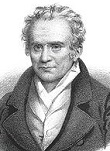


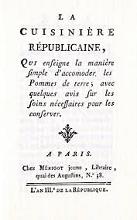




1794 On Jan. 3 James Madison (1751-1836), backed by Thomas Jefferson introduces seven congressional resolutions calling for commercial reprisals against Britain for its unfair dominance of transatlantic shipping and its banning of American boats from the British West Indies; it also calls for expanded trade relations with France; the Hamiltonians work to ridicule and defeat the resolutions; America fortifies its ports for a possible British invasion; at the suggestion of Oliver Ellsworth, Washington appoints John Jay, the first U.S. Supreme Court chief justice as a special envoy to England, and after Senate approval he sails for England on May 12 from New York as a thousand New Yorkers cheer from the docks; his position of chief justice is thrown up for grabs, and guess who's jockeying for it? On Jan. 13 Pres. Washington approves a measure of Congress to add two stars and two stripes to the U.S. flag in recognition of Vermont and Kentucky; by 1818 the additional stripes cause the flag to become unwieldy, and they go back to the original lucky 13. In Jan. Charles-Maurice de Talleyrand is informed that he has five days to leave England or face deportation, and he emigrates to Philadelphia in Apr., staying in the U.S. for two years. On Feb. 5 the French Nat. Convention decrees freedom for all slaves in French colonies; on Feb. 22 it passes a law providing free primary education to children ages 6-13; on Nov. 17 it declares that primary schooling is compulsory, requires teaching to be done in French, and incl. manual labor teaching; too bad it's not widely implemented. On Feb. 7 the U..S. Supreme Court rules in Georgia v. Brailsford that "a State may sue in the Supreme Court to enjoin payment of a judgment in behalf of a British creditor taken on a debt, which was confiscated by the State, until it can be ascertained to whom the money belongs", becoming the first U.S. Supreme Court case in which a state appears as a party, the first jury trial in the U.S. Supreme Court (until ?), and the first written opinion by a justice, Thomas Johnson Jr. On Feb. 25 Kamehameha and the other chiefs place the island of Hawaii under the protection of the British Crown. On Mar. 5 the XI (11th) amendment to the U.S. Constitution is sent by the Third Congress to the states for ratification (ratified 1795). On Mar. 7 poet Andre Marie Chenier (b. 1762), whose famous playwright brother Joseph-Marie is a member of the Convention is arrested at the house of Mme. Piscatory in Passy on suspicion of being some fleeing marquise, then imprisoned for 140 days in Saint-Lazare, where he writes the poem Jeune Captive, has his portrait painted by Joseph-Benoit Suvee, then is guillotined on July 25 three days before the end of the Reign of Terror after his father makes a pest of himself. I want you to want me, I need you to need me? On Mar. 24 Tadeusz Kosciuszko (1752-1817), hero of the Am. Rev. begins a copycat rev. in what's left of Poland. On Mar. 24 Paris Commune leaders Hebert, Chaumette and Cloots are guillotined after a summary trial, and Robespierre consolidates his power; Danton and his associates (school chum) Camille Desmoulins, Herault de Sechelles et al. are guillotined on Apr. 5, and Robespierre reigns as supreme head for the next 3 mo. On Mar. 27 after Repubs. oppose the Federalist suggestion for a U.S. Navy, James Madison even suggesting that the U.S. hire the Portuguese navy instead, the need to build up naval strength in case of a war with Britain causes the U.S. Navy to be established, with six new frigates ordered built "adequate for the protection of the commerce of the United States against Algerian corsairs", with Pres. Washington signing a bill authorizing $688,888.82 for the purpose, incl. the "Old Ironsides" USS Constitution, whose armor plates are furnished by silversmith Paul Revere. In Mar. 15-y.-o. Elizabeth Marsh is executed in England for murdering her grandfather in bed. On Apr. 19 the Subsidy Treaty, negotiated by Prussian minister Count Christian von Haugwitz (1752-1832) is signed in The Hague between Britain and Prussia, and Britain and Holland; too bad, Prussia's failure to use the money fighting Napoleon causes PM Pitt to denounce the treaty in Oct., breaking the last tie between Prussia and the Coalition. On Apr. 21 Josephine de Beauharnais (1763-1814) is arrested after her hubby Gen. Alexandre, Vicomte de Beauharnais (b. 1760) who is guillotined on July 23 for his poor defense of Mainz in 1793; she lucks out and survives until Robespierre's death and is freed on July 28; meanwhile fellow prisoner Madame Marie (Anne-Marie) Tussaud (nee Grosholtz) (1761-1850), who lived in Versailles since 1780 teaching art to Louis XVI's sister and was arrested for royalist sympathies and has her head shaved talks her way out of the guillotine by offering to make wax death masks of guillotine victims, going on to do Robespierre, Marie Antionette and Jean-Paul Marat, then lucks out again when her Swiss-born teacher Dr. Philippe Curtius (1737-94) courteously dies and leaves her his waxworks, then next year marries Francois Tussaud, and ends up in England in 1802, traveling with her collection throughout the British Isles, finally settling down and setting up Madame Tussauds in London in 1835, followed by New York City in 2000, and Washington, D.C. in 2007. On May 1 (May Day) the Federal Society of Journeymen Cordwainers is founded in Philadelphia, Penn., becoming the first U.S. labor union. I know I'll never be this way again, but I just keep holding on? On May 7 Robespierre declares a new religion for the state, and on June 8 the Festival of the Supreme Being (Reason) is held in St. Eustache Church in Paris, with Robespierre as high priest, attempting to replace the Church with the atheistic Cult of the Supreme Being, adding a sense of humor to the senseless slaughter and awful smell? On May 8 big brain chemist Antoine Lavoisier (b. 1743) goes to the guillotine in Paris after being arrested and tried by the Rev. tribunal as one of the farmers-general - did he rinse with Lavoris first? On May 10 Louis XVI's sister Elizabeth is beheaded - wanna pick up where she left off? On May 17-18 the Battle of Tourcoing N of Lille in NE France is a V for 70K French under Gen. Joseph Souham (1760-1837) and Gen. Jean Victor Moreau (1763-1813) against a combined army of 74K allied troops, the British under the Duke of York, and the Austrians under the prince of Saxe-Coburg, with 3K French vs. 4K Allied casualties, after which Gen. Jean-Baptiste, Comte Jourdan (1762-1833) is given command of the Army of the Ardennes. You know you make me want to what? On June 10 the Law of 22 Prairial (Law of the Great Terror) frees the Rev. Tribunal from the convention with the power to convict at will, after which executions increase to 354 per mo., although Robespierre at first intended it all to end after his personal enemies Tallien, Fouche, Vadier et al. were offed? On June 19 the married couple guarding jailed 9-y.-o. French dauphin Louis Charles quits, and when in July Gen. Paul Barras (future dictator of France) visits him and confirms that he is gravely ill, a new jailer is hired, and claims that the sick boy is an imposter, causing a nationwide search to be launched; later the woman jailer claims that she and her husband had switched another boy for him; he dies on June 8, 1795, and when prominent banker Petitval denounces the death certificate as a forgery he and his whole family are murdered within a year; in 1846 an examination of the boy's bones reveals a boy aged 15-18; 27 men later claim to be the real dauphin after Napoleon's fall in 1815. On June 26 after a difficult crossing of the Sambre River, 80K French under Gen. Jean-Baptiste, Comte Jourdan defeat 80K Austrians under Prince Frederick (Friedrich) Josias of Saxe-Coburg-Saalfeld (Gotha) (1737-1815) in the decisive Battle of Fleurus (flew 'oer us?), causing the evacuation of Belgium and the breakdown of allied resistance to France with the spread of rev. laws to adjacent territories to the Rhine; Jean Marie Joseph Coutelle (1748-1835) makes two 4-hour observation ascents in the French Army balloon l'Entreprenant at the Battle of Fleurus in order to damage the enemy's morale, becoming the first military use of a balloon. Never forget that what goes around comes around, or, Didn't I didn't I didn't I see ya crying? By July the blood in France is running in rivers, and executions in Paris at the Place de la Concorde reach a peak of 1,300 rolling heads in one mo. (two an hour); the refugees flood to the "French Noah's Ark" of Philadelphia so fast that soon one in every 10 Philadelphians are French. Blow it out your ass, or, If you really love me won't you tell me? On July 26 (8 Thermidor) after the govt. tanks and Saint-Just demands a dictatorship in the person of his hero Robespierre, speak of the devil appears after a month's absence and complains that he is being unjustly accused of crimes; on July 27 Robespierre and Saint-Just are drowned out as some unknown deputy named Louchet proposes RP's arrest, and he is barred from the Nat. Convention, where he flees to the Common Hall, whereupon the Convention declares him an outlaw, and he is hunted by special troops sent to capture him, along with his brother and Saint-Just, while the Nat. Guard under Gen. Barras protects the Convention; they are released by friends, and surprised at the Hotel de Ville; Robespierre tries to avoid arrest by shooting himself (is shot by a gendarme named Merda?), but only shatters his jaw; on July 28 he is brought back to the Convention, laid on a table, and his smashed jaw bound with a crude bandage while the convention debates his fate for 6 hours; later that same day he is sent to the guillotine, crying in pain as the executioner rips the bandage off, and is guillotined along with 21 of his associates, incl. triumvirate members Saint-Just and Couthon, and the next day 81 of his followers are executed; within five days 478 political prisoners are released, the Paris Commune is abolished, and the Reign of Terror bleeds itself out; common carrier pioneer Jean Baptiste Carrier (b. 1756) gets the Big Razor Blade. In July Maui king Kahekili II (b. 1737) dies in Waikiki, causing his son Kalanikupule (b. 1760) to war with his brother Kaeokulani over succession to the kingdom of Maui, which Kalanikupule wins on Dec. 16; meanwhile after British Capt. William Brown (1764-1814) of the sloop Jackal discovers it and names it Fair Haven, he, Capt. Robert Gordon of the sloop Prince Lee Boo, and Capt. John Hendrick (Kenrick) (b. 1740) of the Am. ship Lady Washington become the first haoles (foreigners) to sail into the harbor of Honolulu (Hawaiian "sheltered harbor", "calm port") on Oahu, after which a stream of foreign ships make the the focal point for merchant ships traveling between North Am. and Asia; Maui-Oahu king Kalanikupule (b. 1760) asks for and receives their assistance to win the Battle of Kalauao on Dec. 12, killing chief Ka'eo after his ahuula'ahu'ula (scarlet-yellow feather cloak) makes it impossible to hide in a ravine, after which Capt. Brown fires a victory salute that accidentally hits the Lady Washington and kills Capt. Kendrick and several of his crew, causing Kalanikupule to see his chance and kill Capt. Brown and Capt. Gordon and steal their ships and crew and launch an attack on the Big Island of Hawaii; too bad, the English crews mutiny and take their ships back, then send the king and queen out on a canoe, causing his rival Kamehameha I to see his chance and attack and conquer Maui, Lanai, and Molokai and head for Oahu. It's just a recreational beverage, or, America's first sin tax? On Aug. 1 after whiskey tax protesters in W Penn. terrorize Ft. Fayette Capt. William Faulkner after he rents his house to whiskey-tax inspector Capt. John Neville, 6K whiskey rebels converge on Braddock's field army fort outside Pittsburgh, and their leader Bradford touts Robespierre as an ideal model to follow, causing the crowd to erect guillotines for tax inspectors; Washington (the only Am. Founding Father to commercially operate a whiskey distillery) orders the rebels to disband by Sept. 1; after they fail to do so, in Sept. Washington (a whiskey distiller himself, becoming the biggest in the country in 1798, at 11K gal./year) leads a federalized militia army into Penn. to suppress the Whiskey (Whisky) Rebellion (Insurrection), arriving on Oct. 4 at Carlisle, Penn., home of Molly Pitcher and DOI signers George Ross, James Smith, and James Wilson, and setting up HQ with an army of 3K men that grows to 13K; the rebellion then fizzles, and at the end of Oct. Washington returns to Philly, leaving Alexander Hamilton in charge of the army, which under maj. Gen. (since 1793) Daniel Morgan mops up the resistance and arrests a dozen leaders; two are convicted of treason, but Washington pardons them, and Jefferson pledges to repeal the tax, calling the whole affair "Hamilton's insurrection"; the tradition of moonshiners making untaxed whiskey and foiling revenuers in the backwoods U.S.A. begins; some distillers move to Bourbon County, Ky., where they begin making Bourbon (corn whiskey). On Aug. 4-20 Gen. Anthony Wayne defeats a force of Wyandot, Delaware, Shawnee, and other Indians backed by Canadian militia at the Battle of Fallen Timbers in the Northwest Territory on the Maumee River off Lake Erie 50 mi. below Detroit, then lays their fields and villages waste until they are crying uncle and want to smoke the peace pipe. On Sept. 2 the port city of Odessa, Russia (modern-day pop. 1M) is founded on the shores of the Black Sea by a bunch of mostly Jews from Italy (Genoa, Naples, Venice, Palermo) - wearing the perfect shade of lipstick? On Sept. 3 radical Socialist (the first Communist?) Francois-Noel Babeuf (1760-97), who had just beaten a phony fraud charge, and now calls himself "Gracchus" begins pub. Le Tribun du Peuple (People's Tribune) (originally "Journal de la Liberte de la Presse"), defending the leaders of the Terror, attacking the leaders of the Thermidorian Reaction, and preaching Socialism, getting him imprisoned in Arras in Oct., which only fuels his engine, so that issue #33 calls for his big idea of restoration of the 1793 constitution. On Sept. 14 after being introduced by Aaron Burr, 5'4" 100 lb. James Madison (b. 1751) marries attractive 17-years-younger Quaker widow Mrs. Dorothy "Dolley" Payne Todd (1768-1849) (married in 1790 to Quaker atty. John Todd, who died of yellow fever in 1793, leaving one son, John Payne); they have no children. On Oct. 10 6.2K Poles under Tadeusz Kosciuszko are defeated at the Battle of Maciejowice while trying to prevent the 12K-man Russian army of Iwan Jewstafiejewicz Fersen (1739-99) and the 12.5K-man army of Gen. Alexander Suvorov after the 4K-man Polish army of never-loses field marshal Count Adam Poninski (1758-1816) arrives too late; Kosciuszko is wounded and taken POW by the Russians, and Poland's rev. is crushed. In Oct. French Gen. Lazare Hoche, accused of treason is released from prison and reinstated to lead an army against the royalists in La Vendee. On Nov. 12 the moderates in the Nat. Convention get the Jacobin Club in Paris closed, and on Dec. 8 the remaining Girondists are readmitted. On Nov. 19 Jay's Treaty (Treaty of Amity, Commerce, and Navigation Between His Britannic Majesty and the United States of America, negotiated by John Jay averts war between the U.S. and Britain, even though it grants British imports most-favored nation status, and is resented by Jeffersonians as a capitulation to British hegemony and a betrayal of their precious France. On Dec. 24 the French wage-price controls are repealed, and new currency is issued, increasing inflation. In Dec. William Wentworth FitzWilliam, 2nd Earl FitzWilliam, who joined William Pitt the Younger's cabinet this year along with the Duke of Portland, William Wyndham Grenville and other "Old Whigs", is sent to Ireland as British viceroy, but after he sides with Roman Catholics against Protestants, he is unceremoniously recalled next Mar., causing a simmering feud until he and Pitt kiss and make up in 1798, although he is never sent back to Ireland. By the end of Dec. the French capture the Rhineland, incl. Dusseldorf and Cologne, kicking out Cologne archbishop (since 1784) Maximilian Franz, making the archbishopric a French thang. In the winter Archibald Menzies (1754-1842), a surgeon in the Vancouver expedition, along with Lt. Joseph Baker (1767-1817) and two others make the first recorded ascent of 13,679-ft. Mauna Loa in Hawaii. Turco-Persian eunuch Agha Mohammad Khan Qajar (1742-97) has Lutf Ali Khan (b. 1769) the last Zand ruler of W Persia executed, ending the Zand Dynasty (founded 1751), and founding the Qajar (Ghajar) (Kadjar) Dynasty (ends 1925); in 1796 he is formally crowned as shah; since he is a eunuch, his reign is called the Era of Castration. Edmund Randolph succeeds Thomas Jefferson as U.S. secy. of state, but a series of dispatches he sent to France via French minister Joseph Fauchet are intercepted by a British man-of-war and given to Pres. Washington, causing him to accuse Randolph of seeking money from the French govt. to be used in influencing his cabinet and Congress against Britain, causing Randolph to resign, although he later gets Fauchet to help clear him. The U.S. Congress passes the first federal excise tax on tobacco products, an 8-cent tax on snuff. The Ga. legislature authorizes the Yazoo Land Fraud, the sale of 35M acres around the Yazoo River in modern-day Ala. and Miss. to four land cos. in which some of the legislators are involved at the low low price of 1.5 cents an acre, causing outcries of corruption, but it goes through next year, after which in 1796 Ga. passes the Rescinding Act to take it back, which is ruled unconstitutional by the U.S. Supreme Court in 1810; too bad, by then Ga. already sold the land to the federal govt., which keeps it - running down a dream, ooh ooh, ooh ooh, ooh ooh? The Habeas Corpus Act is suspended in Britain (until 1804). Edward Burke retires from Parliament with great ceremony and is rewarded by the govt. with pensions of several thousand pounds. Scottish poet Robert Burns (1759-96), who had alienated his public with his support of the French Rev. suddenly cools it and joins the Dumsfriesshire Volunteers, despite his deteriorating health, and kicks off within two years. To get even for Spanish intrigues with them and other Indian tribes, Tennesseans from around Nashville attack the Cherokees, burning and leveling their villages - another episode of Daniel Boone? Napoleon drives the allies from Toulon, after which the British navy under Adm. Samuel Hood captures the towns of Bastia and Calvi in Corsica; Horatio Nelson is wounded in the right eye at Calvi, losing his sight; the English fleet attacks the Mortello in Corsica (a circular fort of masonry guarding the coast), causing the Italian word mortella (tower) to be changed to mortello (hammer) when applied to such forts. After gaining fame for a series of articles supporting Washington's decision to keep the U.S. of the growing hostilities surrounding the French Revolution, Washington appoints John Quincy Adams (1767-1848), son of Pres. John Adams as U.S. minister to the Netherlands; on his way he delivers a set of documents to John Jay, who is negotiating the Jay Treaty, and after spending some time with him, he writes home to his father in support of the treaty, claiming that the U.S. should stay out of Euro affairs, which is read by Washington, who uses parts of it in his Farewell Address; meanwhile Gouverneur Morris resigns as U.S. minister to France after his royalist sympathies piss-off the French repub. govt., and James Monroe of Va. is appointed as the new minister (until 1796) despite his anti-Washington politics because of his pro-France stance and Washington's desire to balance the appointment of Federalist John Jay as U.S. minister to England; too bad Monroe can't keep his mouth shut about his disapproval of Jay's treaty with England, getting him recalled. Goethe befriends dramatist Johann Christoph Friedrich von Schiller (1759-1805), reviving his interest in producing lit., writing articles for Schiller's periodical (1795-7) Die Horen. The Ecole Normale Superieure is founded by the French Nat. Convention led by Robespierre as the core of the French nat. education system; the Ecole Polytechnique (world's first technical college) is founded in Paris by French mathematician Gaspard Monge (1746-1818), minister of the marine; in the U.S. the term "normal school" arrives in fractured form later. Freed slave Richard Allen (1760-1831) founds the Mother Bethel African Methodist Episcopal Church for blacks in Philadelphia, Penn. (now at 419 Richard Allen Ave.) as its first bishop, becoming the oldest African Methodist Episcopal church in the U.S. English scientific giant Joseph Priestley (1733-1804) moves to Northumberland, Penn. - now U.S. science is cooking? English poet Robert Southey (1774-1843) meets fellow poet Samuel Taylor Coleridge (1772-1834), and together with poet Robert Lovell (1771-96) they formulate the Pantisocracy Plan to marry three sisters and move to the banks of the Susquehanna River in the NE US. to start a socialist experiment; the marriages go off, incl. Southey's to Edith Fricker in 1795 in Bristol, but Southey gets cold feet and changes the location to Wales, which they can't agree on, causing the plan to be abandoned, after which Southey's chickens come home to roost and he takes off to Lisbon instead to visit an uncle; Bowdoin College (pr. BOH-din) in Brunswick, Maine on the shores of Casco Bay and the Androscoggin River 12 mi. N of Freeport is founded, named after rich Mass. gov. (1785-7) James Bowdoin II (1726-90); his rich son James Bowdoin III (1752-1811) donates $5.5K and 6K acres to get it started; students are first enrolled in 1802; later made famous by Nathaniel Hawthorne, Henry Wadsworth Longfellow, Franklin Pierce, and Joshua Chamberlain. The grave of William Shakespeare in Holy Trinity Church in Stratford-upon-Avon, England is looted?; first pub. in The Argosy mag. in 1879. Architecture: The (Boston) Federal Street Theater in Boston, Mass., designed by Charles Bulfinch (1763-1844) is built, becoming the first theater in New England - the Puritans finally give up? Inventions: Robert Fulton (1765-1815) of the U.S. obtains an English patent for an inclined plane to replace canal locks. Josiah Spode Sr. (1733-97) of Stoke-on-Trent, England introduces the hybrid-paste bone china formula to porcelain manufacture, and it soon becomes the most popular type of English porcelain. Philip Vaughan invents ball bearings. The first telegraph (semaphore) is set up between Paris and Lille. Science: English weather watcher John Dalton (1766-1844) presents a paper on color blindness, which he suffers from, to the Manchester Literary and Philosophical Society, causing it to become known as Daltonism. 17-y.-o. Johann Carl Friedrich Gauss (1777-1855), a language student at Caroline College in Brunswick, Germany gets interested in math and takes up the classical problem of constructing regular n-gons, proving that it can't be done when n is a prime number except for 17, 65, 257 and 65,537, causing him to switch next year to the U. of Gottingen, submitting a doctoral thesis in 1798 proving the Fundamental Theorem of Algebra (every possible algebraic equation has a solution), and going on to become the Princeps Mathematicorum, the #1 mathematician in da whole wide world - I can win that race? Nonfiction: Joseph Bellamy (1719-90) and Jonathan Edwards Jr. (1745-1801), The Millennium, or the Thousand Years of Prosperity; timed to promote Millennium Fever. Erasmus Darwin (1731-1802), Zoonomia, or the Laws of Organic Life; anticipates Lamarck but not his grandson Charles. Johann Gottlieb Fichte (1762-1814), Grundlagen der Gesamten Wissenschaftslehre. Johann Gottfried von Herder (1744-1803), Christian Writings (5 vols.) (1794-8). John Hunter (1728-93), A Treatise on Blood, Inflammation and Gun-Shot Wounds (posth.); disproves the belief that gunpowder is poisonous, and questions the need to surgically enlarge gunshot wounds. Sir William Jones (1746-94) (tr.), The Ordinances of Manu. Adrien-Marie Legendre (1752-1833), Elements de Geometrie; becomes a std. textbook for the next 100 years. Madame Merigot, La Cuisiniere Republicaine (La Cuisinière Républicaine), (The Female Republican Cook) (1794/5) (French Republican Year III); describes ways to prepare and preserve potatoes, becoming the first potato cookbook, bragging about omitting "patisseries and ragouts recherches" (pastries and exquisite ragouts) (aristocratic cuisine) - you have to know when to hold 'em, know when to fold 'em? William Paley (1743-1805), A View of the Evidences of Christianity; required reading at Cambridge U. until the 20th cent. Nicolas-Edme Restif (1734-1806), Monsieur Nicolas (autobio.) (16 vols.) (1794-7); a tell-all incl. his sexual awakening in 1738; the last two vols. stand alone? Antonio Scarpa (1752-1832), Tabulae Neurologicae; first work with an accurate description of the cardiac nerves and to state that the inner ear is filled with fluid (endolymph). Music: Robert Burns (1759-96), Select Collection of Original Scottish Airs; he receives five lousy pounds, a painting and a shawl for his work, causing him to get bitter and never again accept payment for his works; incl. Auld Lang Syne (Old Long Since) (Times of Long Ago) (pr. syne not zyne) (written in 1781, based on an old Scottish tune) ("Should auld acquaintance be forgot/ And never brought to mind"), Comin' thro' the Rye, Scots Wha Hae, A Red, Red Rose, The Banks o' Doon, It Was Our Richtu' King, John Anderson, My Jo. Luigi Cherubini (1760-1842), Eliza (Elisa), or The Journey to the Glaciers of Mt. St. Bernard (opera) (Dec. 13) (Theatre Feydeau, Paris); set in the Swiss Alps; follows Nicholas Dalayrac by featuring bells; features a Ranz des Vaches (Kuhreihen) played by Swiss herdsmen; Carl Maria von Weber becomes a fan. James Hewitt (1770-1827), Tammany, or The Indian Chief; one of the earliest Am. operas (New York). Art: William Blake (1757-1827), The Ancient of Days. Francisco de Goya (1746-1828), Procession of the Flagellants. Sir Thomas Lawrence (1769-1830), Pinkie; 11-y.-o. Sarah Goodin Barrett Moulton (1783-95), who dies next year of TB; the last painting purchased by Henry E. Huntington (1850-1927), who has it displayed facing Thomas Gainsborough's "The Blue Boy". John Trumbull (1756-1843), The Signing of the Declaration of Independence; hangs in the U.S. Capitol. Plays: Marie-Joseph Blaise de Chenier (1764-1811), Timoleon (opera); music by Etienne Mehul; shut down like all his others by Montagnard deputy Albitte; after the Reign of Terror its portrayal of Timoleon is used to accuse him of murdering his brother Andre, causing him to be called Abel. William Dunlap (1766-1839), Leicester. Jean Paul (1763-1825), Hesperus. Richard Brinsley Sheridan (1751-1816), The Glorious First of June (July 2). Robert Southey (1774-1843), The Fall of Robespierre; a 3-act poem-play. Poetry: William Blake (1757-1827), The (First) Book of Urizen; a parody of the Book of Genesis; how Urizen, the "primaeval priest", who represents alienated reason as he source of oppression became separated from the Eternals to create his enslaving realm of religious dogma, after which Los and Enitharmon create a new world and give birth to their son Orc, the spirit of revolution and freedom; Urizon's sons are Thiriel (Air), Utha (Water), Grodna (Earth), and Fuzon (Fire); Europe, A Prophecy; the coming of Christ and the French Rev. are part of the same manifestation of the spirit of Orc?; incl. the etching Ancient of Days. Andre Marie Chenier (1762-94), Ode a Versailles; Jeune Captive (pub. 1795) (written in prison); La Jeune Tarentine (pub. 1801). William Gifford (1756-1826), The Baviad; satire of the Della Cruscan School of English poets. Johann Wolfgang von Goethe (1749-1832), Reinecke Fuchs (Reynard the Fox). Johann Kaspar Lavater (1741-1801), Joseph of Arimathea (epic). Novels: William Godwin (1756-1836), Things as They Are; or, The Adventures of Caleb Williams (3 vols.); based on "Political Justice" (1793); the first thriller and mystery novel; a servant finds out the secret of his master Falkland and is forced to flee, getting run over by the criminal justice system; first novel to develop the plot backwards, making fans of Charles Dickens and Edgar Allan Poe. Thomas Holcroft (1745-1809), The Adventures of Hugh Trevor (1794-7). Xavier De Maistre (1763-1852), Voyage Autour de ma Chambre (Journey Around My Room); written in Turin while under arrest for a duel. Ann Radcliffe (1764-1823), The Mysteries of Udolpho (Gothic romance). Births: Am. Va. planter and Confed. soldier Edmund Ruffin (d. 1865) on Jan. 5 in Prince George County, Va.; descendant of William Randolph (1650-1711); discovers that marl can save soil exhausted by excessive tobacco planting; known for his long white hair; fires the first shell on Ft. Sumter. German chemist Eilhard Mitscherlich (d. 1863) on Jan. 7 in Neuende (near Jever), Oldenburg. Am. Mormon leader Oliver Granger (d. 1841) on Feb. 7 in Phelps, N.Y.; starts out as a Methodist preacher and sheriff. British (Cornish) scientist-inventor Sir Goldsworthy Gurney (d. 1875) on Feb. 14 in Treater (near Padstow), Cornwall; knighted in 1863. Mexican pres. #8 (1833-55) (Alamo winner) Gen. Antonio Lopez de Santa Anna (Antonio de Padua María Severino López de Santa Anna y Pérez de Lebrón) (d. 1876) on Feb. 21 in Xalapa, Veracruz; a criollo. Spanish countess Maria Manuela Enriqueta Kirkpatrick de Grevignee (Grevigné), Countess of Montijo (d. 1879) on Feb. 24 in Malaga; Scottish-born father, Flemish mother; mother of French empress Eugenie de Montijo (1826-1920). Am. maj. Gen. (Quaker) William Jenkins Worth (d. 1849) on Mar. 1 in Hudson, N.Y.; namesake of Ft. Worth, Tex. French mountaineer Henriette d'Angeville (d. 1871) on Mar. 10 in Semur-en-Brionnais. Polish Gen. ("Hero of Two Countries") Jozef Zachariasz Bem (d. 1850) on Mar. 14 in Tarnow, Galicia. German Nazarene painter Julius Schnorr von Carolsfeld (d. 1872) on Mar. 26 in Leipzig. Am. Biblical archeologist ("the Father of Biblical Geography") ("the Founder of Modern Palestinology") Edward Robinson (d. 1863) on Apr. 10 in Southington, Conn.; Congregationalist minister father; educated at Hamilton College. Am. Unitarian clergyman-orator-diplomat-politician (U.S. Whig rep., 1825-35) (Mass. gov. #15, 1836-40) Edward Everett (d. 1865) on Apr. 11 in Dorchester, Mass.; educated at Harvard U.; father of William Everett (1839-1910); teacher of Ralph Waldo Emerson (1803-82) and Charles Francis Adams Sr. (1807-86). U.S. Navy commodore Matthew Calbraith Perry (d. 1858) on Apr. 10 in Newport (South Kingstown), R.I.; brother of Oliver Hazard Perry (1785-1819). French physiologist (discoverer of the anesthetic properties of chloroform and founder of experimental brain science) Jean Pierre Marie Flourens (d. 1867) on Apr. 15 in Maureilhan (near Beziers), Herault; father of Gustave Flourens (1838-71). Swiss "Gerontacracy" statesman-journalist James (Jean Jacques) Fazy (d. 1878) on May 12 in Geneva; educated at the U. of Paris. Am. railroad-steamship tycoon ("Founding Father of Am. Business") "Commodore" Cornelius Vanderbilt (d. 1877) on May 27 in Port Richmond (Staten Island), N.Y.; descended from Dutch farmers from De Bilt village, Utrecht; starts by setting up the Staten Island Ferry at age 17, goes into railroads, and ends up richer than Bill Gates (net wealth 3x as great). French chemist Antoine Alexandre Brutus Bussy (d. 1882) on May 29 in Marseille. Am. New England temperance minister (vegetarian) Sylvester Graham (d. 1851) on July 5 in Suffield, Conn.; educated at Amerst College; inventor of the Graham cracker (1829). Czech pianist-composer Josef (Joseph) Proksch (d. 1864) on Aug. 4 in Liberec; of German descent; becomes blind at age 13; pupil of Jan Antonin Kozeluh. French zoologist Achille Valenciennes (d. 1865) on Aug. 9 in Paris; pupil of Georges Cuvier. French Neoclassical and Romantic painter Leon Cogniet (d. 1880) on Aug. 29 in Paris. English Protestant (Congregationalist) missionary (in Hawaii) William Ellis (d. 1872) on Aug. 29 in London. U.S. Brig. Gen. Stephen Watts Kearny (Kearney) (d. 1948) on Aug. 30 in Newark, N.J.; husband of Mary Radford, stepdaughter of William Clark of Lewis and Clark fame. Scottish London Bridge engineer Sir John Rennie the Younger (d. 1874) on Aug. 30 in London; son of John Rennie the Elder (1761-1821); brother of George Rennie (1791-1866); knighted in 1831, becoming the first engineer to be knighted since Hugh Myddleton in 1622. English poet-playwright-critic John Hamilton Reynolds (d. 1852) on Sept. 9 in Shrewsbury; friend of John Keats. English "Bentley's Miscellany", "Standard Novels" publisher Richard Bentley (d. 1871) on Oct. 24 in London; educated at St. Paul's School; collaborator of Henry Colburn (1784-1855). Am. "Thanatopsis" Nature poet, journalist and New York Evening Post ed. (1828-78) ("Father of American Poetry") William Cullen (Gael. "handsome") Bryant (d. 1878) on Nov. 3 in Cummington, Mass.; grows up on a farm with Puritan parents; attends Williams College for two years; leaves the law for journalism. Russian sour cream gourmet Gen. CountSergei Grigorievich Stroganoff (Stroganov) (d. 1882) on Nov. 8 in St. Petersburg; his chef invents beef stroganoff for him in his Baroque Stroganoff Palace (1738-43) on Nevsky Prospect in St. Petersburg. English "History of Greece" historian George Grote (d. 1871) on Nov. 17 in Clay Hill (near Beckenham), Kent; educated at Charterhouse School. U.S. Civil War Union Brig. Gen. James Wolfe Riple8y (d. 1870) on Dec. 10 in Windham County, Md.; uncle of Roswell Sabine Ripley (1823-87). Am. Dem. mayor of Albany, N.Y. (1834-7) (founder of the New York Central Railroad) Erastus Corning Sr. (d. 1872) on Dec. 14 in Norwich, Conn.; grows up in Troy, N.Y.; grandfather of Parker Corning (1874-1943) and Edwin Corning (1883-1934); great-grandfather of Erastus Corning 2nd (1909-83). German historical painter Karl (Carl Joseph) Begas (the Elder) (d. 1854) in Heinsberg (near Aix-la-Chapelle); father of Reinhold Begas (1831-1911). British-Am. actor-mgr. James William Wallack (d. 1864) in London; father of John Lester Wallack (1820-88). English surgeon Walter Cooper Dendy (d. 1871) in Horsham, Sussex. Deaths: English military physician Sir Clifton Wintringham (b. 1710); a memorial to him by Thomas Banks is erected in Westminster Abbey. Scottish poet Alison Cockburn (b. 1712) on Nov. 22 in Edinburgh. English lord Charles Pratt, Earl of Camden (b. 1714). French explorer Francois de la Verendrye (b. 1715) on July 31 in Montreal, Canada. Scottish scurvy-busting physician James Lind (b. 1716) in Gosport. French road engineer P.M.J. Tresaguet (b. 1716). Swedish statesman-gen. Count Fredrik Axel von Fersen the Elder (b. 1719) on Apr. 24. German jurist Justus Moser (b. 120) on Jan. 8 in Osnabruck. Scottish-born Am. Rev. leader (DOI signer) Rev. John Witherspoon (b. 1723). Am. Rev. leader (DOI signer) Abraham Clark (b. 1725) on Sept. 15. Am. Rev. Tory leader Capt. John Butler (d. 1728) in Canada. Scottish explorer James Bruce (b. 1730) on Apr. 27. German-born Am. Rev. War Gen. Friedrich Wilhelm von Steuben (b. 1730) on Nov. 28 near Utica, N.Y.; dies where he was given 16K acres and a $2.5K yearly pension in 1790 for his services. Am. Rev. leader (DOI signer) William Whipple (b. 1730) in Portsmouth, N.H. Spanish dramatist Ramon de la Cruz (b. 1731) on Mar. 5. Italian Jesuit writer Girolamo Tiraboschi (b. 1731) on June 3. English playwright-mgr. George Colman the Elder (b. 1732) on Aug. 14 in London. Am. statesman (DOI signer) Richard Henry Lee (b. 1732) on June 19 in Westmoreland County, Va.: "To preserve liberty, it is essential that the whole body of the people always possess arms, and be taught alike, especially when young, how to use them." German "Wolffian body" embryologist Caspar Friedrich Wolff (b. 1733). English lord Henry Herbert, 10th earl of Pembroke (b. 1734). English #1 historian Edward Gibbon (b. 1737) on Jan. 16: "History is little more than the register of the crimes, follies, and misfortunes of mankind"; "So natural to man is the practice of violence that our indulgence allows the slightest provocation, the most disputable right, as a sufficient ground of national hostility"; "The voice of history is often little more than the organ of hatred or flattery." French hostess Madame Necker (b. 1737) on May 6 in Vaud, Switzerland: "People do not care to play chess on the edge of a precipice." German writer Rudolf Erich Raspe (b. 1737). Italian criminologist Cesare Beccaria (b. 1738) on Nov. 28 in Milan. English civil engineer Elias Durnford (b. 1739) on June 21 in Tobago (yellow fever). French encyclopedist Marie Condorcet (b. 1743) on Mar. 29 (poisoned during the French Rev.); close friend of Benjamin Franklin. French scientist and gunpowder mill supt. Antoine Lavoisier (b. 1743) on May 8 in Paris (guillotined). English Orientalist Sir William Jones (b. 1746) on Apr. 27. German poet Gottfried August Burger (b. 1748) on June 8 in Gottingen (TB). French Rev. poet Fabre d'Eglantine (b. 1750) on Apr. 5 in Paris (guillotined). English politician Lord George Gordon (b. 1751) on Nov. 12 in Newgate Prison, London (typhoid). Scottish-born U.S. marshal Robert Forsyth (b. 1754) on Jan. 11 in augusta, Ga. (KIA); first U.S. marshal killed in the line of duty. French Rev. leader Georges Couthon (b. 1755) in June in Paris (guillotined). French Rev. leader Jean Baptiste du Valde-Grace, Baron de Cloots (b. 1755) on Mar. 24 in Paris (guillotined). French Rev. leader Jean Baptiste Carrier (b. 1756) on Nov. 16 in Paris (guillotined). French Rev. leader Jacques Rene Hebert (b. 1757) on Mar. 24 in Paris (guillotined). French Rev. leader and WMD (weapons of mass decapitation) terrorist Maximilien Robespierre (b. 1758) on July 28 in Paris (guillotined). French Rev. leader Georges-Jacques Danton (b. 1759) on Apr. 5 in Paris (guillotined). French Rev. leader Marie Jean Herault de Sechelles (b. 1759) on Apr. 5 in Paris (guillotined). French Gen. Alexandre Francois Marie de Beauharnais, vicomte de Beauharnais (b. 1760) on July 23 in Paris (guillotined). French rev. leader Camille Desmoulins (b. 1760) on Apr. 5 in Paris (guillotined after comparing his age to Christ's and tearing up his clothes). French #1 poet Andre Marie Chenier (b. 1762) on July 25 in Paris (guillotined 3 days before the end of the Reign of Terror). French rev. leader Pierre Gaspard Chaumette (b. 1763) on Apr. 13 in Paris (guillotined). French rev. leader Lucile Duplessis (b. 1770) on Apr. 13 in Paris (guillotined); arrested after running in the street and shouting "Vive le roy", then getting accused of trying to free her hubby Camille Desmoulins, who had been executed almost two weeks earlier.


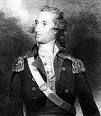


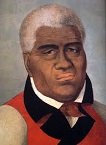

















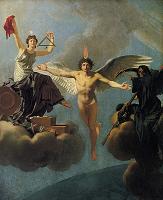



1795 In Jan. intellectual giant Alexander Hamilton resigns as U.S. treasury secy., and submits a report to the House on Jan. 19 laying out a plan for extinguishing the federal debt within 30 years; he leaves Philly in mid-Feb. and returns to his home in Albany, N.Y.; on Feb. 3 Oliver Wolcott Jr. (1760-1833) becomes U.S. treasury secy. #2 (until Dec. 31, 1800); George Washington asks him to get the customs collector for Portsmouth, N.H. to ship a runaway slave woman back to Mount Vernon, but when he can't do it without publicity she is allowed to remain. On Feb. 7 the Eleventh (11th) (XI) Amendment to the U.S. Constitution is ratified, blocking the judicial power of the U.S. from extending to suits against a state or a foreign state. On Feb. 13 the U. of N.C. in Chapel Hill becomes the first state univ. in the U.S., admitting its first student Hinton James, who is the only student on campus for two weeks - how's it going, good, good? On Feb. 18 George III promotes his 2nd son Prince Frederick, Duke of York and Albany to field marshal, followed on Apr. 3 by CIC of the British army (until Mar. 25, 1809), succeeding Lord Amherst, going on to carry out a massive reform, doing "more for the army than any one man has done for it in the whole of its history" (Sir John Fortescue). On Feb. 25 France passes a law providing secondary education for boys, providing scholarships for the poor. On Feb. 25 Union College is founded in Schenectady, N.Y., becoming the first higher ed. institution chartered by the New York Board of Regents, and the 2nd college in N.Y. after Columbia U., going to graduate U.S. pres. Chester A. Arthur and a ton of U.S. govt. bigwigs, and become known as the Mother of Fraternies, spawning the first three Greek letter societies in the U.S., Kappa Alpha (1825), Sigma Phi (1827), and Delta Phi (1827); on Nov. 26, 1825 the social fraternal org. Kappa Alpha is founded there, followed by Sigma Phi (Mar. 4, 1827), and Delta Phi (Nov. 17, 1827), known as the Union Triad, followed by Psi Upsilon (Nov. 24, 1833), Chi Psi (May 20, 1841), and Theta Delta Chi (Oct. 31, 1847). On Mar. 7 the official version of John Jay's Treaty arrives in Philly, and the Senate takes until June 24 to approve it because it makes so many concessions to the Brits, who want to continue their lucrative Northwest fur trade while banning the U.S. from exporting goods to the West Indies; Article XII, a provision legalizing trade with the British West Indies but choked with restrictions is stricken; it is not publicized until July 1, and the public outcry is "like an electric velocity" (Madison), with John Jay burned in effigy in cities across America on the Fourth of July; on July 14 the citizens of Charleston celebrate Bastille Day by dragging the Union Jack through the streets and setting it on fire in front of the British consulate; the U.S. is on the verge of another rev., with the public calling for war with Britain in alliance with France; Washington holds off signing the treaty until Alexander Hamilton lobbies him into it, causing the Jeffersonians to totally split with them, causing Washingto to utter the soundbyte that "the voice of malignancy" is attemping "to wound my character and deceive the people"; on July 18 5K people meet across from the New York City Hall to protest the treaty, with Hamilton speaking for it to a hissing crowd, who stone him; the following week there are more protest rallies in major cities; Washington finally signs it in mid-Aug., and when the U.S. economy booms from British trade while French trade drops, opposition slowly dies out, and the move to mollify them allows the U.S. to build its resources in time to defeat the British in 1812. On Apr. 1 bread riots in Paris are accompanied by monarchist agitation and the arrival of some emigres. On Apr. 5 the first of the Three Treaties (Peace) of Basel between France and Prussia, negotiated by Count von Haugwitz is followed by similar treaties on July 22 between France and Spain and on Aug. 28 between France and Hasse-Cassel, causing Prussia, Saxony, Hanover, and Hesse-Cassel to bug out of the war, pissing-off the other monarchies of Europe and causing Prussia to become morally isolated while marking Rev. France's emergence as a major Euro power; the British army is evacuated through Bremen in Apr.; Prussia recognizes French control of the W bank of the Rhine River, while France returns all captured lands E of the Rhine River; Spain cedes the E two-thirds of Hispaniola Island to France; Prussia now tries to save the provinces on the left bank of the Rhine River from being lost to the HRE despite no language in the treaty by establishing the armed neutrality of N Germany and seeking its recognition by France; too bad, Nappy's Vs in S Germany kill the plan. On Apr. 7 Big Bad Revolutionary France adopts the Metric System, developed by 12 scientists from the French Academy of Sciences appointed by the French Nat. Assembly; a meter (from Greek metron=measure) is one-forty-millionth of the circumference of the Earth through the poles; a 10-day week is also introduced, but Napoleon later abolishes it. Every single one of us is the Devil inside? On Apr. 8 after his daddy George III offers to cover his debts, the Princely Slob of Wales (AKA Prinny) marries German 1st cousin Caroline of Brunswick-Luneburg (Brunswick-Wolfenbuttel) (1768-1821); not being able to stand each other (he calls her "the vilest wretch this this world was ever cursed with"), in 1796 after the birth of a daughter they live apart as much as possible, each with their own lovers; in 1814 she moves to Italy until returning to England in 1820 to become queen, getting a big surprise? On May 1 Congress votes to redesign the U.S. flag to have 15 stars and stripes (the first redesign since 1777), which now incl. Vermont and Kentucky; there are no more changes in 23 years as the U.S. marches into the new cent. with 15 states, 15 stars and 15 stripes. On May 20 the White Terror in France causes the Mountain Party to be exterminated. On May 23 women in France are forbidden to attend political assemblies. In May using purchased European firearms, after chief Kaiana turns on him and joins the enemy, Kamehameha I the Great (1736-1819) defeats Maui-Oahu king Kalanikupule (b. 1760) at the cliffhanger Battle of Nu'uanu Pali (Hawaiian "Kaleleka'anae" = leaping mullet) in S Oahu, pushing a bunch of Oahu warriors off the cliff at the summit to win it, then after several months spent chasing him in the mountains captures and sacrifices Kalanikupule to the war god Ku and unites the Hawaiian Islands, becoming sole king of the Hawaiian Islands in 1810 (until May 8/14, 1819) after the alii of Kaua'i become his vassal in 1810 and recognize him as moi nui (overall king), ending a cent. of warfare in the islands and becoming known as the Napoleon of the Pacific; the Pomares of Tahiti and the Cakobau of Fiji attempt to emulate him, with less success. On June 8 the death of mistreated prisoner (dauphin) Louis XVII (b. 1785) is announced after he is declared to be seriously ill in May; he is buried at the Church of St. Marguerite on June 10, but over the next 40 years several pretenders come forward. On June 30 DOI signer Edward Rutledge's brother John Rutledge (1739-1800) of S.C. (justice #5 in 1789-91) takes office as U.S. chief justice #2 (until Dec. 28, 1795) as a recess appointee (first ever by a U.S. pres., and it's George Washington?), but later in the year the Senate rejects his appointment, and he only serves one term; Pres. Eisenhower later makes three recess appointments: Earl Warren (1953), William Brennan (1956), and Potter Stewart (1958). On Aug. 3 after Gen. Anthony Wayne's big 1794 V at the Battle of Fallen Timbers, the Treaty of Greenville, signed at Fort Greenville in Ohio opens all of Ohio and Indiana to white settlers after the U.S. buys from 12 Indian tribes the rights to the SE quarter of the Northwest Territory for an annual fee of $10K, incl. areas around Vincennes (on the Wabash River), Detroit (on Lake Erie), and Chicago (on Lake Michigan). On Aug. 9 the Mass. state church (Congregational) in Middletown passes a law that any member renouncing infant baptism and joining the Baptist faith shall be disfellowshiped. On Aug. 22 the Constitution of 1795 (Year III) is ratified by the French Nat. Convention, providing for universal male suffrage (age 21 and up), freedom of the press and worship, and a bicameral legislature (Council of Five Hundred and Council of the Ancients), with deputies serving 3-year terms, and a 5-member Directory (exec. branch) (ends 1799) chosen by the legislature, which can restrict freedom of the press for a year; two-thirds of the next legislature is to be drawn from the convention's ranks; on Aug. 23 political clubs, collective petitioning, and popular socities are suppressed; the Directory supersedes the Nat. Convention on Oct. 27. On Sept. 16 British forces capture Capetown, South Africa. The original Orange Crush? On Sept. 21 the Battle of the Diamond between the Roman Catholic Defenders and the Protestants in Northern Ireland leads to the formation of the Orange Order (Loyal Orange Inst.) (Orangemen), named after William III, Prince of Orange to support Protestantism. In the fall the French harvest is poor after a bad winter, causing famine in many parts. On Oct. 5 (Vendemiaire 13) (Mon.) the Day of the Sections sees a royalist uprising in Paris stopped by an army unit led by Napoleon Bonaparte (1769-1821) and his "whiff of grapeshot", a cannonade from the Church of St. Roch, which kills 200; the Convention votes that relatives of emigres are barred from holding office and then dissolves. On Oct. 25 the French govt. establishes the Institut de France in Paris to replace the abolished academies, which goes on to incl. five learned academies starting with the Academie francaise (founded 1635) (which was suppressed in 1693 but is restored in 1803), Academie des inscriptions et belles-lettres (1663), Academie des sciences (1666), Academie de peinture et de sculpture (1648), academie de musique (1669), Academie d'architecture (1671), and Academie des sciences morales et politiques (1795), going on to manage 1K+ foundations by modern times. On Oct. 27 after rhe Spanish want to make peace with the French and switch sides in the European war, U.S. minister to Britain (1792-5) Thomas Pinckney (1750-1828) parleys with the Spanish govt., and on Oct. 27 the U.S. and Spain sign the Treaty of San Lorenzo (Pinckney's Treaty), lowering the U.S. border to the 31st parallel, giving the U.S. free navigation of the Mississippi River, a promise to refrain from inciting Indian attacks, and other goodies, all in favor of the U.S, making Pinckney a big man with the Federalist Party. On Nov. 9 Russian field marshal Alexander Suvorov captures Warsaw, then really stinks himself up by massacring 20K Poles, after which the city is ceded to Prussia (until 1806). On Nov. 22 Polish king (since 1765) Stanislaus II Augustus Poniatowski (1732-98) abdicates, and Poland is partitioned for a 3rd time on Oct. 24 in a secret treaty between Russia, Prussia, and Austria in the "vast national crime" of Poland's extinction; Poland is wiped from the map for more than a cent. until the Peace of Versailles after WWI; Vilnyus (Vilnius), Lithuania is taken by Russia; duke (since 1769) Peter von Biron (1724-1800), last duke of the Grand Duchy of Courland (founded in 1561) in Latvia on the Baltic Sea bordering Polish Livonia and the W Dvina River to the E and Lithuania to the S cedes his duchy to Russia, giving them the rest of the Gulf of Riga, and making for an interesting situation since most of the landowners are Germans, which gives Sweden ideas. On Nov. 22 William Henry Harrison (b. 1773) marries Anna Tuthill Symmes (1775-1864); they have 6 sons and 4 daughters, incl. John Scott Harrison (1804-78), father of U.S. pres. Benjamin Harrison. In Nov.-Dec. Parisian workers, esp. in the printing trades strike. Britain captures Ceylon from the Dutch, plants clove trees in Panang, and occupies the Cape of Good Hope. The British take Malacca to hold for the Dutch while they are under French domination (until 1802). The Persians under Mohammad Khan Qajar ravage Georgia, reduce Tbilisi to ashes, and capture Khorasan, torturing Shah Rukh to death to get him to reveal where his grandfather Nadir Shah's legendary treasures are. The British Speenhamland Act (named for the Pelican Inn in Speenhamland, Berkshire) for poor relief is passed, supplementing wages with a public dole. A branch of Daniel Boone's Wilderness Road (Trail) terminating at Harrodsburg is extended to Louisville and Frankfort, and widened to accommodate wagons, becoming a principal avenue of western migration until 1840. Warren Hastings is acquitted of high treason. Timothy Pickering (1745-1829), U.S. postmaster gen. since 1791 becomes U.S. secy. of war (until ?), supervising the conversion of the army post of West Point into a military academy; he also serves as U.S. secy. of state (until 1800) after Patrick Henry turns it down. Karachi, Pakistan comes under the rule of the Iranian-speaking Balochi Talpur tribe in Balochistan. Dutch East India Co. official Isaac Titsingh (1745-1812) (a surgeon and merchant trader) is received with great propriety at the court of Chinese emperor Qin Qian Long just before the celebration of his 60th year of reign, showing up mophead Paul, er, George Macartney of England - tits singing jokes here? Spanish attempts to settle Vancouver Island and Cape Flattery are abandoned. The French seize Arnhem on the Rhine River (until 1813). The Persians invade and devastate the E Georgian kingdom of Kakheti and Kartli. Irish-born Don Ambrosio Bernardo O'Higgins, 1st Marquis of Osorno (1720-1801), founder of the cities of San Ambrosio and Osorno, Peru and the highway from Santiago to Valparaiso is appointed viceroy of Peru (until 1801), becoming the only working class man to make it to that rank; his son is Bernardo O'Higgins (1778-1842), who goes on to become the liberator of Chile - what's up, dog, where your ship at, my ship's over here? Thomas Paine is released from prison in France after 11 mo., and restored to his seat in the Nat. Convention, but is now disgusted with French politics and mainly studies finance (until 1802). Paul Revere and Sam Adams bury a time capsule in the cornerstone of the Mass. State House in Boston; it is unearthed on Dec. 11, 2014. The U.S. Mint begins minting $5 Half Eagle coins (until 1929); up to 1807 they carry no indication of their denomination; only 8,707 1795 $5 U.S. Half Eagle coins are minted, making it a coin collector's holy grail; in 1941 an 1822 Half Eagle sells for $11,575, the highest price for a U.S. coin to that time. Empress Catherine II the Great founds the Imperial Library in St. Petersburg on Nevsky Prospekt, becoming Russia's first public library; currently the Nat. Library of Russia, its name changes 7x in two cents. (State Saltykov-Shchedrin Public Library, etc.). The city of Arak in WC Iran (modern-day pop. 609K) is founded by pro-Iranian Georgian warlord Yusef Khan Gorji, who was given refuge by Agha Mohammad Khan after a territorial dispute with Catherine II the Great. The borough of Braddock in Allegheny County, SW Penn. on the Monongahela River E of Pittsburg (modern-day pop. 2K) is settled on the site of Edward Braddock's 1755 ambush, becoming the site of the Carnegie steel mills, the first Bessemer steel process, and the first Carnegie free public library. Edmonton (modern pop. 600K) in Alberta, Canada on the North Saskatechewan River is founded as a Hudson Bay trading post. The city of Milk, er, Milwaukee, Wisc. (Algonq. "millioke" = pleasant land") (modern-day pop. 595K/2M) is settled by French-Canadian fur trader Jacques Vieau (Vieaux) (1757-1852), becoming known for beer brewing. ddThe city of Williamsport, Penn. (modern-day pop. 29K) is founded, becoming an incorporated borough on Mar. 1, 1806 and a city on Jan. 15, 1866, then hosting Little League Baseball in 1939. The Money Pit? A 13-ft.-wide circular pit is found by 16-y.-o. Daniel McGinnis from the Nova Scotian town of Chester on uninhabited Oak Island, and he gets help from John Smith and Anthony Vaughn and they begin digging, uncovering oak platforms every 10 ft., but finally give up in 1804, when wealthy Simeon Lynds expends his fortune in a fruitless effort to find fabled treasure only to see the pit flood, but in 1849 the original diggers, backed by a syndicate in Truro, N.S. resume their dig, discovering a tunnel to nearby Smith's Cove at 111 ft; after it is blocked in 1893, another tunnel at 150 ft. is discovered, and they give up after spending $1.5M and recovering only a 3-link gold chain, a scrap of parchment with the letters V and I, and a cipher stone with undecipherable symbols, which true believers claim says "10 feet below $10 million are buried". British explorer Capt. William Robert Broughton (1762-1821) visits Hokkaido, Japan ("circuit of the northern seas") and partially charts the Japanese coast. The French livre is abolished and replaced by the 5-gram silver franc, comprising 100 centimes. Am. Rev. War army chaplain and Greenfield, Conn. Congregationalist minister Timothy Dwight IV (1752-1817) (grandson of the elder Jonathan Edwards) succeeds Ezra Stiles, becoming pres. #8 of Yale College (until 1817). Cambridge U. divinity student Charles Jerram wins a prize for his thesis that the Bible prophesies the restoration of the Jews to the Holy Land. Franz Josef Haydn returns from his 2nd tour of London, well aware that he's the #1 Euro composer now. The first "sharp-built" (V-shaped hull) Baltimore Clipper is built in Fells Point shipyards in Baltimore, Md., going on to gain a rep for speed and ability to outrun British naval vessels; they become obsolete after 1815. Architecture: Oxfordshire-born English neoclassical architect Sir John Soane (1753-1837) begins the new Bank of England on Threadneedle St. in London (finished 1827). Mass. engineer "Father of Am. Civil Engineering Col. Loammi Baldwin (1744-1807) (who fought in the 1775 Battle of Lexington-Concord and crossed the Delaware River on Xmas 1776 with George Washington) begins the 27-mi. Middlesex Canal in Mass. (finished 1803) connecting the port of Boston with the Merrimack River for barge traffic, opening the interior of New England to commerce and bankrupting the Merrimack River port of Newburyport, Mass.; the canal is used until 1851. Pres. George Washington lays the cornerstone of the North Wing of the U.S. Capitol in Washington, D.C. (finished 1805). English architect James Wyatt builds eccentric throwback Broadway Tower in Worcestershire. Inventions: The first horse-drawn railroad is built in England. In order to win a prize offered by Napoleon, French chef Nicolas (Francois) Appert invents food canning, using glass jars sealed with pitch. Joseph Bramah invents the hydraulic press. After the war with England curtails the supply of English plumbago, French balloonist and army officer Nicolas-Jacques Conte (Conté) (1755-1805) of Paris invents a process for making lead for pencils by mixing powdered black lead (graphite) with clay and water, squeezing it into strips, then cutting and baking in a kiln, producing different shades by varying the composition ratio. Lord George Murray invents a signaling system using shuttered apertures that links London with Deal, Plymouth, Portsmouth, and Yarmouth. Science: Nonfiction: Anon., Muye Dobo Tongji (Korean "Comprehensive Illustrated Manual of Martial Arts") (4 vols.); earliest Korean martial arts (Tae Kwon do) manual, commissioned by King Jeongjo. Charles Francois Dupuis (1742-1809), Origine de Tous les Cultes, ou la Religion Universelle (The Origin of All Religious Worship, or the Universal Religion) (12 vols.); questions the historicity of Jesus. Maria Edgeworth (1767-1849), Letters for Literary Ladies. Samuel Hearne (1745-92), A Journey from Prince of Wales's Fort in Hudson Bay to the Northern Ocean (posth.). James Hutton (1726-97), Theory of the Earth, with Proofs and Illustrations; enlarged ed. of his 1785 paper. William Henry Ireland (1775-1835), Newly Discovered Documents by William Shakespeare; pub. by his daddy Samuel Ireland (1744-1800); soon exposed as forgeries, causing the supposedly new Shakespeare play "Vortigern and Rowena" to flop next Apr. 2, after which he comes clean in Authentic Account (1796), causing his daddy to be accused of being in with it, causing him to pub. A Vindication of His Conduct (Nov. 1796). Immanuel Kant (1724-1804), Zum Ewigen Frieden (Perpetual Peace); advocates the abolition of nation-states in favor of an internat. govt. Gaspard Monge (1746-1818), Une Application d'Analyse a la Geometrie. Thomas Paine (1737-1809), The Age of Reason, Part 2. Friedrich von Schelling (1775-1854), On the Possibility of any Form of Philosophy - too intelligent to be categorized? Alexander Suvorov (1729-1800), The Science of Victory (1795-6); his military aphorisms, incl. "The bullet is a fool, the bayonet is a good chap." Friedrich August Wolf (1759-1824), Prolegomena ad Homerum; suggests that Homer's "Iliad" and "Odyssey" are really the work of several authors, starting a big debate for much of the 19th cent. - time to regift? Music: Anon., Tom the Piper's Son (London). Ludwig van Beethoven (1770-1827), Rondo a Capriccio (Rondo alla Ingharese quasi un Capriccio) ("Rage over a Lost Penny"), Op. 129 (left incomplete, finished and titled by Anton Diabelli, and pub. posth.); Three Piano Concertos, Op. 1: No. 1 in E flat major, No. 1 in G major, No. 2 in C minor; his first public appearance in Vienna; he wrote his first piano concerto in E-flat (unpub.) at age 14 - the original Doowahdiddydiddydumdiddydoo one hit wonder not? Francois-Adrien Boieldieu (1775-1834), Rosalie et Myrza (comic opera) (Rouen). Franz Josef Haydn (1732-1809), Twelve London Symphonies; the last is No. 104 in D major ("The London Symphony), his last symphony. Vicente Martin y Soler (1754-1806), La Capricciosa Corretta (opera); libretto by Lorenzo Da Ponte, based on Shakespeare's "Taming of the Shrew". Art: A.J. Carstens, Night with Her Children. Jacques-Edme Dumont (1761-1844), Statuette of the Mythological Paris (terracotta). John Hoppner (1758-1810), Portrait of the Frankland Sisters. Rembrandt Peale (1778-1860), Portrait of George Washington; son of Charles Willson Peale carries on daddy's work. Jean-Baptiste Regnault (1754-1829), La Liberte ou la Mort; the red Phyrigian cap again. Poetry: William Blake (1757-1827), The Book of Los; incl. The Book of Ahania. William Dunlap (1766-1839), Fontainville Abbey. William Gifford (1756-1826), Maeviad; satire on contemporary English drama. Johann Wolfgang von Goethe (1749-1832), Romische Elegien. Robert Southey (1774-1843), Poems. Johann Heinrich Voss (1751-1826), Luise (epic idyll). Novels: William Blake (1757-1827), Continental Prophecies (1793-5); incl. America: A Prophecy, The Song of Los. Richard Cumberland (1732-1811), Henry. Johann Wolfgang von Goethe (1749-1832), Wilhelm Meister's Apprenticeship (Wilhelm Meisters Lehrjahre) (1795-6); a Bildungsroman (educational novel) which becomes the model for German fiction for 30 years; Wilhelm attempts to escape bourgeous life, tries the theater, then joins the mysterious Tower Society. Rudolf Erich Raspe (1737-94), Baron Munchausen's Narrative of His Marvellous Travels and Campaigns in Russia (posth.); by a friend of Baron von Munchausen (1720-97), the Andy Warhol of the 18th cent.? Jean Paul (1763-1825), Hesperus; or Forty-Five Dog-Post Days; a big hit, making him an instant German star. Marquis de Sade (1740-1814), Philosophy in the Bedroom; two chars. argue about adopting the philosophy of libertinism. Births: Russian "The Woes of Wit" dramatist-composer-diplomat Alexander Sergeyevich Griboedov (d. 1829) on Jan. 15 in Moscow; educated at Moscow U. Dutch queen (1840-9) Anna Pavlovna of Russia (d. 1865) on Jan. 18 in St. Petersburg; 8th child (6th daughter) of Paul I (1754-1801) and Maria Feodorovna (Sophia Dorothea of Wurtemberg) (1759-1828); sister of Alexander I (1777-1825). South Am. liberator and pres. #1 of Bolivia (1825-8), and pres. #4 of Peru (1823) Antonio Jose de Sucre (d. 1830) on Feb. 3 in Cumana; Jewish (Zucker) descent? German chemist (coiner of the word "caffeine") Friedrich (Friedlieb) (Friedlob) Ferdinand Runge (d. 1867) on Feb. 8 near Hamburg. Canadian political leader William Lyon Mackenzie (d. 1861) on Mar. 12 in Dundee, Scotland; emigrates to Canada in 1820. English Gen. Sir ("Hero of the Sepoy Mutiny") Henry Havelock (d. 1857) on Apr. 5 in Bishop-Wearmouth, Sunderland, Durham; father of Sir Henry Havelock-Allan (1830-97). Spanish composer-pianist Pedro Albeniz (Albéniz) y Basanta (d. 1855) on Apr. 14 in Logrono. English explorer Capt. Charles Napier Sturt (d. 1869) on Apr. 28 in Bengal, India; great-great granduncle of Rod Taylor (1930-). French atty.-statesman (Jewish) Adolph Cremieux (Crémieux) (Isaac Moise) (d. 1880) on Apr. 30 in Nimes. English Addison's Disease physician Thomas Addison (d. 1860) in Apr. in Longbenton, Northumberland; educated at the U. of Edinburgh. French historian Jacques Nicolas Augustin Thierry (d. 1856) on May 10 in Blois; brother of Amedee Thierry (1797-1873). Czech historian-philologist-poet Pavel Josef (Pavol Jozef) Safarik (afárik) (d. 1861) on May 13 in Kobeliarovo. Am. financier-philanthropist Johns Hopkins (d. 1873) on May 19 in Anne Arundel County, Md. English Houses of Parliament architect Sir Charles Barry (d. 1860) on May 23 in London. English clergyman-educator (headmaster of Rugby School, 1828-41) Thomas Arnold (d. 1842) on June 13 in West Cowes, Isle of Wight; father of Matthew Arnold (1822-88) and Thomas Arnold II (1823-1900); educated at Corpus Christi College, Oxford U.; inspires Baron Coubertin to found the modern Olympics. Scottish surgeon ("Father of Modern Hypnosis") (coiner of the term "hypnosis") James Braid (d. 1860) on June 19 in Portmoak, Kinross. English surgeon (The Lancer co-founder0 Thomas Wakley (d. 1862) on July 11 in Membury, Devon. French Lame Curves mathematician Gabriel Lame (Lamé) (d. 1870) on July 22 in Tours. German "Der Vampyr", "Hans Heiling" Romantic opera composer Heinrich August Marschner (d. 1861) on Aug. 16 in Zittau; one of the big #3 along with Carl Maria von Weber (1786-1826) and Richard Wagner (1813-83). U.S. naval commodore Robert Field Stockton (d. 1866) on Aug. 20 in Princeton, N.J.; grandson of DOI signer Richard Stockton (1730-81). Peruvian pres. (1833-6) marshal Luis Jose Orbegoso y Moncada Galindo (d. 1847) on Aug. 25 in Chuquisongo, Huamachuco. English "Endymion" Romantic poet John Keats (d. 1821) on Oct. 31 in Moorgate, London; son of a stable-keeper; teen apprentice to a surgeon-apothecary; gets his license in 1816, then gets turned on by Spenser's "Faerie Queene" and turns to poetry, going on to almost become the 2nd Shakespeare, if not for nasty TB, which also killed his mother and brother. Am. publisher (founder of the New York Herald) James Gordon Bennett Sr. (d. 1872) on Sept. 1 in Newmill, Banffshire, Scotland; educated for the Roman Catholic priesthood; emigrates to Halifax, N.S. in 1819, then Boston, then New York City in 1826; father of James Gordon Bennett Jr. (1841-1918). Am. women's rights activist (freethinker) (abolitionist) Frances "Fanny" Wright (d. 1852) on Sept. 6 in Dundee, Scotland; emigrates to the U.S. in 1818. French politician and field marshal Louis-Achille Baraguey d'Hilliers, 1st Comte Baraguey d'Hilliers (d. 1878) on Sept. 6 in Paris; son of Louis Baraguey d'Hilliers (1764-1813). Am. celeb (black) Alexander Lucius Twilight (d. 1857) on Sept. 26 in Corinth, Vt.; first African-Am. to earn a bachelor's degree from a U.S. college or univ. Am. abolitionist statesman Joshua Reed Giddings (d. 1864) on Oct. 7 in Tioga Point (Athens), Penn.; uses the alias Pacificus. Prussian king (1840-61) Frederick William (Friedrich Wilhelm) IV (d. 1861) on Oct. 15 in Berlin; eldest son of Frederick William III (1770-1840) and Louise of Mecklenburg-Strelitz (1776-1810). Am. politician-novelist John Pendleton Kennedy (d. 1870) on Oct. 25 in Baltimore, Md.; educated at Harvard U.; writes chap. 4, vol. 2 of William Makepeace Thackeray's "The Virginians". U.S. pres. #11 (1845-9) James Knox Polk (d. 1849) on Nov. 2 in Mecklenburg County, N.C.; grandson of Am. Rev. War Gen. Henry Knox (1750-1806); 2d U.S. pres. born in a log cabin (#1=Jackson); reared in Maury County, Tenn. from 1806; his Presbyterian mother Jane Polk is a great grand-niece of John Knox; his Scots-Irish Deist father Samuel Polk refuses to let him be baptized. English reformer (penny postage inventor) Sir Rowland Hill (d. 1879) on Dec. 3 in Kidderminster, Worcestershire; son of Thomas Wright Hill (1763-1851); knighted in 1860. Scottish "Sartor Resartus" essayist-historian (Calvinist-turned-agnostic) Thomas Carlyle (d. 1881) on Dec. 5 in Ecclefechan, Dumfries and Galloway; educated at the U. of Edinburgh, where he loses his Christian faith and develops a chronic stomach ailment, which his critics attribute to his loss of faith; coiner of the term "the dismal science". U.S. atty. Gen. #12 (1833-7) Benjamin Franklin Butler (d. 1858) on Dec. 17 in Kinderhook Landing, N.Y. German historian Leopold von Ranke (d. 1886) on Dec. 21 in Wiehe (near Merseburg), Thuringia, Saxony; educated at the U. of Leipzig; student of Johann Gottfried Jakob Hermann (1772-1848); knighted in 1865. Am. journalist-politician William Edward Woodruff (d. 1885) on Dec. 24 in Long Island, N.Y. Irish "The Convict of Clonmala" poet Jeremiah Joseph Callanan (d. 1829) in County Cork; educated at Trinity College, Dublin. English economist William Forster Lloyd (d. 1852) ;educated at Westminster School, and Christ Church, Oxford U. Welsh poet Jeuan Glan Geirionydd (d. 1855). British military surgeon (female?) (transexual?) James Miranda Steuart Barry (Margaret Ann Bulkley) (d. 1865) (b. 1789?) in Ireland; son of Jeremiah and Mary-Ann Bulkley, sister of James Barry (1741-1806); educated at the U. of Edinburgh; cross-dresses to pass as a man? Am. mesmerist John Bovee Dods (d. 1872) in New York City. Spanish hero Don Diego de la Vega ("Zorro") (b. ?) in Alta, Calif.; his father is Spanish Capt. Alejandro de la Vega, and his half-American Indian mother is Regina, nee Toypurnia, who was captured after leading a united tribe army on the San Gabriel mission wearing a wolf getup, and is sent to a Spanish colonial leader's home to learn how to act like a proper European lady while her hubby-to-be fathers "milk brother" Bernardo :) Deaths: German-born English composer John Christopher Smith (b. 1712) in Bath. French writer Jean-Jacques Barthelemy (b. 1716) on Apr. 30. Spanish naval officer Antonio de Ulloa (b. 1716) on July 3 in Leon Island. Am. Rev. War maj. Gen. John Armstrong Sr. (b. 1717) on Mar. 9 in Carlisle, Penn. Am. educator Dr. John Phillips (b. 1719). Welsh-born Am. Baptist minister Morgan Edwards (b. 1722) on Jan. 28 in Pencador, Del. English stock breeder Robert Bakewell (b. 1725). French chess player-composer Francois-Andre Danican Philidor (b. 1726) on Aug. 31. Am. scholar (pres. of Yale) Ezra Stiles (b. 1727) on May 12. British navigator Samuel Wallis (b. 1728) on Jan. 21 in London; namesake of Wallis and Futuna. British Gen. Sir Henry Clinton (b. 1730) on Dec. 23 in London. English pottery maker Josiah Wedgwood (b. 1730) in Stoke-on-Trent. British Ranger Maj. Robert Rogers (b. 1731) in London. German composer Johann Christoph Friedrich Bach (b. 1732) on Jan. 26; much of his work is lost in WWII when the Staatliches Institut fur Musikforschung in Berlin is destroyed. Am. Rev. War Gen. ("the Swamp Fox") Francis Marion (b. 1732) on Feb. 27 in Georgetown, S.C. Japanese painter Maruyama Okyo (b. 1733). Spanish painter Francisco Bayeu y Subias (b. 1734) on Aug. 4 in Madrid. Am. diplomat William Lee (b. 1739). Swedish poet Carl Michael Bellmann (b. 1740) on Feb. 11. Scottish diarist and biographer James Boswell (b. 1740) on May 19; leaves the Auchinleck (pr. like Affleck) family state in Ayrshire. Scottish encyclopedist William Smellie (b. 1740) on June 24 in Edinburgh. Am. Rev. War Gen. and jurist John Sullivan (b. 1740) on Jan. 23 in Durham, N.H. Italian adventurer Cagliostro (b. 1743) in prison; Napoleon has a drinking cup made from his skull - one bean salad for table 11? French dauphin Louis Charles (Louis XVII) (b. 1785) on June 8.







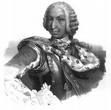













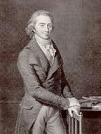


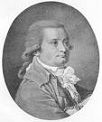

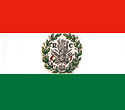
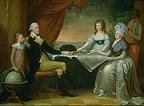


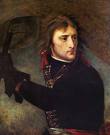
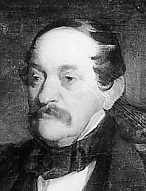
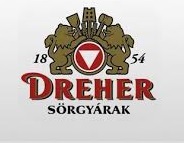
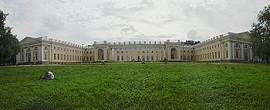
1796 Early in the year after the fall of Robespierre in France lightens things up in that-wasn't-funny England, the slavery abolition bill long pushed by MP William Wilberforce seems to finally be about to pass, but the 3rd reading of the bill takes place on the night that a comic opera debuts in London, causing four supporters to skip the vote to see it - it was that funny? A Triple Alliance is formed by Britain, Austria, and Russia against France (different from the ones in 1668 and 1717), while Spain and France sign an alliance against England; France conquers Mannheim and Belgium; Luxembourg capitulates to France; after the Army of the Rhine under Gen. Lazare Hoche kicks their butts, Austria signs an armistice with France, and the Netherlands passes under French domination with a French army backed by returning Patriots, and on Jan. 19 the Batavian Repub. is proclaimed (until June 5, 1906), wih Louis I as king. On Jan. 27 Philly physician (Scots-Irish immigrant in 1771, who signed the Constitution) James McHenry (1753-1816) becomes U.S. war secy. #3 (until May 13, 1800), going on to build Ft. McHenry to defend the port of Baltimore, Md. On Feb. 4 Samuel Chase (1741-1811) of Md. becomes U.S. Supreme Court justice #9 (until June 19, 1811) to replace John Blair (1789-96); on Mar. 8 Oliver Ellsworth (1745-1807) of Conn., who coined the term "United States" becomes U.S. Supreme Court chief justice #3 and the 10th justice (until Dec. 15, 1800). On Feb. 9 Emperor (since 1736) Qin Qian Long (Ch'ien Lung) (b. 1711) retires, and his son Yongyan (Kia-King) becomes Qing (Manchu) emperor #5 of China Qin Jia Qing (Qing Ren Zong) (1760-1820), issuing the Edict of Peking, forbidding import of opium into China and making opium smoking a capital offense. On Feb. 20 the French govt. cancels the planned end of the distribution of meat and bread at nominal prices in Paris after a near revolt, which gives agitator Francois-Noel "Gracchus" Babeuf (1760-97) his cue, and he forms the Society of Equals (Societe des Egaux), which meets at the Pantheon until it is closed on Feb. 27, after which he pick up more steam and begins calling for the annihilation of the govt. On Feb. 16 the official observance of George Washington's birthday in the U.S. begins. On Mar. 8 the U.S. Supreme (Ellsworth) Court rules in Hylton v. U.S. that a tax on the possession of goods is not a direct tax that must be apportioned under Article I of the Constitution, as a tax on land would be, becoming the first time the court exercises judicial review, challenging the constitutionality of an act of Congress; the same year the court rules in Ware v. Hylton that an article in the 1783 Treaty of Paris supersedes Va. law under the Supremacy Clause, becoming the first court nullification of a state law; John Marshall gives an eloquent argument to the court that helps make him a star. One is the loneliest number? On Mar. 9 27-y.-o. up-and-coming Gen. Napoleon Bonaparte marries 33-y.-o. Martinique-born Josephine de Beauharnais (the Creole) (1763-1814), widow of guillotined Martinique-born French army Gen. Alexandre, Vicomte de Beauharnais (until 1809); she likes to bring her pet orangutan to dinner parties. On Mar. 18 the French govt. attempts to stabilize currency by replacing assignats with mandats territoriaux, but they depreciate overnight, causing the govt. to withdraw them and attempt to get a forced loan from the rich in vain, causing near bankruptcy; on Apr. 4 the govt. finds that 500K Parisians need relief; meanwhile pesky rabble-rouser Francois-Noel Babeuf recruits tons of new followers, and beginning on Apr. 11 Paris is placarded with his soundbyte "Nature has given to every man the right to the enjoyment of an equal share in all property", while cafe goers sing his song "Mourant de Faim, Mourant de Froid" (Dying of Hunger, Dying of Cold, tra-la); after finding out about an armed uprising planned for May 11, the authorities arrest Babeuf and his assocs. on May 10, and his "Tribune du peuple" is shut down - look at that steak, isn't it gorgeous? In Mar. Gen. Louis Lazare Hoche ends the revolt in French Vendee (begun 1793). In Mar. James Madison breaks with his old ally Pres. Washington by supporting a congressional demand that he turn over his private instructions given to John Jay to guide his negotiations with Britain; Washington, backed by Hamilton, spurns the request, creating a precedent for Executive Privilege; Washington never takes Madison back into the fold. On Apr. 1 the city of Dayton, Ohio on the Great Miami River in SW Ohio (modern-day pop. 141K/799K) is founded by the 12-person Thompson Party from Cincinnati, Ohio, becoming the birthplace of aviation pioneer Orville Wright. On Apr. 13 the first known elephant arrives in the U.S. Rape me, rape me my friend? On Apr. 13-14 after his honeymoon and being appointed CIC of Italy and sent on a campaign against the Austrians in N Italy, Napoleon pyrhhically defeats the Austrians at the Battle of Millesimo, followed on Apr. 21 by a real V over the Piedmontese (Sardinians) at the Battle of Mondovi (Montenotte) in Piedmnt, causing Victor Amadeus to conclude a separate peace with France; on May 10 Nappy defeats the Austrians at the Battle of Lodi (Nappy falls into the Adda River as the French are storming the bridge, but is pulled out before he can drown), and again on May 11 at the Battle of Arcol; he then occupies Milan and Venice on May 12, and decides to form two new repubs., one to the N of the Po River (Transpadane), and the other to the S of the Po River (Cispadane). On Apr. 14 the Battle of Millesimo (Millefimo) (Dego) is a D for 4K Austrians and Savoyards and a V for the 10K-man French army of Napoleon, causing the first of five Napoleonic Medals to be awarded. On June 1 "Volunteer State" Tennessee (Tenn.) (named after Tanasi, the Cherokee villages on the Little Tennessee River) is admitted as the 16th U.S. state (slave), becoming the first U.S. state to (eventually) border eight other states; there are now 7 free and 9 slave states, with N.J. practically in the free camp (since it's not economically important), and the balance see-saws, being roughly preserved for the next 50 years as new states are added; William Blount is elected as U.S. Sen. from Tenn. On July 6 crotchety Lord Amherst (b. 1717) receives a field marshal's baton 11 mo. before his death - anus in baton jokes here? Reverse the charges? In June French Gens. Jean Victor Moreau and Jean Baptiste Jourdan separately invade S Germany, creating a German Front; Moreau forces Baden, Wurttemberg and Bavaria to conclude truces in Aug.; Jourdan is defeated by epileptic but Austrian troops led by archduke Charles of Teschen (1771-1847) (brother of HRE Francis I) at Amberg on Aug. 24 and Wurzburg on Sept. 3, preventing the two French armies from linking up on German soil; Jourdan resigns his command, and Moreau retreats across the Rhine, but the Germans don't follow up conclusively. On July 8 the U.S. State Dept. issues its first U.S. passport. On July 12 French Rev. troops under Gen. Jean Baptiste Kleber siege Frankfurt am Main, which is garrisoned with Austrian troops; on July 13-14 (night) they shell the Jewish ghetto (Judengasse), destroying one-third of the houses, causing its de facto abolishment. On July 21 after leaving Portsmouth, England last May 22 on the Endeavor, and reaching the Gambia River on June 21, disembarking on Dec. 2 to explore the interior with two native guides, getting captured and imprisoned by a Moorish chief for 4 mo. and escaping on July 1 with only a horse and pocket compass, Scottish surgeon-explorer Mungo Park (1771-1806) becomes the first European to discover the Niger River near Segou in modern-day Mali, following the river 300 mi. to Bamako and returning to Scotland via Antigua on Dec. 22, causing a sensation with the big news. On July 22 the city of Cleveland, Ohio (modern-day pop. 397K/3.5M) on the Cuyahoga River is founded by land surveyor Moses Cleaveland (OE "hilly area") (1754-1806) of the Conn. Land Co.; the first settler is Lorenzo Carter; the village of Cleaveland is incorporated on Dec. 23, 1814, and incorporated as a city on Mar. 6, 1836 after the completion of the Ohio and Erie Canal in 1832 allows shipping down the Mississippi River to the Gulf of Mexico, and iron ore begins to be shipped in from Minn. - Levon calls his child Jesus? On Aug. 5 Napoleon Bonaparte and his 26K French troops win a V against 16K Ahnulds, er, Austrians under field marshal Dagobert Sigmund von Wurmser (1724-97) at the Second Battle of Castiglione (Solferino), opening their way to Mantua - I think you're crazy, yes I do? On Aug. 19 the secret Second Treaty of Ildefonso (first 1777, next 1800) between Spain and France allies them against the British. On Aug. 27-28 (night) Francois-Noel Babeuf and his assocs. are secretly removed from Paris to Vendome for trial, but his followers find out and attempt to break him out via a riot, which doesn't materialize; on Sept. 7 500-600 of his followers attempt to incite a military revolt in Grenelle, again in vain. On Sept. 2 the Am. brig Sally from Boston, Mass. accidentally grounds on a shoal near Johnston (Kalama) Island (Atoll) and Sand Island 860 mi. SW of Honolulu, Hawaii, after which Capt. Joseph Pierpont pub. his discovery but doesn't claim or name them, which happens when British Capt. Charles J. Johnston of the HMS Cornwallis sights them on Dec. 14, 1807. On Sept. 6 the First Battle of Bassano in Venetia, Italy sees Austrian troops under Field Marshal Count Dagobert Sigmund von Wurmser defeated by French troops under Napoleon. On Sept. 19 Pres. Washington's Farewell Address (dated Sept. 17) is pub. in the Philadelphia Daily American Advertiser (never delivered); it is based on a draft prepared by Madison four years earlier; in it he declines to accept a 3rd term, and disses the spirit of sectionalism as well as the spirit of party and partisan excess,,with the soundbyte: "Let me now... warn you in the most solemn manner against the baneful effects of the Spirit of Party generally... A fire not to be quenched, it demands a uniform vigilance to prevent its bursting into a flame, lest, instead of warming, it should consume"; his speech contains the following oft-quoted advice: "Observe good faith and justice toward all nations. Cultivate peace and harmony with all... The Nation which indulges toward another an habitual hatred or an habitual fondness is in some degree a slave. It is a slave to its animosity or to its affection, either of which is sufficient to lead it astray from its duty and its interest... Tis our true policy to steer clear of permanent alliances with any portion of the foreign world"; the phrase "entangling alliances" is first used by Jefferson in his first inaug. address; the 2-term precedent wows all succeeding presidents, who observe it out of respect for him until cocky FDR. Washington out of the way, the U.S. descends from Mount Olympus with its first partisan election for president? The Federalists choose John Adams as their candidate for pres., and Thomas Pinckney of S.C. for vice-pres.; Adams utters the soundbyte "I dread... a division of the republic into two great parties"; the Repubs. choose Thomas Jefferson for pres. and Aaron Burr of New York for vice-pres.; Federalist leader Alexander Hamilton tries to rig the election against his hated foe Adams by encouraging electors to vote for Pinckney while refraining from voting for Adams, thus making Pinckney pres.; too bad, it backfires, and results in Adams on Nov. 2 receiving 71 electoral votes, Jefferson 68, Pinckney 59, and Burr 30; Adams becomes pres. and Jefferson vice-pres., a dreaded mixed marriage. On Oct. 14 Sardinian king (since 1773) Victor Amadeus III (b. 1726) dies, and his son Charles Emmanuel IV (1751-1819) becomes king of Sardinia-Piedmont (until 1802); by 1798 he loses Piedmont to France. On Oct. 16 the Modena Congress, attended by reps from the provinces of Modena, Bologna, Ferrara and Reggio Emilia, and organized by Napoleon proclaims the Cispadane Repub. in N Italy (ends July 9, 1797), and invites other Italian provinces to join, forming an army of mounted hunters with artillery; next Jan. 7 in Reggio Emilia the congress picks a flag consisting of the Italian tricolor (red, white, green), with a quiver, accolade and four arrows, crowned with bay leaves. In Oct. Jean Jacques Regis (Régis) de Cambaceres (Cambacérès) (1753-1824), former member of the Nat. Convention (who favored leniency toward the king) is elected pres. of the Council of Five Hundred, and formulates the Projet de Code Civil, the basis of the Code Napoleon. On Nov. 6 the Austrians under Field Marshal Baron Joseph (Jozsef) Alvinczi von Borberek (1735-1810) defeat Napoleon at the Second Battle of Bassano, and again on Nov. 12 at the Battle of Caldiero; on Nov. 15-17 Napoleon defeats the Austrians at the Battle of the Bridge of Arcole (Arcola), using a bold maneuver to outflank the Austrian army underand cut its line of retreat, foiling the 3rd Austrian attempt to lift the Siege of Mantua, beginning Napoleon's meteoric rise; after withdrawing toward Vicenza, the Austrians gamely reoccupy the field of battle on Nov. 22, then after some troops under Lt. Paul Davidovich (1737-1814) begin their own retreat, Alvinczi admits defeat and falls back to Bassano. On Nov. 17 (Nov. 5 Old Style) horse-loving tsar (since 1762) Catherine II the Great (b. 1729) dies on a straw mat three days after suffering a stroke on her way to the water closet, leaving the Diary of Catherine the Great and a huge art collection housed in the Hermitage next to the Winter Palace in St. Petersburg on the Neva River; she dropped her big plans to break up the Ottoman Empire and partition the Balkans with Austria after the outbreak of the French Rev.; despite declaring on Nov. 5 that he's unfit, and that she prefers her other son Alexander, her son (the Walrus is Paul?) Paul I Petrovich Romanov (1754-1801) becomes Russian tsar (until Mar. 23, 1801), proceeding to undo all her work, starting by firing massacre-loving field marshal Alexander Suvorov, limiting the work of serfs, and undermining the nobility, all leading to his murder in a matter of a few years; meanwhile Suvorov retires in style in his Konchauskoy Estate near Moscow, waiting in the wings, while Savoyard Xavier de Maistre (1763-1852), who joined Suvorov after the annexation of Savoy to France in 1792 flees to St. Petersburg, getting his ultra-conservative brother Joseph-Marie, Comte de Maistre (1753-1821) a job as Sardinian ambassador to Russia in 1803 (until 1817) - hello, welcome to reactionary dot com, how can I hurt you? In Dec. the Expédition d'Irlande (French expedition to Ireland) sees the French Dir. of the First French Repub. send 15K soldiers from Brest under Gen. Lazare Hoche to attempt a landing in Bantry Bay, Ireland to support the outlawed Society of United Irishmen; too bad, winter storms cause the fleet to break up and return to Brest through British-infested waters; a 2nd landing is attempted in Aug. 1798 with 2K men, but it also becomes a dud. Sawai Madhavrao commits suicide, leaving no heir, and Baji Rao II (1775-1851) becomes the last peshwa of the Maratha Confederacy (until 1818), going on to become a cruel bum who squanders his wealth and turns the pop. against him. The royalist revolt in Vendee, France (begun 1793) is quashed. Agha Mohammad Khan (d. 1797) executes Shahrukh Shah, Afshar ruler of Khurasan in N Persia, consolidating control of Persia, then crowns himself shah, founding the Qajar Dynasty in Persia (Iran), with Tehran as his capital instead of Sari, unifying the country for the first time since the Safavids. Ang Eng dies, and Pok becomes regent of Cambodia (until 1806). Pres. Washington recommends to Congress the establishment of a U.S. Dept. of Agriculture; Congress doesn't get around to it until 1862 - to keep up with the Brits? The U.S. Public Land Act of 1796 doubles the price of newly-opened lands to $2 per acre, and generally prices it out of the market because of Federalist fears of losing political influence for the E states, as well as the need for govt. revenue; by 1800 only 50K acres have been sold, and there is a clamor for a reduction in prices; a declaration that Indians now live within U.S. borders causes Seneca chief Red Jacket (1750-1830) to give him a piece of his mind: "You are a cunning People without Sincerity, and not to be trusted... for we had thought our Lands were our own, not within your Boundaries, but joining the British, and between you and them." 38-y.-o. Horatio Nelson is promoted to commodore - who did Lady Hamilton do? James Monroe becomes gov. of Va. (until 1802). N.Y. Federalist U.S. Sen. (from 1789) Rufus King (originally from Mass.) is appointed U.S. minister to England (until 1803); meanwhile Pres. Washington appoints John Quincy Adams as minister to Portugal, soon getting promoted to the Berlin Legation, deciding to devote his life to public service after Washington calls him "the most valuable of America's officials abroad"; meanwhile France appoints new foreign minister Charles Maurice de Talleyrand-Perigord (1754-1838), and the U.S appoints Charles Cotesworth Pinckney (1746-1825) of S.C. (brother of Thomas Pinckney, sons of famous indigo planter Eliza Lucas Pinckney, who died in 1793) as minister to France; as the French-British war of 1793 continues, both sides seize netural ships that allegedly violate their blockades; despite the pro-French stance of the Jeffersonian Repubs., France regards the U.S. as a virtual ally of Britain as a result of Jay's Treaty (1794), and refuses to receive Pinckney, causing him to retire to Amsterdam, and Pres. Adams to send two other negotiators, John Marshall and Elbridge Gerry to join him; meanwhile Talleryrand ("a pile of shit in a silk stocking" - Napoleon) delays their reception by the Directory for many weeks in an attempt to embarrass the Federalist admin. to the advantage of the pro-French Jeffersonian Repubs. A new Ga. legislature rescinds the 1794 Yazoo land grant, causing Fletcher, one of the purchasers, to sue Peck, one of the sellers for breach of warranty of title; he wins and the case starts its way up to the U.S. Supreme Court (1810) to victory and ultimate fat cat heaven. The British occupy Able-Was-I-Ere-I-Saw Elba, and drive the Dutch out of Sri Lanka; Britain gains control of all Dutch East Indian possessions except Java. His over-ardent pro-French Rev. sympathies and criticism of John Jay get James Monroe recalled as U.S. minister to France, ending his diplomatic career for years. Uninhabited Wake Island, a 3-sq.-mi. atoll about halfway between Midway and Guam comprising the three islets of Wilkes, Peale, and Wake is discovered by the British. Zane's Trace is built by Ebenezer Zane (1747-1811) from Wheeling, Va. to Maysville, Ky., becoming the only major road in Ohio until the War of 1812. The Boston Dispensary in Mass. becomes the first organized medical care service in New England. There is a devastating fire in cotton port Savannah, Ga. The French Opera House in New Orleans, La. opens, becoming the first in the U.S. The word "ideology" is coined by Destutt du Tracy of France. 26-y.-o. Ludwig van Beethoven's progressive hearing loss begins this year. George Washington loses his last tooth, after which his dentist John Greenwood wraps it in wire and puts it on Washington's watch chain. Am. playwright William Dunlap (b. 1766) becomes a mgr. of the John Street Theatre in New York City, followed in 1798 by dir. of the New Park Theatre there; too bad he goes bankrupt in 1805, and in 1816 goes back to painting, finding better bucks in religious subjects. Students are first divided into classes (Freshman, Junior and Senior). Daniel Webster enters Phillips Exeter Academy in N.H.; the debate team is later named after him. English immigrant John Boston (-1804) founds the first brewery in Australia in Sydney, manufacturing beer from malted maize flavored with Cape gooseberry (Lycopersicum). Dr. Cornelius Cunningham and James Greenleaf open Washington Brewery at 21st, 22nd, and B Sts. in Washington, D.C.; the federal govt. doesn't convene in the city until 1800. The York Retreat in Lamel Hill, York for the mentally ill is founded by Quakers, becoming known for humane treatment and serving as a model. The silver Lady Liberty Dollar begins to be minted by the U.S. Mint, with 15 stars around her head; in 1932 George Washington's head begins appearing instead; by 2000 a 1796 original is worth $3M. The U. of Strathcylde (originally Royal Technical College) in Glasgow, Scotland is founded. James Watt wins his patent battle in court, establishing the principle that improvements on an existing patent can be patented. Comedic actor and playwright August Wilhelm Iffland (1759-1814) becomes dir. of the Berlin Nat. Theater. Austrian brewer Franz Anton Dreher Jr. (1736-1820), son of innkeeper Franz Anton Dreher (1689-1743) founds Dreher (Schwechat) Brewery in Klein Schwechat near Viennam becoming a success producing lager beer; in 1841 his son Anton Dreher (1810-63), friend of Gabriel Sedlmayer Jr. of Spaten Brewery introduces Schwechater Lagerbier, pioneering Pale Lager, which combines the crispness of lager with the pale hues of English ale, becoming known as Vienna Style Beer, causing him to become known as "the King of Brewers". In 1854 Kobanya Brewery is founded in Kobanya, Budapest, Hungary, producing brands incl Arany Aszok and Dreher Bak; in 1862 Dreher acquires it; the combined co. becomes independent in 1907 until the Communist takeover in 1949, which nationalizes it; in 1993 it joins the South African Breweries (SAB), which in May 2002 merges with the Miller Brewing Co. to create SABMiller. Architecture: English sculptor John Bacon Sr. (1740-99) designs the Dr. Samuel Johnson Memorial in St. Paul's Cathedral in London. Giacomo Quarenghi (1744-1817), Alexander Palace (1792-6); built in Alexander Park near Catherine Palace in Tsarskoye Selo, commissioned as a gift for her favorite grandson Grand Duke Alexander Pavlovich, who later (1801-25) becomes Tsar Alexander I, and which later becomes the favorite residence of the last Tsar Nicholas II. Inventions: On May 14 English physician Edward Jenner (1749-1823) introduces smallpox vaccination to a needy world, inoculating 8-y.-o. James Phipps (1788-1853) with material from a cowpox pustule from the hands of milkmaid Sarah Nelmes, who caught cowpox from the cow Blossom, whose hide is preserved at the St. George Medical School; Jenner goes on to save more people than Jesus? Lithography, a technique of printing based on the fact that oil and water do not mix is invented by German playwright Alois (Aloys) Senefelder (1771-1834) in Prague; the age of colored printing and colorful magazines is around the corner. Science: German mathematician Carl Friedrich Gauss pub. the first proof of the Quadratic Reciprocity Theorem (Golden Theorem of Arithmetic), which allows the solvability of a quadratic equation in modular arithmetic to be determined without giving a method for finding it. French brain man Pierre-Simon Laplace (1749-1827) pub. his Nebular Hypothesis. Pierre-Simon Laplace (1749-1827), Mecanique Celeste ( Mécanique Céleste) (5 vols.) (1799-1825); incl. his Nebular Process. Johann Tobias Lowitz (1757-1804) of Germany prepares pure (absolute) ethyl alcohol using charcoal filtering - how dry I am? Nonfiction: Louis Gabriel Ambroise, Vicomte de Bonald (1754-1840), Theorie du Pouvoir Politique et Religieux (3 vols.); a counter-rev. work by a French emigrant to Heidelberg, which causes him to be viewed with suspicion when he returns. Robert Fulton (1765-1815), Treatise on the Improvement of Canal Navigation. Albert Gallatin (1761-1849), Sketch of the Finances of the United States. Elizabeth Hamilton (1756-1816), Essays on the Human Mind. Christoph Wilhelm Hufeland (1762-1836), Macrobiotics, or The Art to Prolong One's Life; coins the term "macrobiotic". William Henry Ireland (1775-1835), An Authentic Account of the Shakesperean Manuscripts; comes clean, but backfires when critics don't want to admit they were fooled and claim he couldn't be capable of such magnificent forgeries? Samuel Ireland, A Vindication of His Conduct (Nov.); claims innocence, and attacks the character of Edmond Malone with help from Thomas Caldecott. Joseph de Maistre (1753-1821), Considerations sur la France. Edmond Malone (1741-1812), An Inquiry into the Authenticity of Certain Miscellaneous Papers and Legal Instruments (Mar. 31); proves by close reasoning that the Vortigern play et al. are forgeries. Pierre Samuel du Pont de Nemours (1739-1817), Philosophie de l'Univers. Amelia Simmons, American Cookery; first cookbook written in the U.S.; advises using pearl ash for leavening cakes. Rev. Richard Watson (1737-1816), An Apology for the Bible, in a Series of Letters Addressed to Thomas Paine - Tom Paine is his royal pain? Friedrich von Schelling (1775-1854), Letters on Dogmatism and Criticism (1796-8). Brockhaus Konversations Lexikon (first ed.) (Leipzig). Music: Francois-Adrien Boieldieu (1775-1834), Les Deux Lettres (comic opera) (Paris). Benjamin Carr (1740-99), The Archers of Switzerland (opera) (New York); about William Tell. Art: Antoine-Jean Gros (1771-1835), Napoleon at Arcola (1796-7). Edward Savage (1761-1817), George Washington and His Family (The Washington Family); 7' x 9'4"; shows the head of the nation in military uniform to make him look more like Cincinnatus, with a plan of Washington, D.C. on the table, and the Potomac River in the background; Martha Washington is pointing wth her fan to the "grand avenue" (Nat. Mall). Gilbert Stuart (1755-1828), The Athenaeum (Portrait of George Washington); 8'x5'; part of a larger unfinished painting; used on U.S. $1 bills; GW wears a black velvet suit and a shirt with a white ruffed collar; new false teeth give Washington a bulge around his mouth; he ends up making 75 versions of the Athenaeum Portrait, and a total of 100 Washington portraits - fold one in half lengthwise and you can see George's limp ding dong hanging out of his lacy white unmentionables? Plays: George Colman the Younger (1762-1836), The Iron Chest; based on William Godwin's 1794 "Adventures of Caleb Williams". Hannah Cowley (1743-1809), The Town Before You (last play). Thomas Dibdin (1771-1841), Something New (comic operetta) (burletta) (Liverpool); The Mad Guardian (Liverpool). Jean-Francois Ducis (1733-1816), Abufas, ou la Famille Arabe; vivid picture of desert life. Louis-Jean Nepomucene Lemercier (1771-1840), Agamemnon (Paris); "the last great antique tragedy in French literature" (Charles Lafitte). Thomas Morton (1764-1838), The Way to Get Married (comedy). Jean Paul (1763-1825), Siebenkas. William Shakespeare not, Vortigern and Rowena (Apr. 2) (Drury Theatre, London); despite doubts raised by actor John Philip Kemble, Richard Brinsley Sheridan pays 300 pounds for this forgery, which flops on the first night after Kemble repeats the line "and when this solemn mockery is o'er" with emphasis in Act 4, causing the followers of critic Edmond Malone to begin catcalls, killing it. William Wordsworth (1770-1850), The Borderers (tragedy); first pub. 1842. Heinrich Daniel Zschokke (1771-1848), Julius von Sassen (tragedy). Poetry: Joel Barlow (1854-1912), The Hasty Pudding; his love for New England corn meal mush. Willem Bilderdijk (1756-1831), Gebed. Rhyijnvis Feith (1753-1824), Odes and Miscellaneous Poems (5 vols.) (1796-1814). Claude Joseph Rouget de Lisle, Essais en Verse et en Prose - no catchy tunes here? Robert Southey (1774-1843), Joan of Arc. (2 vols.); repub. in 1798 with additions by Samuel Taylor Coleridge. Novels: Fanny Burney (1752-1840), Camilla, or A Picture of Youth. Denis Diderot (1713-84), Jacques le Fataliste et Son Maitre (Jacques the Fatalist and His Master) (posth.); Le Religieuse (The Nun) (posth.); only lesbian novel of the 18th cent. Elizabeth Hamilton (1756-1816), Letters of a Hindoo Rajah; anti-Jacobin novel. Wilhelm Heinse (1749-1803), Hildegard von Hohenthal. Matthew Gregory Lewis, Ambrosio, or the Monk (Gothic romance). Jean Paul (1763-1825), Biographical Recreations under the Brainpan of a Giantess; Life of Quintus Fixlein. Ludwig Tieck (1773-1853), William Lowell (Weltschmerz novel). Births: German chemist-naturalist Karl Ernst Claus (Carl Ernst Klaus) (d. 1864) on Jan 23 in Dorpat (Tartu), Livonia. Am. guitar maker Christian Frederick Martin Sr. (d. 1873) on Jan. 31 in Markneukirchen, Germany. English botanist-geologist John Stevens Henslow (d. 1861) on Feb. 6 in Rochester, Kent; educated at St. John's College, Cambridge U.; teacher of Charles Darwin, who introduces him to Capt. Fitzroy of HMS Beagle. French technocrat (disciple of Comte de Saint-Simon) Barthelemy (Barthélemy) Prosper Enfantin (d. 1864) on Feb. 8 in Paris; educated at the Ecole Polytechnique. Belgian statistician-astronomer-sociologist Lambert Adolphe Jacques Quetelet (d. 1874) on Feb. 22 in Ghent. Swiss mathematician Jakob Steiner (d. 1897) on Mar. 18 in Utzenstorf, Bern. Irish Graves' Disease physician Robert James Graves (d. 1853) on Mar. 27 in Dublin; educated at the U. of Dublin. Am. frontiersman-soldier Col. James "Jim" Bowie (d. 1836) on Apr. 10 in Logan County, Ky.; known with his brother Rezin P. Bowie for their 9-to-16-in. long Bowie knives. Am. soldier-explorer Benjamin Louis Eulalie de Bonneville (d. 1878) on Apr. 14 in Paris, France; emigrates to the U.S. in 1803, with passage paid by Thomas Paine (1737-1809), who leaves his estate to his mother Marguerite for the education of her sons Benjamin and Thomas. German poet-dramatist Karl Leberecht Immermann (d. 1840) on Apr. 24 in Magdeburg; educated at the U. of Halle. Am. actor Junius Brutus Booth (d. 1852) on May 1 in St. Pancras, London, England; descended through his mother from English statesman John Wilkes (1727-97); father of actors Junius Brutus Booth Jr. (1821-83), Edwin Thomas Booth (1833-93), and John Wilkes Booth (1838-65), also Asia Booth Clarke (1835-88). Am. educational reformer and U.S. Rep. (R-Mass.) (1848-53) Horace Mann (d. 1859) on May 4 in Franklin, Mass.; educated at Brown U.; brother-in-law of Nathaniel Hawthorne. Am. Hispanist historian (blind) (first scientific historian in the U.S.) William Hickling Prescott (d. 1859) on May 4 in Salem, Mass; educated at Harvard U. German religious historian (Roman Catholic) Johann Adam Mohler (Möhler) (d. 1838) on May 6 in Igersheim, Wurttemberg; educated at the U. of Tubingen. French sculptor Etienne-Jules (Étienne-Jules) Ramey (fils) (d. 1852) on May 24 in Paris; son of Claude Ramey (1754-1838); pupil of Pierre Cartellier (1757-1831); teacher of Guillaume Geefs and Jean-Joseph Perraud. French physicist Nicolas Leonard Sadi Carnot (d. 1832) on June 1 in Paris; son of Lazare Carnot (1753-1823); educated at the Ecole Polytechnique. Am. Presbyterian Bible scholar George Bush (d. 1859) on June 12 in Norwich, Vt.; ancestor of U.S. pres. George H.W. Bush and U.S. pres. George W. Bush; educated at Dartmouth College, and Princeton U. French statesman Gen. Charles Guillaume Marie appollinaire Antoine Cousin Montauban, Comte de Palikao (d. 1878) on June 24 in Paris. Russian Romanov tsar #15 (1825-55) Nicholas I (Nikolai Pavlovich) (d. 1855) on July 6 (June 25 Old Style) in Gatchina; 3rd son of Paul I (1754-1801); brother of Alexander I (1777-1825); father of Alexander II (1818-81). Am. "The Age of Fable" mythologist Thomas Bulfinch (d. 1867) on July 15 in Newton, Mass.; son of Charles Bulfinch (1761-1844); educated at Boston Latin School, Phillips Exeter Academy, and Harvard U. French landscape painter Jean-Baptiste-Camille Corot (d. 1875) on July 17 in Paris; educated at the Rouen Lycee; pupil of Victor Bertin; known for his generosity to less fortunate artists ("le pere Corot"). Irish Chartist leader (Protestant) Feargus Edward O'Connor (d. 1855) on July 18 near Castletown-Kinneigh, County Cork; son of Roger O'Connor (1762-1834), brother of Arthur O'Connor (1763-1852); brother of Francisco Burdett O'Connor (1791-1871). Am. Western painter-writer-explorer George Catlin (d. 1872) on July 26 in Wilkes-Barre, Penn.; explores South and Central Am. and Europe in 1852-7. Am. inventor Walter Hunt (d. 1859) on July 29 in Martinsburg, N.Y.; eldest of 13 children. Irish "Father Connell" novelist Michael Banim (d. 1874) on Aug. 5 in Kilkenny; brother of John Banim (1798-1842). Am. "Kindred Spirits" painter-engraver Asher Brown Durand (d. 1886) on Aug. 21 in Maplewood, N.J.; co-founder with Thomas Cole of the Hudson River School of Painting. Am. philanthropist (founder of Smith College) Sophie Smith (d. 1870) on Aug. 27 in Hatfield, Mass. French Romantic animal sculptor ("the Michelangelo of the Menagerie") Antoine-Louis Barye (d. 1875) on Sept. 24 in Paris; father of Alfred Barye (1839-82). Am. anti-slavery activist (black) David Walker (d. 1830) on Sept. 28 in Wilmington, N.C.; slave father, free mother; born free. German novelist Karl Spindler (d. 1855) on Oct. 16 in Breslau. German "Polenlieder" poet-dramatist (bi?) Count August von Platen (Platen-Hallermunde) (d. 1835) on Oct. 24 in Ansbach. German composer-conductor-singer ("the Schubert of North Germany") Johann Carl (Karl) Gottfried Loewe (d. 1869) on Nov. 30 in Lobejun; known for his long narrative musical poems. Am. Dem. Mo. gov. #6 (1836-40) Lilburn Williams Boggs (d. 1860) on Dec. 14 in Lexington, Ky.; husband (1817-20) of Julia Ann Bent (1801-20) (sister of the Bent brothers) and (1823-) Panthea Grant Boone (1801-80) (granddaughter of Daniel Bone). Am. Mimbres Apache chief Cuchillo Negro (Sp. "black knife") (Baishan) (d. 1857); son of chief Fuerte (Soldato Fiero); brother-in-law of Mangas Coloradas?; father of Mangus Coloradas. English Radical MP (1826-32, 1834-61) (Chartist supporter) ("the Radical Dandy") ("the Dandy Demagogue") Thomas Slingsby "Honest Tom" Dunscombe (d. 1861) in Yorkshire; educated at Harrow School. Russian naval officer-explorer Baron Ferdinand Petrovich von Wrangell (d. 1870). Deaths: Spanish Capt. Tomas Sanchez de la Barrera (b. 1709) on Jan. 21 in Laredo, Tamaulipas, New Spain. Scottish "common sense" philosopher Thomas Reid (b. 1710); Hume's most famous critic. English divine George Campbell (b. 1719) on Apr. 6. English MP (1768-90) and brewer Samuel Whitbread (b. 1720) on June 11 in London; leaves a £1M estate. Swedish-born Scottish Somerset House architect Sir William Chambers (b. 1723) on Feb. 17 in London. British adm. Sir Hugh Palliser (b. 1723) on Mar. 19 in Chalfont St. Giles, Buckinghamshire. Scottish physicist John Anderson (b. 1726) on Jan. 13. Russian empress (1762-96) Catherine II the Great (b. 1729) on Nov. 6 in St. Petersburg. Am. Episcopal loyalist minister Samuel Seabury (b. 1729) on Feb. 25. German mathematician Johann Daniel Titius (b. 1729). U.S. pres. #1 (under the Articles of Confederation (DOI signer) Samuel Huntington (b. 1731) on Jan. 5 in Norwich, Conn. Am. astronomer David Rittenhouse (b. 1732) on June 26. Swedish scientist Johan Wilcke (b. 1732). English explorer Capt. Philip Carteret (b. 1733) on July 21. French scientist Alexandre-Theophile Vandermonde (b. 1735) on Jan. 1. Scottish "Ossian" poet James Macpherson (b. 1736) on Feb. 17. Bavarian-born French gen. Henri Christian Michel de Stengel (b. 1744) on Apr. 28 in Carcassone (KIA). Am. Rev. Gen. Anthony Wayne (b. 1745). Scottish poet Robert "Rabbie" Burns (b. 1759) on July 21 in Dumfries; buried in St. Michael's churchyard; on July 21 his wife Jean Armour (b. 1830) bears their 9th "wee bairn" (child), Maxwell; "The best laid plans of mice and men/ Gang aft agley"; "But mark the Rustic, haggis-fed/ The trembling earth resounds his tread/ Clap in his walie nieve [big fist] a blade/ He'll make it whissle/ An legs an' arms and heads will sned" - the good gang agley young? German writer Baron Adolph Knigge (b. 1752) on May 6. German philosopher Johann Philipp Siebenkees (b. 1759) (stroke). English poet Robert Lovell (b. 1771) in Italy (disappears without a trace).





















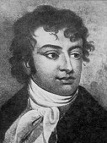





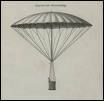




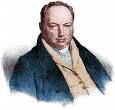

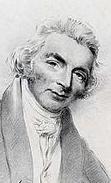

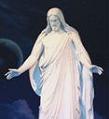

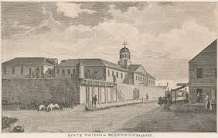
1797 On Jan. 13 the Action of Jan. 1797 sees two British frigates engage the 74-gun French line ship Droits de L'Homme from the Expedition d'Irlande for 15 hours in bad weather off the coast of Brittany until it is swept onto a sandbar and destroyed. On Jan. 14 Napoleon's 22K-man army defeats a 28K-man Austrian force led by Archduke Charles at the Battle of Rivoli, earning him the name "Little Corporal" - his fly was open? On Jan. 15 the first top hat is worn in London by John Etherington, causing him to be arrested for disturbing the peace. It's only a manly man who could? I want a perfect body I want a perfect soul? On Feb. 3 Napoleon Bonaparte (1769-1821) takes Mantua after a seige, and founds the short-lived Lombard (Cispadane) Repub., then advances toward Rome until Pope Pius VI concludes the Treaty of Tolentino with him on Feb. 19; he then crosses the Alps, marches through the Austrian Tirol (Tyrol), and comes within 80 mi. of Vienna, forcing Austria to open negotiations. On Feb. 7 Napoleon occupies the seaport of Ancona in the Marches of C Italy; after seeing that the Jews are forced to wear yellow bonnets and arm bands with the Star of David, Mr. Liberty-Equality-Fraternity gets pissed-off, and orders the practice stopped and the ghetto to be closed, after which he forms a plan to make Jews full citizens of France so that they will flock in and bring their zippety-doo-dah big bucks with them?; on Nov. 19 the Repub. of Ancona is proclaimed with French help (until Mar. 7, 1798). On Feb. 9 Whitestown, N.Y. surveyor John Young (1764-1825) purchases 15,560 acres from the Western Reserve Land Co. for $16,085, founding the city of Youngstown, Ohio in NE Ohio at the confluence of the Mahoning River and Mill Creek 65 mi. SE of Cleveland, Ohio, 61 mi. NW of Pittsburgh, Penn., and 10 mi. W of the Penn. border halfway between Chicago, Ill. and New York City (modern-day pop. 66K/555K), attracting settlers from Conn. along with Scots-Irish from Penn., followed by blacks in the early 20th cent. and Latinos in the 1950s, going on to become one of the top steel producers in the U.S. until the steep decline of the 1970s. On Feb. 10 yesterday's news Francois-Noel Babeuf is put on trial in Vendome, and on Apr. 26 he is convicted along with some of his followers, and executed on Apr. 27 (Prairial 8). On Feb. 14 a British fleet under Adm. John Jervis, 1st Earl of St. Vincent (1735-1823) and Commodore Horatio Nelson defeats a larger Spanish fleet in Portugal under vice-adm. Jose de Cordoba y Ramos de Garay (1732-1815) in the naval Battle of Cape St. Vincent. In Feb. an earthquake in Quito, Ecuador levels the city (founded in 1530), killing 41K. On Mar. 4 Mass.-born John Adams (1735-1826), AKA "the Duke of Braintree", "His Rotundity", "the Atlas of Independence", "the Colossus of Debate", "the Father of the Navy", "Bonny Johnny", "Old Sink or Swim" (from a speech he gave), "Your Superfluous Excellency" (what Ben Franklin called him when vice-pres.) becomes the 2nd U.S. pres. (until 1801) (first 1-term pres.) (first to never own slaves, the next being his son John Quincy Adams) in the 3rd U.S. Pres. Inauguration; Thomas Jefferson becomes the 2nd U.S. vice-pres., first of a string of Repub. veeps (Burr, Clinton, Gerry, Tompkins) ending with John C. Calhoun, who resigns in 1832; Adams keeps the Washington cabinet intact, unaware that three of its members look for their instructions to Federalist leader Alexander Hamilton; First Lady Abigail Smith Adams (1744-1818) likes to be called "Mrs. President"; Adams, unlike Washington doesn't keep his temper private, and throws his wig at his cabinet? On Mar. 5 the Philadelphia Aurora comments: "If ever there was a period for rejoicing, this is the moment. Every heart, in unison with freedom and happiness of the people, ought to beat high with exultation that the name of Washington ceases from this day to give currency to political iniquity and to legalize corruption." On Mar. 6 the nondenominational London Missionary Society arrives in Tahiti on the ship Duff and establishes a major station which sends missionaries to Tonga and the Marquesas. On Mar. 8 Danish-Icelandic sculptor (Albert) Bertel Thorvaldsen (1770-1844) arrives in Rome, and settles there, celebrating the date as his "Roman birthday", going on to sculpt busts of Copernicus and Gutenberg, and a Statue of the Risen Christ that the Mormons later really dig. On Apr. 13 an informer onboard HMS Sovereign at Portsmouth, England informs an officer that a mutiny over appalling working conditions is imminent, and the signal is flashed 70 mi. to London in 3 min. by George Murray's new signaling system; the Royal Navy mutinies at Spithead, and again at the Nore from May 12 to June 13. On Apr. 17 the Preliminary Peace (Treaty) of Leoben is signed in Leoben, Austria, in which Austria takes over Venetia, proclaiming the Venetian Constitution, while on June 29 Napoleon merges the Transpadane and Cispadane Repubs. with the province of Novara to form the Cisalpine Repub. (ends 1802) in Lombardy (NW Italy) (capital Milan) (with a green-white-red Italian flag, but of square shape like the Cispadane flag); on June 14 he creates the Ligurian Repub. (until 1805) in NW Italy based on the defunct Repub. of Genoa (ending the dogeship, begun 1339), with the same red cross on white background Genoese flag; Pope Pius VI is forced to surrender papal territories to the Cisalpine Repub., and when he drags his feet, the French prepare to march on Rome again; in May Napoleon abolishes the Repub. of Venice., turning Venice into a museum-like backwater. In May at her hubby's urging Abigail Adams leaves the farm for Philly to be the brains of his admin.? On June 7 after suffering for years and sending negotiators, the U.S. Senate approves the Treaty of Tripoli, negotiated by Freethinking U.S. envoy (friend of Thomas Paine) Joel Barlow (1754-1812), whose English trans. contains nonexistent Article 11: "As the government of the United States of America is not, in any sense, founded on the Christian religion; as it has in itself no character of enmity against the laws, religion, or tranquility of Musselmen; and, as the said States never entered into any war, or act of hostility against any Mahometan nation, it is declared by the parties, that no pretext arising from religion opinions shall ever produce an interruption of the harmony existing between the two countries"; the first example of Islam history ignoramus Americans bowing to Islamic Sharia, disavowing knowledge of their own Christian foundations to appease madass Muslims?; in his June 4, 2009 speech in Cairo, Pres. Obama cites it to justify calling the U.S. a nation of Muslims, not realizing that the Barbary pirates demanded and got a giant jizya bribe to stop, their emissary quoting the Quran that all nations not acknowledging Sharia were sinners and that it was their right and duty to make war upon them and make slaves of all Yankee infidel prisoners they took, and that George Washington uttered the soundbyte "Would to Heaven we have a navy to reform those enemies to mankind or crush them into nonexistence"; too bad, they consider the bribes an ongoing thing and keep demanding more until the refusal of a $225K bribe causes them to declare war on the U.S. in May 1801. On June 17 after eunuch Agha Mohammad Khan (b. 1742) is assassinated in Shusha by his servants for threatening to behead them for eating a slice of melon, his oversexed nephew Baba Khan (known for having 700 wives) becomes Persian Qajar shah #2 Fath (Fat'h) Ali Shah Qajar (1771-1834) (until Oct. 23, 1834), going on to preside over a resurgence of Persian arts while sporting a cool black beard, reading the entire 18-vol. 3rd ed. of the Encyclopaedia Britannica and titling himself "Most Formidable Lord and Master of the Encyclopaedia Britannica"; he assigns his son Abbas Mirza to fight the pesky Russians for the next 30 years, which proves a losing effort. In the spring the merchant ship Rajah, out of Salem, Mass. returns to New York with a cargo of "wrinkled blackberries" (peppercorns) from Sumatra, pepping-up the Salem-based spice trade (until 1856). On July 8, 1797 U.S. Dem.-Repub. Tenn. Sen. (since Aug. 2, 1796) William Blount (1749-1800), gov. of the Southwest Territory in 1790-6, founder of Knoxville, Tenn. becomes the first U.S. senator impeached by the House after he is caught in Blount's Conspiracy with Britain to wrest New Orleans and the Floridas from Spain without informing his own govt., and charged with a "high misdemeanor entirely inconsistent with his public trust and duty"; after he is expelled from the Senate, his trial is postponed until 1798, and charges dismissed in 1799 because he is no longer a member, and because many argue that the Constitution doesn't allow impeachment of members of Congress, only expulsion, and he becomes the last (until ?); he becomes a state sen. in Tenn. and rides it out until his sudden death on Mar. 21, 1800 in Knoxville. On July 17 Ferdinand von Hompesch zu Bolheim (1744-1805) becomes Knights of Malta grandmaster #71 until July 6, 1799 (first German); he bestows the title of Citta Beland (his mother's surname) on the town of Zejtun (Arab. "olive")(formerly Casal Santa Caterina) in SE Malta (modern-day pop. 11K); too bad, he disregards warnings and fails to take action against an invasion prior to the French invasion next June 6. On July 22-25 British Adm. Horatio Nelson leads a brash attack on Spanish-held Santa Cruz de Tenerife in the Canary Islands, and on July 24 loses his right arm to go with his lost right eye. Living la vida loca? French gets embarrassed? On Sept. 4 the Coup of 18 Fructidor, led by Paul Francois Jean Nicolas, Vicomte de Barras (1755-1829) ousts the more conservative members from the French Directory, and begins the Directorial Terror (ends 1798), with Paris run by the Triumvirs (Barras, La-Revelliere-Lepeaux, Reubell); Carnot and Barthelemy are deported; press freedom is squelched, right-wing newspapers closed on Sept. 30, and a stamp tax on the press instituted on Oct. 4. On Sept. 18 the British occupy Trinidad, changing the name of the main city to Port of Spain. On Sept. 20 the U.S.S. Constitution, a wooden square-rigger, nicknamed "Old Ironsides" is launched in Boston, Mass., becoming one of the first fighting ships built for the new U.S. Navy as ordered by Pres. Adams; it is retired in 1830. On Sept. 30 the Bankruptcy of the Two-Thirds (Consolidated Third) suspends two-thirds of the French nat. debt. - voila? In Sept. exiled Swiss leaders urge the Directory to liberate Switzerland from the aristocratic canton govt. In Sept. Napoleon frees the Marquis de Lafayette from Austrian confinement at Olmutz (Olomouc), Moravia. On Oct. 11 a British fleet under Scottish-born Adm. Adam Duncan, Viscount Duncan of Camperdown (1731-1804) defeats a Dutch fleet under Adm. Jan Willem De Winter (1750-1812) in the service of France off the sandy hillocks of Camperdown in N Holland (N of Haarlem). Napoleon reorganizes Germany in order to control it, backfiring as Germany arises all the stronger and more unified when he falls? On Oct. 18 Count Johann Ludwig Joseph von Cobenzl (1753-1809) of Austria and Gen. Napoleon Bonaparte of France sign the Treaty of Campoformio in the village of Campoformio (Campoformido) in N Italy, giving the duchy of Milan in Lombardy and the Austrian Netherlands (Belgium) to France, in return giving Austria most of the territories of the defunct Repub. of Venice incl. the city of Venice, Venetian Istia, and Dalmatia (which becomes a crownland) (until 1805); it also secretly cedes the left bank of the Rhine River from Basel to Andernach to France, thus advancing its boundary to the Rhine and wiping out 112 German states lying W of it; the larger German states (Prussia, Bavaria, etc.) which lose territories are compensated by cessions of land in other parts of Germany, being encouraged at the same time to absorb the 1.5K "knights of the empire" (petty principalities averaging less than 3 sq. mi. each) within their borders; the 250 petty ecclesiastical states, many less than 12 sq. mi. in area are absorbed and disappear, and the number of states which survive is reduced to about 50; the political geography of Germany is simplified, and German nat. feeling begins to rise; Napoleon returns to Paris and is appointed to command forces invading England. The first human parachute jump? On Oct. 22 after experimenting with animals, Andre (André) Jacques Garnerin (1769-1823) parachutes from 3.2K ft. over Monceau Park in Paris in a 23-ft. diam. parachute made of white canvas with 36 ribs in an umbrella configuration, and a basket at the bottom; in 1799 his wife Jeanne Genevieve Garnerin becomes the first woman to try a parachute jump. On Nov. 16 Prussian king (since 1786) Frederick William II (b. 1744) dies, leaving the country bankrupt, and his semi-enlightened son Frederick William III (1770-1840) (whose portrait bears a striking resemblance to Hollywood actor Vincent Price (1911-93)?) becomes king of Prussia (until June 7, 1840), while his wet-dream wife becomes Queen Louise of Mecklenburg-Strelitz (1776-1810); the new king goes on to reform the abuses his father, cut expenses, and steer a neutrality policy in the Napoleonic Wars until 1806. In Nov. Big Man Napoleon returns to France, and begins planning a bold attack to dismantle Britain's colonial empire starting with Egypt - so he can find the Lost Ark and gain its power? Franco-American relations tank this year over a pile of shit in a silk stocking and the XYZ Affair? Talleyrand sends three French agents to Charles Cotesworth Pinckney to demand a bribe and a loan to France as conditions for meeting the Directory, who will only deal with Gerry (a Republican), causing the other two to return to the U.S. and spill the beans, masking the real names and releasing the XYZ orrespondence, sparking outrage; the slogan, "Millions for defense but not one cent for tribute", a toast in honor of John Marshall offered by S.C. Rep. Robert Goodloe Harper (1765-1825) becomes popular, and Marshall rides the popularity into the U.S. House of Reps. in 1799; Federalist majorities are elected to Congress, eager for an undeclared naval war with France; meanwhile John Adams grimly struggles to keep the U.S. out of war with big bad Napoleon, while his supposed friend Jefferson plays party politics and refuses to compromise, hoping to bring down both him and his Federalist Party. King (since 1789) Agonglo dies, and his son Adandozan (-1818) becomes king of Dahomey in W Africa (until 1818), with a regent ruling until 1804, going power-mad and throwing subjects to pet hyenas and slitting women's wombs and other nasty jazz. Denmark begins a policy of armed neutrality to protect its convoys from privateers, pissing-off Britain and France. The Ionian Islands are taken over from Venice by the French (until 1809). York (later Toronto), Ontario succeeds Niagara-on-the-Lake as capital of Upper Canada. Starting this year U.S. ships begin trading with Japan on behalf of the Dutch (until 1809). Andreas Hofer (1767-1810), an innkeeper near Meran becomes the leader of the peasant resistance in the Austrian Tyrol against Napoleon. French historian-politician Constantin Francois Chasseboeuf, Comte de Volney (1757-1820), famous for questioning the historicity of Jesus visits the U.S., and is accused by the Adams admin. of being a French spy trying to get La. reoccupied by France, forcing him to return to France next year. Italian hyperpolyglot priest Giuseppe Caspar Mezzofanti (1774-1849) is appointed prof. of Arabic at the U. of Bologna, but is fired after refusing to take an oath of allegiance to the Cisalpine Repub. The city of Baltimore, Md. (founded 1729) (modern-day pop. 620K/2.2M 1M) on Chesapeake Bay is incorporated, becoming the 2nd largest seaport in the Mid-Atlantic; its Inner Harbor becomes the #2 part for immigrants to the U.S.; in 1876 Johns Hopkins U. is founded there, followed in 1889 by Johns Hopkins Hospital; it goes on to have more public statues and monuments per capita than any U.S. City. famous residents incl. Edgar Allan Poe, Frederick Douglass, W.E.B. Du Bois, Ogden Nash, Gertrude Stein, F. Scott Fitzgerald, Dashiell Hammett, Upton Sinclair, H.L. Mencken, Edith Hamilton, Eubie Blake, Billie Holliday, Cab Calloway, Frank Zappa, John Waters, Barry Levinson, Babe Ruth, Michael Phelps, Thurgood Marshall, Nancy Pelosi, and Ben Carson. The city of Urbana, Ohio, 45 mi. W of Columbus is first settled. The bronze horses that once adorned the trimphal arch of Nero at Rome are carried by Napoleon from Venice to Paris; they are returned in 1815. Ludovico Manin becomes the last doge of Venice, Italy. John Quincy Adams (b. 1767) marries Louisa Catherine Johnson (1775-1852); they have 3 sons and 1 daughter. German adventurer Friedrich Konrad Hornemann (1772-1801) explores the caravan routes of the Sahara. England begins to export iron. The first copper pennies are minted in England, and the first 1-pound notes issued. The manufacture of window glass begins in Pittsburgh, Penn., spurring industrial growth. The Reynolds Affair sees Alexander Hamilton accused by James Monroe et al. of bribing James Reynolds to coverup financial misconduct during his tenure as U.S. treasury secy., causing Hamilton to admit that he paid blackmail payments over Reynolds' wife Maria; a duel between Monroe and Hamilton is stopped by Aaron Burr - save him for me, Jim? Retired pres. George Washington establishes one of the largest whiskey distilleries in the U.S., producing 11K gal. a year. William Gifford (1756-1826) and George Canning (under-secy. for foreign affairs) found the weekly Anti-Jacobin, supporting William Pitt the Younger's govt. English poet William Wordsworth and his sister Dorothy Wordsworth move from Racedown, Dorsetshire to Alfoxden, Somersetshire to be near poet Samuel Taylor Coleridge in Nether Stowey. Child prodigy artist Jean Auguste Dominique Ingres (1780-1867) goes to Paris to study at the Academy with Jacques-Louis David. German Romantic poet August Wilhelm von Schlegel (1767-1845) begins translating Shakespeare into German - like translating a silk purse into a sow's ear? British army officer (pioneer of the Australian wool industry) John Macarthur (1767-1834) introduces Merino sheep from Spain to Australia, where they go on to pass the Spanish breed in the quality of their wool - for those long lonely nights? Thomas Jefferson gives a scientific lecture on a "sloth" which later turns out to be a feline; sloths are cold-blooded, see... Napoleon orders a lavish meal at the Krone Inn in Soleure, Switzerland, then drinks a glass of water and skips out, later receiving a bill for 1,417 Swiss francs. Architecture: Newgate Prison opens in Greenwich Village, N.Y. at West 10th St. on the Hudson River near the Chistopher St. Pier, designed by French-born architect Joseph-Francois Mangin (1758-?), who later helps design New York City Hall; warden #1 (until 1801) is Quaker prison reformer Thomas Eddy (1758-1827), who starts out trying provide a humanitarian place for rehabiliation and watches it degenerate into an overcrowded disease-filled violent hellhole, with 817 inmates by 1821 in a bldg. designed for 432; since it's N of New York City, sentencing to it is called being "sent up the river", which carries over to Sing Sing; it closes in 1829. Inventions: On Mar. 8 Nathaniel Briggs of N.H. patents the first clothes washing machine, a washboard - named George? Janet Keiller of Dundee, Scotland invents orange marmalade after a Spanish ship carrying Seville oranges takes refuge in the harbor and they get a little unfresh and have to be unloaded quick, causing Dundee to become known as the city of jute, jam, and journalism. Henry Maudslay (1771-1831), an apprentice of Joseph Braham of England invents the carriage lathe, going on to become the father of machine tool technology. Charles Newbold of Burlington, N.J. patents the cast-iron plow. Etienne-Gaspard Robert of France invents the Phantasmagoria (Gr. "fantasma" + "agora" = ghost + public meeting place), a machine for projecting moving images; too bad, after he begins showing victims of the Reign of Terror, the police shut him down. Science: German astronomer Heinrich Wilhelm Matthias Olbers (1758-1840) pub. his method for calculating comet orbits. French chemist Louis Nicolas Vauquelin (1763-1829) discovers the metallic element chromium (Cr) (#24), named after the colorful flames made by its compounds. The duck-billed platypus is discovered near Sydney, Australia. Nonfiction: Thomas Bewick (1753-1828), British Birds (1797-1804). George Chalmers (1742-1825), Apology for the Believers in the Shakespearean Papers; Supplemental Apology; vain attempt to rescue Samuel Ireland's rep. Francois Rene de Chateaubriand (1768-1848), Essai Historique, Politique, et Moral sur les Revolutions; his analysis of the causes of the French Rev.; a dud. Johann Gottlieb Fichte (1762-1814), Foundations of Natural Right (Grundlagen des Naturrechts nach Prinzipien der Wissenschaftslehre); argues that self-consciousness is a social phenomenon, requiring the existence of other rational subjects, who summon the self out of its unconsciousness into an awareness of itself as a free individual, creating a "relation of right", meaning that each conscious agent should retain their own "sphere of freedom" in which they are free from outside forces. Arnold Heeren (1760-1842), Geschichte des Studiums der Klassizschen Litteratur seit dem Wideraufleben der Wissenschaften (2 vols.) (1797, 1802). Samuel Ireland, A Picturesque Tour on the Wye; flops because of his notoriety over the Vortigern affair. Immanuel Kant (1724-1804), The Metaphysics of Morals (Die Metaphysik der Sitten); divided into the Doctrine (Science) of Right (Metaphysical Elements of Justice) and the Doctrine of Virtue, promoting classical republicanism in political philosophy. Joseph-Louis Lagrange (1736-1813), Theorie des Fonctions Analytiques. John Robison (1739-1805), Proofs of a Conspiracy Against All the Religions and Governments of Europe, Carried On in the Secret Meetings of Free Masons, Illuminati, and Reading Societies, Collected from Good Authorities; prof. of natural philosophy at Edinburgh U. blames the French Rev. on the secret Masonic cell known as the Illuminati, run by Adam Weishaupt, which infiltrated the Freemasons; an internat. bestseller ramping up Illuminati conspiracy theorists till modern times. Asher Benjamin (1773-1845), The Country Builder's Assistant (first Am. architectural handbook); first of a series of handbooks for house builders, combining drawings and advice with historical insight, seducing Am. taste from Federal style to Greek Revival, with graceful proportions, fluted pilasters, fanlights over doorways, and decorative fretwork and guilloches, becoming a hit in New England until the U.S. Civil War, and spreading to the Am. Midwest and South, creating the Late Colonial Architectural Style; followed by "The American Builder's Companion" (w/Daniel Raynerd) (1806), "The Rudiments of Architecture" (1814), "The Architect; or, Practical House Carpenter" (1830), "The Practice of Architecture" (1833), "The Builder's Guide" (1838), and "The Elements of Architecture" (1843). Thomas Paine (1737-1809), Agrarian Justice; claims that all people have an equal right to land, pissing-off the propertied class, forcing him to return to the U.S. in 1802. Nicolas de Saussure (1767-1845), Recherches Chimiques sur la Vegetation; shows that the increase in weight of a plant as it grows is due to water as well as CO2 uptake. Friedrich von Schelling (1775-1854), Ideen zu einer Philosophie der Natur; The World Soul (1797-99). Robert Southey (1774-1843), Letters Written During a Short Residence in Spain and Portugal. Wilhelm Heinrich Wackenroder (1773-98)(1773-98), Outpourings of a Monk (Herzensergiessungen eines Kunstliebenden Klosterbruders) - the original Run, Girl? William Wilberforce (1759-1833), Practical View of the Religious System. Juan Yuan, Dictionary of Old Literature. Music: Francois-Adrien Boieldieu (1775-1834), La Famille Suisse (comic opera) (Paris). Luigi Cherubini (1760-1842), Medea (Médée) (opera comique) (Mar. 13) (Theatre Feydeau, Paris); libretto by Francois-Benoit Hoffmann (Nicolas Etienne Framery); based on Euripides' tragedy, and Pierre Corneille's play; his masterpiece, although it gets a lukewarm reception until it is revived in Florence in 1953 by Maria Callas. Franz Joseph Haydn (1732-1809), The Emperor Quartet. Art: Francisco de Goya (1746-1828), The Caprices (Los Caprichos) (1797-9); mock the social mores and superstitions of his day. J.M.W. Turner (1775-1851), Millbank, Moon Light. Plays: George Colman the Younger (1762-1836)), The Heir at Law (comedy) (Little Theatre, Haymarket, London) (July 15) (27 perf.); pompous Dr. Pangloss, L.L.D. and A.S.S. (John Fawcett) (borrowed from Voltaire's 1759 "Candide") is hired at 300 pounds/year to tutor merchant Daniel Dowlas, Lord Duberly (Richard Suett); "Lend me your ears. Shakespeare. Hem!"; "Verbum sat. Horace. Hem!"; debuts at the Park Theatre in New York in Apr. 1799; becomes a favorite role of comedian Joseph Jefferson. Ugo Foscolo (1778-1827), Tieste (tragedy). August von Kotzebue (1761-1819), Complete Plays (28 vols.) (1797-1823); 98 of his 200+ plays; 2nd ed. (44 vols.), 1827-9; 3rd ed. (10 vols.), 1868. Poetry: William Blake (1757-1827), Vala, or The Four Zoas (unfinished). Robert Burns (1759-97), Collected Poems (posth.); pub. by Scottish physician James Currie (1756-1805) to benefit his widow and children, but he zings Robbie by painting him as a drunken reprobate? Samuel Taylor Coleridge (1772-1834), Kubla Khan (pub. in 1816); The Rime of the Ancient Mariner; "He prayeth best who loveth best all things great and small"; "For all averred, I had killed the bird that made the breeze to blow". George Colman the Younger (1762-1836), My Night Gown and Slippers; repub. as "Broad Grins" in 1802. Johann Wolfgang von Goethe (1749-1832), Hermann und Dorothea (pastoral). Friedrich Holderlin (Hölderlin) (1770-1843), Hyperion (2 vols.) (1797-9). William Smyth (1765-1849), English Lyrics; goes through 5 eds. despite Thomas Moore accusing him of plagiarism. Robert Southey (1774-1843), English Ecologues; Poems (1797-9). Novels: Jean Paul (1763-1825), Flower, Fruit and Thorn Pieces; or, the Married Life, Death and Wedding of Siebenkas, Poor Man's Lawyer; The Valley of Campan (Das Kampaner Tal). Marquis de Sade (1740-1814), Juliette; pub. anon.; Justine's nympho murderer sister. The Italian, or the Confessional of the Black Penitents. Robert Southey (1774-1843), Icelandic Poetry; or The Edda of Saemund. Ludwig Tieck (1773-1853), Volksmarchen von Peter Lebrecht (3 vols.). Births: Am. atty. (Rose Law firm co-founder) Robert Crittenden (d. 1834) on Jan. 1 in Versailles, Ky. Am. journalist (founder of the "Richmond Whig") John Hampden Pleasants (d. 1846) on Jan. 4 in Goochland County, Va.; youngest son of James Pleasants Jr. (1769-1836); educated at the College of William and Mary. Austrian Romantic composer Franz Seraph Peter Schubert (d. 1828) on Jan. 31 in the House of the Red Crab (Crayfish) in Vienna; descended from Moravian peasantry; 12th of 14 children of parish schoolmaster Franz Theodor Florian and Elisabet Katherina Vietz, only five of which live beyond infancy. French mathematician Jean-Marie Constant Duhamel (d. 1872) on Feb. 5 in Saint-Malo. Irish "Handy Andy" artist-novelist-song writer Samuel Lover (d. 1868) on Feb. 24 in Dublin. Am. educator Mary Mason Lyon (d. 1849) on Feb. 28 in Buckland, Mass.; founder (1837) of Mount Holyoke College. French mathematician Joseph Alphonse Adhemar (Adhémar) (d. 1862) on Feb. ? in Paris. Am. abolitionist-politician-philanthropist Gerrit Smith (d. 1874) on Mar. 6 in Utica, N.Y.; son of Peter Smith, partner of John Jacob Astor and founder of Petersboro, N.Y.; grandson of John Livingston. German Prussian king (1861-88) and emperor (kaiser) #1 (1871-88) Wilhelm (William) I (the Great) (Wilhelm Friedrich Ludwig) (d. 1888) on Mar. 22 in Berlin; 2nd son of Frederick William III (1770-1840) and Louise Auguste Wilhelmine Amalie of Mecklenburg-Strelitz (1776-1810); father of Frederick III (1831-88); grandfather of Wilhelm II (1859-1941); given a poor education since he wasn't expected to be king. French "Cinq-Mars" Romantic poet-dramatist-novelist ("Founder of the French Historical Novel") Alfred Victor, Comte de Vigny (d. 1863) on Mar. 27 in Loches. Am. Mormon leader Joseph Young (d. 1881) on Apr. 7 in Hopkinton, Mass.; brother of Phineas Young (1799-1879) and Brigham Young (1801-77). French statesman-historian and pres. (1871-3) Louis Adolphe Thiers (d. 1877) on Apr. 16 in Marseille; only French pres. born in the 18th cent. Am. locksmith Linus Yale Sr. (d. 1858) on Apr. 27 in Middletown, Conn.; father of Linus Yale Jr. (1821-68). French painter Hippolyte "Paul" Delaroche (d. 1856) on July 17 in Paris; studies with Baron Antoine Gros, and ends up half-classic and half-Romantic? French journalist-historian Amedee Simon Dominique Thierry (d. 1873) on Aug. 2 in Blois; brother of Augustin Thierry (1795-1856). French Navier-Stokes Equatins mathematician Adhemar (Adhémar) Jean Claude Barre (Barré) de Saint-Venant (d. 1886) on Aug. 23 in Villiers-en-Biere, Siene-et-Marne. Am. botanist Edwin P. James (d. 1861) on Aug. 27 in Weybridge, Vt. Peruvian pres. (1844, 1845-51, 1855-62, 1863) Ramon Castilla y Marquesado (d. 1867) on Aug. 31 in Tarapaca. Am. astronomer James Ferguson (d. 1867) on Aug. 31 in Scotland. English "Frankenstein" writer Mary Wollstonecraft Shelley (nee Godwin) (d. 1851) on Aug. 30 in London; daughter of Mary Wollstonecraft (1759-97) and William Godwin (1756-1836); mother dies on Sept. 10 from puerperal fever. Swedish chemist Carl Gustav Mosander (d. 1858) on Sept. 10 in Kalmar. Italian Tuscan grand duke (last) (1824-59) Leopold II (d. 1870) on Oct. 3 in Florence; son of Ferdinand II; father of Ferdinand IV (1835-1908). Swiss novelist Jeremias Gotthelf (Albert Bitzius) (d. 1854) on Oct. 4 in Murten; educated at the U. of Gottingen. Am. Whale Ship Essex seaman-writer Owen Chase (d. 1869) on Oct. 7 in Nantucket, Mass.; inspiration for Herman Melville's "Moby Dick". German poet-writer Wilhelm Mueller (Müller) (d. 1827) on Oct. 7 in Dessau; educated at the U. of Berlin; father of Max Mueller (1823-1900); grandfather of Wilhelm Max Mueller (1862-1919); Franz Schubert makes him famous by setting his poetry to music. Scottish poet-antiquary-journalist William Motherwell (d. 1835) on Oct. 13 in Glasgow. English lt. Gen. (namesake of the Cardigan sweater) James Thomas Brudenell, 7th Earl of Cardigan (d. 1868) on Oct. 16 in Hambleden, Buckinghamshire; educated at Harrow School, and Christ Church, Oxford U.; leader of the Charge of the Light Brigade in 1854. Italian #1 soprano Giuditta Angiola Maria Constanza Pasta (nee Negri) (d. 1865) on Oct. 26 in Saronno. Scottish uniformitarian (anti-catastrophist) geologist Sir Charles Lyell, 1st Baronet (d. 1875) on Nov. 14 in Kinnordy, Forfarshire; educated at Exeter College, Oxford U. Am. political boss Thurlow Tweed (d. 1882) on Nov. 15 in Cairo, N.Y. - Boss Weed? English banker mayor of London (1855) (first Jew) David Salomons, 1st Baronet 9d. 1873) on Nov. 22 in London; Leyden-born mother; co-founder of the London and Westminster Bank. Italian "Lucia di Lammermoor" composer Domenico Gaetano Maria Donizetti (d. 1848) on Nov. 29 in Bergamo, Lombardy; student of Simon Mary. German handsome (cool hair, eyebrows, mustache and goatee) Romantic-turned-Young-Germany "Du Bust Wie Eine Blume", "Die Zwei Grenadier", "Die Lorelei" poet-critic-essayist (Jewish) Christian Johann Heinrich "Harry" Heine (d. 1856) on Dec. 13 in Dusseldorf; nephew of Hamburg banker Solomon Heine; educated at the U. of Bonn and U. of Gottingen; his whole life is a losing struggle to reconcile a Jewish background with a desire to be German? Am. physicist-inventor ("the Benjamin Franklin of the 19th Cent.") Joseph Henry (d. 1878) on Dec. 17 in Albany, N.Y; educated at the Albany Academy; dir. #1 of the Smithsonian Inst. (1846). Spanish "La Gaviota" novelist (female) Fernan (Fernán) Caballero (Cecilia Francisco Joseia Bohl von Faber) (d. 1877) on Dec. 24 in Morges, Switzerland; educated in Germany; founder of the modern Spanish novel. Am. Calvinish Presbyterian theologian Charles Hodge (d. 1878) on Dec. 27; of Scottish descent; educated at Princeton U. Hawaiian 6'0" king #2 (1819-24) Kamehameha II (Liholiho) (d. 1824) in Hilo; eldest son of Kamehameha I and Keopuolani. Welsh poet John Blackwell (AKA Alun) (d. 1840) near Yr Wyddgrug, Flintshire. German "The Spiritual Year", "The Jew's Beech" novelist-poet Annette von Droste-Hulshoff (Droste-Hülshoff) (d. 1848) in Hulshoff (near Munster). British hydrotherapy promoter Capt. Richard Tappin "R.T." Claridge (d. 1857) in Farnborough, Warwickshire. Japanese woodblock color print (ukiyo-e) artist Ando (Ichiyusai) Hiroshige (d. 1858) in Edo. English scientist Capt. Henry Piddington (d. 1858); coiner of the term "cyclone". Russian Northern Caucausus Islamist leader Imam Shamil (Shamyl) (Shameel) (Schamil) (Schamyl) (d. 1871) in Gimry, Dagestan. Am. abolitionist preacher (black) Sojourner Truth (Isabella Bonfry or Baumfree) (d. 1883) Swartekill, Ulster County, N.Y.; born a slave; ends up with a Dutch accent. Deaths: British field marshal Baron Jeffrey Amherst (b. 1717) on Aug. 3 in Sevenoaks, Kent. English statesman-writer Horace Walpole (b. 1717) on Mar. 2 in Berkeley Square, London; leaves a giant pile of Letters, mainly to Mann, which Lord Byron (1788-1824) calls incomparable, and Croker claims are a "perfect encyclopedia of information from the very best sources": "The whole secret of life is to be interested in one thing profoundly and in a thousand things well." French dramatist Michel-Jean Sedaine (b. 1719) on May 17. German self-inflating anecdotist Baron von Munchausen (b. 1720). Austrian field marshal Dagobert Sigmund von Wurmser (b. 1724) on Aug. 22 in Vienna. English radical political reformer John Wilkes (b. 1725) on Dec. 26. Scottish uniformitarian geologist James Hutton (b. 1726) on Mar. 26. Am. Rev. War brig. gen. (DOI signer) Oliver Wolcott (b. 1726) on Dec. 1 in Conn. Canadian-born French gen. Charles Deschamps de Boishebert et de Raffetot (b. 1727) on Jan. 9 in Raffetot. Russian educator Ivan Shuvalov (b. 1727) on Nov. 14 in St. Petersburg. Swiss physician Samuel Auguste Tissot (b. 1728). Irish-born British statesman-writer Edmund Burke (b. 1729) on July 9 in Beaconsfield: "The only thing necessary for the triumph of evil is for good men to do nothing"; "Nothing is so fatal to religion as indifference, which is, at least, half infidelity"; "A very great part of the mischiefs that vex this world arises from words"; "When bad men combine, the good must associate; else they will fall one by one, an unpitied sacrifice in a contemptible struggle." Am. Rev. leader and judge James Duane (b. 1733) on Feb. 1 in Schenectady, N.Y. English bone china inventor Josiah Spode Sr. (b. 1733). Am. statesman (DOI signer) Francis Lightfoot Lee (b. 1734) on Jan. 11 in Richmond County, Va. French explorer Adm. Yves Joseph de Kerguelen-Tremarec (b. 1734) on Mar. 3 in Brest. English painter Joseph Wright (b. 1734) on Aug. 29 in Derby. Am. Rev. patriot (DOI signer) Carter Braxton (b. 1736) on Oct. 10 in Richmond, Va.; namesake of Braxton County, W. Va. Prussian king (1786-97) Frederick William II (b. 1744) on Nov. 16 in Potsdam. Spanish explorer Juan Manuel de Ayala (b. 1745) on Dec. 30. Nigerian-born British anti-slavery activist Olaudah Equiano (b. 1745) on Mar. 31 in London. English "Hannibal Crossing the Alps" painter John Robert Cozens (b. 1752) on Dec. 14. English author Mary Wollstonecraft Godwin (b. 1759) on Sept. 10 (puerperal fever). French socialist rev. leader Francois-Noel Babeuf (b. 1760) on Apr. 27 in Vendome (executed). French Gen. (Army of the Rhine cmdr.) Lazare Hoche (b. 1768) on Sept. 19 near the Rhine River (TB).
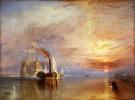
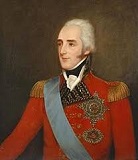









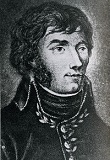



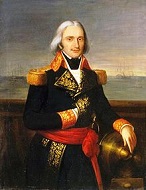
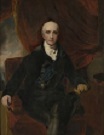
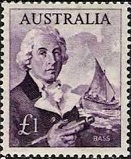



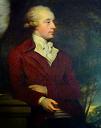







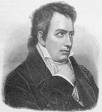



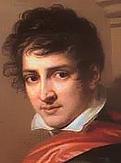
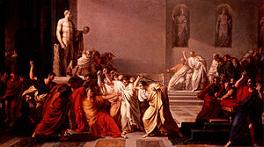


1798 On Jan. 11 king (since 1744) Erekle II (b. 1720) dies, and on Jan. 12 his son George (Georgi) XII (1746-1800) becomes the last Bagrationi king of moribund Kakheti and Kartli in E Georgia, trying in vain to get protection from Persia by appealing to Russia, who wants to gobble it up too. In Jan. France invades Switzerland, and on Mar. 28 proclaims the Helvetic (Helvetian) Repub. (ends 1803) in Bern, followed by the Lemanic Repub. (ends 1803) in Geneva (Vaud) - standing on the rooftops, everybody scream your heart out? On Feb. 10 French troops under Gen. Louis Alexandre Berthier (1753-1815) occupy the Vatican State, and on Feb. 15 declare the Roman (Tiberina) Repub. (until 1800) (with the blue strip in the French flag replaced by a black one), demanding that Pope Pius VI renounce his temporal sovereigny, but he says stuff it and flees, is captured and taken to Siena in Tuscany, and later to Valence, France, pissing off fellow Italian King Ferdinand IV of Naples (Sicily) (1751-1825), who declares war on France. In Jan. the 2K-seat Park (New) Theatre opens at 21-25 Chatham St. (later called Park Row) in Manhattan, N.Y., bringing theater back to Broadway, enjoy a monopoly but failing to make enough profit, causing it to be sold in 1805 to Stephen Price and Edmund Simpson (1784-1848), who create a star system with imported English talent, concentrating on English drama and Italian opera and gaining an upper-class audience until competition from the Chatham Garden and Bowery in the 1820s cause it to switch to Blackface acts and melodrama; it is demolished on Dec. 16, 1848 after a fire. The not so soft goodbye in Fireland? On Feb. 19 the unsuccessful 1798 Irish (United Irishmen) Ruction (Rebellion) (excuse me?), led by the Society of United Irishmen and modeled on the French Rev. starts in Leinster, then spreads, with a rising of poorly-armed peasants in Wexford; British redcoats aided by Hessian mercentaries defeat them on June 21 in the Battle of Vinegar Hill; on May 24 (1:00 a.m.) the Battle of Ballymore-Eustace in Ballymore Eustace in County Kildare, Ireland near the Kildare-Wicklow border starts with a surprise-attack by 500 United Irish rebels on a 50-man loyalist militia led by Capt. Beevor is turned around in two hours, with 100 rebels KIA vs. 12 militia KIA and five wounded; on May 26, 1798 the Dunlavin Green Executions see 36 rebel POWs summarily executed in County Wicklow by the British via firing squad for fear of a possible rebel attack; meanwhile on Aug. 22 a French force of 1,070 under United Irishmen leader Gen. Jean Joseph Amable Humbert (1767-1823) lands in Kilcummin in Killala Bay on the W coast to help them; on Aug. 27 the Battle of Castlebar (Castlebar Races) sees a 2K-man combined French-Irish force under Gen. Humbert defeat a 6K-man British force under Gerard Lake, after which Gen. Humbert proclaims the Repub. of Connacht, with John Moore (1763-99) (descendant of St. Thomas More) as pres. #1; too bad, Humbert arrives too late, and on Sept. 8 26K British forces arrive, decisively defeating the 2,350 rebels at the Battle of Ballinamuck, with 500 rebels KIA, 1,144 captured, and 200 executed vs. 12 British KIA and 16 wounded, and the rebellion is quashed by Sept. 24;Moore is captured in Castlebar by Lt.-Col. Crawford, and after "lenity" by Lord Cornwallis he is sentenced to transportation to New Geneva, dying in Waterford, where he is buried in Ballygunner Temple, his grave rediscovered in 1960, and his remains exhumed and returned to Castlebar on Aug. 12, 1961, where a state funeral is held attended by Pres. Eamon de Valera; the gaseous nature of the revolt causes the word "ruction" to be coined; British secy. for Ireland (since 1797) Robert Stewart, Viscount Castlereagh (1769-1822) (an Ulster Protestant) offers clemency to commoners supporting the ruction, and focuses on punishing the leaders; after the English stop an Irish attempt to seize Dublin, all of Ireland becomes an English garrison run from Dublin Castle, while the Irish pop. is at the mercy of a debauched landlord class with the power of judge, jury, and executioner or transporter of the "tenants", sending hundreds, incl. Presbyterian ministers and professionals without trial or charges to life imprisonment in Australia, where the "rebels of 1798" face inhuman conditions and vicious flogging, all the more because of their intelligence?; the lucky ones begin emigrating to Canada; Irish PM (since 1782) (a liberal Protestant with Catholic sympathies) John Philpot Curran (1750-1817) vigorously defends Society of United Irishmen founder Archibald Hamilton Rowan and other ruction leaders, gaining a good rep., ending with the defense of Napper Tandy in 1800; meanwhile British PM Pitt sees the ruction as proof of the need for a union of the two countries - some sneak to New Orleans to drink Hand Grenades? On Mar. 17 (St. Patrick's Day) a failed slave uprising on Montserrat results in the Caribbean island becoming the only country other than Ireland to celebrate St. Patrick's Day after slavery is abolished in 1834. On May 1 Charles County, Md.-born Benjamin Stoddert (1751-1813) becomes U.S. Navy secy. #1 (until Mar. 31, 1801). On May 11 the bloodless Coup (Law) of 22 Floreal in France challenges the returns of several elections and excludes approx. 25% of the candidates. On May 18 Richard Colley Wellesley, 1st Marquis Wellesley (1760-1842) (brother of the Duke of Wellington) becomes gov.-gen. of India (until July 30, 1805). On May 19-20 the French Invasion of Egypt (ends 1801), Napoleon's most romantic adventure begins after he reconnoiters a British force under Commodore Horatio Nelson that was scattered by a storm, and his dismasted flagship HMS Vanguard secretly sails for Egypt from Toulon with 38K men, incl. a boatload of 167 savants (scientists and mathematicians) (Monge, Berthollet, Fourier), incl. Orientalists from his new Institut d'Egypt (which settles in Cairo on Aug. 22) in a fleet of 300 transport ships, 13 ships of the line and seven frigates (28K men), with vague grandiose plans of conquering all of the East like Alexander the Great, starting with the Ottoman Empire, cutting off British access to India; on June 6 they arrive at Malta, and after being refused entrance of more than two ships at a time and enjoying inside help from the Maltese, take it by June 12, expelling the 322 Knights of Malta (St. John) (Hospitallers) (whose French members wouldn't fight French troops) still defending it under grandmaster Ferdinand von Hompesch, who leaves for Trieste on June 18, and resigns next July 6; Nappy frees 2K Muslim slaves, and abolishes all religious orders on the island, and writes to the Bey of Tunis to boast of his favor to Islam, then reforms their govt. and steals their library and treasures (pissing-off Tsar Paul I, who is also a grandmaster, and was trying to finagle the first Russian warm water port there); on July 1 after slipping by Nelson's clueless fleet on the night of June 22-23, Nappy lands 5K troops in Alexandria, Egypt, capturing it by July 2, then landing the rest of his troops, giving a speech to the Egyptian crowd with the soundbyte "We are the true Muslims", trying to sell them on his being a fan of Muhammad, and hinting he might convert to Islam along with his troops in order to win the clerics of Al-Azhar seminary over, which they don't buy; after kicking the butts of Murad Bey and his best cavalry on July 13 in the Battle of Shubrakhit, Nappy's troops march through the grueling desert and defeat Murad Bey's Mamluks at the Battle of the Pyramids on July 21, capturing Cairo after losing only 30 KIA and 300 wounded vs. 3K Mamluk casualties; back in Britain they finally learn of Nappy's invasion from French newspapers on July 12; meanwhile Nelson's British fleet reaches Alexandria on June 29, then goes W instead of E, and swings back, sailing along the S coast of Crete and back to Syracuse on July 19, never finding Nappy; on July 25 Napoleon defeats 10K Turks supported by the British at the Battle of Aboukir (Abu Qir) (Abukir) Bay (14.5 mi. NE of Alexandria), making him master pharaoh of Egypt; Murad Bey retreats to Upper Egypt, and Ibrahim Bey to Palestine; never fear, after heading for Greece, and receiving news of the French position on July 29, on Aug. 1-2 the British navy under Nelson finally arrives back in Alexandria to save the day, and sinks most of the French fleet (emptied of troops) in Aboukir Bay in the Battle of the Nile (only two of 13 French ships of the line escape, while no British ships are lost), cutting Napoleon off from France, which ends his threat of conquering India and the East, but only pisses him off into invading Palestine and Syria?; the 98-gun line-of-battle ship Fighting Temeraire is captured by the British, later gaining fame in the 1805 Battle of Trafalgar; the USS Constellation, commanded by Commodore Truxton captures the French frigate L'Insurgente; French capt. Aristide Aubert Du Petit Thouars (1760-98) of the Tonnant forces HMS Bellerophon to lower its flag, forces HMS Majestic to break off combat, then dies in a bucket filled with wheat with b oth of his legs and one arm blown off, commanding to the end, his last order being to nail the flag of his ship to the mizzen-mast and never give up the ship, which is later captured; meanwhile in July the suddenly-the-old-world-changes Rosetta Stone is found in Qayitbey Castle in the small Egyptian village of Raschid (Rosette) by French capt. Pierre-Francois Blouchard, who reports it to French Gen. Jacques-Francois de Menou, Baron de Boussay (1750-1810), who, on Nappy's orders to be friendly with the natives feigned conversion to Islam under the name 'Aly Napoleon Bonaparte, and married Egyptian woman Sitta Zoubeida, daughter of a bathhouse keeper whom he mistakenly believed is of the Egyptian aristocracy because she claims to be a descendant of Prophet Muhammad; a 36-in. piece of black basalt containing a decree of the Egyptian priests of Ptolemy V Epiphanes (-205 to -181) in parallel hieroglyphics, demotic and Greek characters, it proves the key to the lost art of reading hieroglyphics. On June 14 Kingman Reef (originally Danger Reef) about 1K mi. S of Hawaii is discovered by U.S. Navy Capt. Edmund Fanning (1769-1841), "Pathfinder of the Pacific" of the ship Betsey; on Nov. 29, 1953 it is described by Capt. W.E. Kingman, who names it. On July 4 George Washington is commissioned lt. gen. and CIC of the new U.S. Army. The U.S. gets pissed-off at France for being too Republican, and the Federalists turn the govt. into a Republican-bashing machine back home? On July 7 (in a particularly hot summer in Philly) the U.S. abrogates its first (1778) treaties with France, suspends commercial relations, and begins an undeclared naval Quasi-War (ends 1800) with its former ally, establishing a Navy Dept. and authorizing an expanded navy, then, over Pres. Adams' objections, also a 10K-man army, to be commanded nominally by Geprge Washington but mainly by Alexander Hamilton; an unprecedented federal tax on land, bldgs., and slaves to pay for it all leads to Fries's Rebellion in 1799; on July 6 and July 14 (in Adams' big mistake in office?), the Federalist-controlled Congress passes the U.S. Alien and Sedition Acts, incl. the Naturalization Act, the Alien Friends Act (expires 1801), the Alien Enemies Act, and the Sedition Act (expires 1800), ostensibly aimed at post-rev. France and French immigrants, but really aimed at Jefferson's Dem.-Repub. Party, giving Adams new powers over recent immigrants, who tend to be Dem.-Repubs., and causing the arrest and conviction of 25 Repubs., incl. Scottish-born James Thompson Callendar (1758-1803) (whom Adams caught Jefferson paying to slander him publicly, causing a 10-year rift between them), and English-born big brain Thomas Cooper (1759-1839), a friend of Jefferson, who later goes to S.C. and whips up secessionist sentiment; the acts are allowed to expire within a couple of years, and by 1802 all of the convictions are repealed or expire, while the Alien Enemies Act remains in effect until ? (as 50 USC 21-24); on Dec. 3 and Dec. 24 the Kentucky and Virginia Resolutions of Thomas Jefferson and James Madison invoke the rights of the states against federal encroachment against individual liberties, which soon becomes the "sword wielded by sectionalism", as various sections of the country feel free to threaten secession when they disagree with federal policies - the Brits look on grinning? On July 11 the U.S. Marine Corps is formally reestablished by Congress, and the U.S. Marine Band is created to play for the U.S. pres., with 32 members, which eventually grows to 160; the usual line-up is drum major in front, then 6 rows of 6 players, with the two 4-valve euphoniums in the middle and four slide trombones at the ends of row 1, 6 clarinets in row 2, 3 17-ft. French horns and 3 clarinets in row 3, 6 3-valve trumpets in row 4, 3 saxophones, 2 piccolos and 1 trumpet in row 5, and 2 sousaphones (on the end), 2 snare drums, 1 cymbals and 1 bass drum in row 6; the drum major wears a tall furry bearskin hat, a sash across his chest with the band's crest, and a staff with a figure of the U.S. Capitol dome on top. On July 16 the U.S. Marine Hospital Service is established for sick and disabled seamen; it will become the Public Health Service in 1912 - they didn't have a word for socialism yet? On Aug. 1-3 the Battle of the Nile (Aboukir Bay) in Egypt is a decisive V for the British under Adm. Horatio Nelson over the French under Adm. Francois-Paul Brueys d'Aigalliers (1753-98), who is KIA, after which his ship Orient explodes, killing 800 crew. On Sept. 5 the Jourdan Law introduces conscription for all able-bodied French males ages 20-25, causing 200K conscriptions. On Sept. 9 the Ottomans declare war on France, forming one army in Damascus to advance through Syria and Palestine toward the Sinai, and another on Rhodes to land near the Nile under British protection; meanwhile a large force of Egyptian troops under Murad Bey control Upper Egypt, disrupting the grain supply to Lower Egypt, and by spring of 1800 the French give up trying to dislodge them. On Sept. 28 Nappy's troops find a 5.2-mi.-long 1K-ft.-wide ridge exposed over the Red Sea and cross it dry-shod like Moses and his Jewish nation, although Nappy is almost drowned as the tide begins to rise? On Oct. 24 George Washington writes a letter containing the soundbyte: "It was not my intention to doubt that, the Doctrines of the Illuminati, and principles of Jacobinism had not spread in the United States. On the contrary, no one is more truly satisfied of this fact than I am. The idea that I meant to convey, was, that I did not believe that the Lodges of Free Masons in this Country had, as Societies, endeavoured to propagate the diabolical tenets of the first, or pernicious principles of the latter (if they are susceptible of seperation) [sic]. That Individuals of them may... actually had a seperation [sic] of the People from their Government in view, is too evident to be questioned." In Oct. an Egyptian revolt in Cairo is suppressed after two days, with 3K Egyptians and 300 French KIA. On Nov. 8 English capt. John Fearn (b. 1768?) of the whaling ship Hunter en route from New Zealand to China discovers 8 sq. mi. Nauru (originally Pleasant Island) in Micronesia,which becomes the 3rd smallest country on Earth after Vatican City and Monaco. In early Dec. a Neapolitan army, commanded by Austrian Gen. Karl Mack von Leiberich (1752-1828) attempts to drive the French out of the Papal States and enters Rome; on Dec. 15 the French under Gen. Jean Etienne Championnet (Vachier) (1762-1800) recapture Rome, and he is named CIC of the "army of Rome", which has only 8K soldiers with 15 cartridges each, which doesn't stop him from going after the pesky kingdom of Naples. On Dec. 7 1.5K French troops under Gen. Louis Andre (André) Bon (1758-99) capture Suez, Egypt. On Dec. 9 Duke Charles Emmanuel IV of Sardinia is forced to flee Turin for Sardinia, first having the Shroud of Christ trotted out for veneration by his royal family. On Dec. 20 after being appointed by Pres. Adams on Sept. 29 after John Marshall declines, 36-y.-o. Mount Holly, Va.-born peachfuzz cheeks Bushrod Washington (1762-1829) of Va. (nephew of George Washington) (one of the first members of Phi Beta Kappa at the College of William and Mary, who inherits Mt. Vernon in 1799 to boot) is confirmed by the U.S. Senate, becoming U.S. Supreme Court justice #11 next Feb. 4 (until Nov. 26, 1829) to replace James Wilson (1789-98). On Dec. 24 Russia and Britain form an alliance. Ex-Quaker Richard Nixon, er, U.S. Sen. (Dem.-Rep. from Penn.) George Logan (1753-1821) (grandson of William Penn's secy. James Logan) travels to France to seek an end to the quasi-war with the U.S.; although he returns with an agreement, he is condemned by the Congress for stepping on their turf, causing them to pass the U.S. Logan Act next Jan. 30, preventing any direct intervention of private citizens in foreign affairs; it remains famous for never being prosecuted, except in Bruce Willis movies? - the reason that only Nixon can go to China? Britain passes a 10% income tax on all incomes over £200 as a wartime measure. Tbilisi, Georgia-born Mamluk Roustam (Rustam) (Roustan) Raza (1783-1845), who was kidnapped as a child and sold as a slave in Cairo is presented to Napoleon, who makes him his bodyguard (until 1814); meanwhile as Napoleon casts his eye on India, the Marquis of Wellesley, elder brother of the Duke of Wellington becomes gov.-gen. of British India (until 1805), and embarks on a vast extension of British territory in India, starting in the S with Hyderabad, signing the Treaty of Hyderabad with the Nizam. The Fourth Anglo-Mysore War begins (ends May 1799). William Henry Harrison becomes U.S. secy. of the Northwest Territory. The British occupy the Dutch-held island of Curacao (Curaçao) off the coast of Venezuela. Charles James Fox, who quit Parliament last year gives a toast at a Whig dinner to "Our Sovereign, the People", which pisses-off the king and causes him to be removed from the Privy Council. George Gordon (b. 1788) inherits the title of Baron Byron from his great-uncle. The U.S. Congress grants Indians belonging to the Moravian sect a tract of land in Ohio, causing missionary David Zeisberger to set up a mission there (until 1808). British Adm. Lord St. Vincent coins the term "sick berth", which becomes sick bay after round bows are introduced in 1811, changing the contour of the bulkhead. British naval surgeon-explorer George Bass (1771-1803) circumnavigates Van Diemen's Land (Tasmania) in the sloop Norfolk, getting Bass Strait named after him. Baron Johann Friedrich Cotta (1764-1832) begins pub. Allgemeine Zeitung on Jan. 1 in Tubingen, later moving to Stuttgart, Ulm, Augsburg, and Munich after the authorities get on his case. William and Dorothy Wordsworth accompany Samuel Taylor Coleridge to Germany (until 1798), where William writes several "Lucy" poems and begins "The Prelude" (finished 1805). August von Kotzebue (1761-1819), who was in the Russian civil service from 1781-90 becomes court dramatist in Vienna (until 1800). Castratos are banned, and women are allowed to appear on the operatic stage in Rome for the first time in 200 years by the new Roman Republic. Numerous mss. are taken from the Vatican Library to France, depleting it; by the 21st cent. it contains 60K mss., 7K incunabula, 100K engravings and maps, and 900K books. Architecture: The Federal-style Mass. (New) State House in Beacon Hill, Boston, Mass. is built, designed by Charles Bullfinch. Sports: The Western India Turf Club is founded on Jan. 10 in Bombay (Mumbai) by the British to conduct horse races; in 1935 George V bestows the title of Royal on it. Inventions: Nicholas Robert of France invents the first paper manufacturing machine. Eli Whitney pioneers the process of mass production and obtains a contract from the U.S. govt. to manufacture 10K rifles, but takes eight years to deliver. Science: English scientist Henry Cavendish (1731-1810) pub. the density of the Earth (5.45) (from which the gravitational constant can be derived), based on the Cavendish Experiment, suggested by English scientist John Michell (1724-93) using a suspended rod with lead balls at its ends. Heytesbury, Wiltshire-born English antiquarian William Cunnington (1754-1810) begins pioneering the science of archeological excavation at Stonehenge, coining a number of terms to categorize and describe Neolthic and Bronze Age barrows; in 1808 he makes the first reference to a trowel in a letter to his antiquarian patron Sir Richard Colt Hoare, 2nd Baronet (1758-1838). French mathematician Adrien-Marie Legendre (1752-1833) conjectures the Prime Number Theorem, which isn't proved by Jacques Hadamard and Charles Jean de la Vallee-Poussin until 1896. Louis Nicolas Vauquelin of France discovers the brittle metallic element beryllium (Be) (#4), sometimes called glucinium (Gl) (Gr. "glykys" = sweet) because its compounds have a sweet taste; when combined in small amounts (2%) with cobalt (0.3%) in copper, it forms an alloy with a tensile strength comparable to steel. Nonfiction: Georges Cuvier (1769-1832), Tableau élémentaire de l'histoire naturelle des animaux; the first attempt at systematic classification of the animal kingdom, founding modern Zoology (Comparative Anatomy), stressing how the parts of an organism are correlated to the functioning whole. William Eaton, Survey of the Turkish Empire. William Godwin (1756-1836), Memoirs of the Author of A Vindiction of the Rights of Women; bio. of his late wife Mary Wollstonecraft (1759-97), digging up dirt about her two suicide attempts and a premarital affair with Gilbert Imlay that resulted in the birth of Fanny Imlay, causing the conservative press to lampoon him. Immanuel Kant (1724-1804), Anthropology from a Pragmatic Point of View; based on lectures delivered in 1772-96, trying to define anthropology as a branch of philosophy, rdividing it into a physiological category ("what nature makes of the human being") and a pragmatic category (what things a human "can and should make of himself"). Bernard Germain de Lacepede (1756-1825), Histoire Naturelle des Poissons (5 vols.) (1798-1803). Thomas Robert Malthus (1766-1834), An Essay on the Principle of Population (June); pub. under the alias Joseph Johnson; 2nd ed. 1803; 6th ed. 1826; a response to William Godwin's view of the "perfectibility of society" in "Political Justice" (1793); hired pen of the British East India Co.'s Haileybury College?; claims that the pop. can double in 25 years, causing the food supply to run out in two generations, and proposes Malthus' Iron Law of Pop. (Wages), that "Food is necessary to the existence of man", "The passion between the sexes is necessary and will remain nearly in its present stage", thus the "power of population is infinitely greater than the power in the Earth to produce subsistence for man"; "The mighty law of self-preservation expels all the softer and more exalted emotions of the soul... In so short a period as withing fifty years, violence, oppression, falsehood, misery, every hateful vice, and every form of distress, which degrade and sadden the present state of society, seem to have been generated by the most imperious circumstances, by laws inherent in the nature of man, and absolutely independent of its human regulations"; "We should facilitate, instead of foolishly and vainly endeavoring to impede, the operations of nature in producing this mortality; and if we dread the too frequent visitation of the horrid form of famine, we should sedulously encourage the other forms of destruction, which we compel nature to use. In our towns we should make the streets narrower, crowd more people into the houses, and court the return of the plague"; "We are bound in justice and honour formally to disdain the right of the poor to support"; "To this end, I should propose a regulation to be made, declaring that no child born from any marriage taking place after the expiration of a year from the date of the law, and no illegitimate child born two years from the same date, should ever be entitled to parish assistance"; "The infant is, comparatively speaking, of little value to society, as others will immediately supply its place"; as a corollary, a rising pop. causes a rising labor supply, leading to lower wages, causing passage of the British Census Act of 1800; despite its uncorked exponential scientific assumptions, it gets used to justify war as a way to keep the non-white (or less-white) pop. down for the common good of whites (or more-whites) everywhere. Motoori Norinaga (1730-1801), Kojiki Den; commentary on the "Kojiki" (Record of Ancient Things); landmark in Shinto lit. Benjamin Thompson, Count Rumford (1753-1814), An Enquiry Concerning the Source of Heat which is Excited by Friction; shows that in the boring of brass cannon there is a direct connection between the heat generated and the mechanical work done, proving that heat is not a material substance; too bad, he calculates a value for the mechanical equivalent of heat that is too high. Music: ?, Hail Columbia! is composed, becoming the first U.S. nat. anthem. Henri Montan Berton (1767-1844), Montano et Stephanie (opera). Franz Josef Haydn (1732-1809), Lord Nelson Mass. Vicente Martin y Soler (1754-1806), La Festa del Villaggio (opera). Daniel Steibelt, Concerto No. 3 in E flat; the Storm Rondo is a hit. Art: Francisco de Goya (1746-1828), Frescos in the Church of San Antonio de la Florida, Madrid; Francisco de Goya (1746-1828), Charles IV and His Family; "It looks as if the corner baker and his wife after they have on the lottery" (Theophile Gautier). Plays: Thomas Dibdin (1771-1841), The Jew and the Doctor (farce) (Theatre Royal, Covent Garden, London). August Wilhelm Iffland (1759-1814), Dramatischen Werke (Dramatic Works) (16 vols.) (1798-1802). August von Kotzebue (1761-1819), The Stranger (Drury Lane, London); adaptation of his 1789 play "Menschenhass und Reue"; big hit, causing theatrical melodrama to become fashionable until the 1870s. Johann Christoph Friedrich von Schiller (1759-1805), Wallenstein's Camp (trilogy) (Mannheim). Poetry: Johann Wolfgang von Goethe (1749-1832), Hermann und Dorothea (epic idyll); young girl flees the French Rev. and finds a beau. Robert Southey (1774-1843), St. Patrick's Purgatory; After Blenheim; an anti-war poem based on the 1704 Battle of Blenheim, with small children asking questions of old man Kaspar about an old skull they found, causing him to tell them about the horrors of war while calling it "a famous victory". William Wordsworth (1770-1850) and Samuel Taylor Coleridge (1772-1834), Lyrical Ballads, with a Few Other Poems; marks a change in style and spirit for English poetry, launching the Romantic movement in England, even though critics at first aren't impressed; incl. Wordy's poem Lines Composed a Few Miles Above Tintern Abbey [in Wales] (July 13) (about pure communion with Nature in childhood), and Coleridge's Rime of the Ancient Mariner; "How a Ship having passed the Line was driven by storms to the cold Country towards the South Pole; and how from thence she made her course to the tropical Latitude of the Great Pacific Ocean; and of the strange things that befell; and in what manner the Ancyent Marinere came back to his own Country"; "It is an ancient Mariner/ And he stoppeth one of three/ 'By thy long beard and glittering eye,/ Now wherefore stopp'st thou me?" (opening line); "He went like one that hath been stunned,/ And is of sense forlorn:/ A sadder and a wiser man,/ He rose the morrow morn." Novels: Charles Brockden Brown (1771-1810), Wieland, or the Transformation; a man goes insane and murders his family; makes him the first major U.S. novelist, influencing James Fenimore Cooper, Edgar Allan Poe, and Nathaniel Hawthorne - no need to equal Goethe in this backwoods country? Ugo Foscolo (1778-1827), The Last Letters of Jacopo Ortis (Le Ultime Lettere di Jacopo Ortis); a patriot commits suicide over Napoleon's giving of Venice to Austria in 1797; patterned after Goethe's "Sorrows of Werther". Jean Paul (1763-1825), The Parson in Jubilee (Der Jubelsenior). Johann Friedrich Rochlitz (1769-1842), Amaliens Freuden und Leiden. Wilhelm Heinrich Wackenroder (1773-98)(1773-98), Herzensergiessungen. Wilhelm Heinrich Wackenroder (1773-98)(1773-98) and Ludwig Tieck (1773-1853), Franz Sternbalds Wanderungen (2 vols.). Births: Dutch Calvinist poet-theologian Isaak da Costa (d. 1860) on Jan. 14 in Amsterdam; disciple of Willem Bilderdijk and his Reveil Movement. French positivist philosopher-sociologist (coiner of the terms "sociology" and "altruism") Auguste (Isidore Marie Auguste Francois Xavier) Comte (d. 1857) on Jan. 17 in Montpellier; secy. of Comte de Saint-Simon; educated at the U. of Montpellier, and the Ecole Polytechnique - positive, now that's a value you can count on? Am. Joseph Smith Jr.'s eldest brother Alvin Smith (d. 1823) in Tunbridge, Vt.; son of Joseph Smith Sr. (1771-1840) and Lucy Mack Smith (1775-1856); eldest brother of Joseph Smith Jr. (1805-44). German empirical philosopher Friedrich Eduard Beneke (d. 1854) on Feb. 17 in Berlin; educated at the U. of Halle, and U. of Berlin. German engineer-mathematician Adolf Ferdinand Wenceslaus Brix (d. 1870) on Feb. 20 in Wesel. U.S. First Lady (1850-3) Abigail Powers Fillmore (d. 1853) on Mar. 13 in Stillwater, Saratoga County, N.Y.; wife (1826-) of Millard Fillmore (1800-74); last U.S. First Lady born in the 18th cent. German "Das Lied der Deutschen" Young German poet August Heinrich Hoffmann von Fallersleben (Hoffmann von Fallersleben) (d. 1874) on Apr. 2 in Fallersleben (Wolfsburg), Brunwick-Luneburg. Irish "Tales of the O'Hara Family" novelist-poet-playwright ("the Sir Walter Scott of Ireland") John Banim (d. 1842) on Apr. 3 in Kilkenny; brother of Michael Banim (1796-1874). U.S. naval capt. and Antarctic explorer Charles Wilkes (d. 1877) on Apr. 3 in New York City; great-nephew of John Wilkes (1725-97); educated at Columbia U. Am. mountain man-explorer (black) James Pierson Beckwourth (Beckwith) (d. 1866) on Apr. 6 in Frederick County, Va.; son of wealthy planter (Am. Rev. War officer) Sir Jennings Beckwith and a mulatto slave; his swarthy complexion allows him to pass as an Indian or Mexican. French #1 Romantic "Liberty Leading the People" painter Ferdinand Victor Eugene (Eugène) Delacroix (d. 1863) on Apr. 26 in Charenton-St.-Maurice, Ile-de-France (near Paris); pupil of Baron Pierre Narcisse Guerin; known for lithographs of William Shakespeare, Sir Walter Scott, and Johann Wolfgang von Goethe. Am. "Mormonism Unvailed" writer-journalist-ed. Eber Dudley Howe (d. 1885) on June 9 in Clifton Park, N.Y.; grows up in Ovid, N.Y. and Niagara Falls. Bohemian #1 historian ("Father of Bohemia") ("Father of the Czech Nation") Frantisek Palacky (Francis Pallacky) (d. 1876) on June 14 in Hodslavice, Moravia; his parents belong to the Bohemian Brotherhood, and he becomes a secret Protestant. Am. frontiersman-explorer Jedediah Strong Smith (d. 1831) on Jan. 6 in Jericho, Tioga County, N.Y. German Young Germany "Der Roland von Berlin" historical novelist Willibald Alexis (Georg Wilhelm Heinrich Haring) (Häring) (d. 1871) on June 29 in Breslau, Silesua; educated at the U. of Berlin, and U. of Breslau. Italian #1 lyrical poet-writer-philosopher Count Giacomo Taldegardo Francesco di Sales Saverio Pietro Leopardi (d. 1837) on June 29 in Recanati; suffers from a spinal problem, causing him to stay at home and become a classical scholar. German "Walladmor" historical novelist Willibald Alexis (Georg Wilhelm Heinrich Haring) (Häring) (d. 1871) on June 29 in Breslau; French immigrant father (Hareng); starts out with the alias Walter Scott. Am. statesman and Civil War Union maj. Gen. John Adams Dix (d. 1879) on July 24 in Boscawen, N.H.; educated at Brown U. German Romantic landscape painter Karl (Carl) Blechen (d. 1840) on July 29 in Cottbus. Am. dietary writer (physician) William Alexander Alcott (OE "old cottage") (d. 1856) on Aug. 6 in Wolcott, Conn.; cousin of Amos Bronson Alcott (1799-1888); educated at Yale U. French marshal Armand-Jacques Leroy de Saint-Arnaud (d. 1854) on Aug. 20 in Paris. French #1 "Histoire de France" historian Jules Michelet (d. 1874) on Aug. 21 in Paris; Huguenot parents; coiner of the term "Renaissance". German mathematician-physicist Franz Ernst Neumann (d. 1895) on Sept. 11 in Joachimsthal (near Berlin), Brandenburg; educated at the U. of Konigsberg; father of Carl Gottfried Neumann (1832-1925). Sardinian king (1831-49) Charles Albert (the Hesitant) (d. 1849) on Oct. 2 in Turin. Brazilian king (1822-31) and Pedro I (d. 1834) on Oct. 12 in Qeluz Palace, Lisbon; son of Joao VI (1767-1826) and Charlotte of Spain (1775-1830). Italian statesman-novelist-painter Massimo Taparelli, Marquis d'Azeglio (d. 1866) on Oct. 24 in Turin. U.S. Rep. (D-Va.) (1837-9) and Sen. (D-Va.) (1847-61) James Murray Mason (d. 1871) on Nov. 3 in Anacostine (Theodore Roosevelt) Island, D.C.; grandson of George Mason (1725-92); educated at the U. of Penn., and College of William and Mary; Confed. rep. to Britian and France, 1861-5. French economist Jerome Adolphe Blanqui (d. 1854) on Nov. 21 in Nice; brother of Louise Auguste Blanqui (1805-81); disciple of Jean-Baptiste Say. Am. "resolute Unionist" judge Hamilton Rowan Gamble (d. 1864) on Nov. 26 in Winchester, Va.; chief justice of the Mo. Supreme Court, who issues a dissenting opinion in the Dred Scott case, then becomes acting gov. of Mo. during the U.S. Civil War. South African Boer leader Andries Pretorius (d. 1853) on Nov. 27 in Graaf-Reinet, Cape Colony; father of Marthinus Pretorius (1819-1901). Am. Presbyterian minister (abolitionist) Albert Barnes (d. 1870) on Dec. 1 in Rome, N.Y.; educated at Hamilton College, and Princeton U. Am. mountain man Joseph Reddeford "Joe" Walker (d. 1876) on Dec. 13 in Roane County, Tenn. Am. Tex. vice-pres. #3 (1841-4) Gen. Edward "the Old Indian Fighter" Burleson (d. 1851) on Dec. 15 Polish "Pan Tadeusz" #1 Romantic poet Adam Bernard Mickiewicz (d. 1855) (pr. mits-kievits) on Dec. 24 in Zaosie (near Novogrodek), Lithuania. Am. Corcoran gallery art collector and banker William Wilson Corcoran (d. 1888) on Dec. 27 in Georgetown, Washington, D.C.; educated at Georgetown U. Am. soldier-statesman Mirabeau Buonaparte Lamar (d. 1859) in Warren County, Ga.; pres. #2 of the Repub. of Texas (1838-41). Am. Muscogee Creek chief Opothleyahola (Hu-pui-hilth Yahola) (Laughing Fox) (d. 1863) in Tuckabatchee, Elmore County, Ala. Am. businessman (in South Am.) William Wheelwright (d. 1873) in Newburyport, Mass. Am. philosophical anarchist Josiah Warren (d. 1874) near Boston, Mass. Am. "The Hope of Liberty" poet (black) George Moses Horton (d. 1880) in Northampton County, N.C.; starts out a slave, then emancipated late during the U.S. Civil War, becoming the first prof. poet in N.C. Japanese Tenrikyo sect founder (female) Nakayama Miki (Maegawa) (d. 1887) in Nara. Am. Eastern Shoshone chief (Protestant) Washakie (d. 1900) (b. 1810?). Deaths: Georgian king (1744-98) Erekle II (b. 1720) on Jan. 11. German marshal Wilhelm von Freytag (b. 1720) on Jan. 2 in Hannover. Italian ready-freddy Jacques Casanova (b. 1725) on June 4 in Dux, Bohemia (urinary tract infection); he ate raw oysters for breakfast every day to maintain his virility?; last words: "I have lived as a philosopher and die as a Christian": "Though I do not repent of my amorous exploits, I am far from wishing that my example should serve for the perversion of the fair sex, who have so many claims on my homage" - did he have a pot to piss in? Polish last king (1764-95) Stanislas II August Pontiatowski (b. 1732) on Feb. 12 in St. Petersburg, Russia - Tuesday afternoon, it just doesn't matter to me? Am. Rev. leader (DOI signer) George Read (b. 1733) on Sept. 21 in Del. English mathematician Edward Waring (b. 1736) on Aug. 15. Italian scientist Luigi Galvani (b. 1737) on Dec. 4. Scottish-born U.S. supreme court justice (1789-98) James Wilson (b. 1742) on Aug. 21 in Edenton, N.C. (stroke); dies broke after losing his shirt in the Panic of 1796-7 and doing time in a debtors prison in Burlington, N.J. Am. steamboat inventor John Fitch (b. 1743) on July 2 in Bardstown, Ky. (suicide with opium OD). Am. New England Morgan horse breeder Justin Morgan (b. 1747). French adm. Francois-Paul Brueys d'Aigalliers (b. 1753) on Aug. 1 in Aboukir Bay (KIA). French naval capt. Aristide Aubert Du Petit Thouars (b. 1760) on Aug. 2 in Aboukir, Egypt (KIA in the Battle of the Nile); loses both legs and an arm and commands from a bucket until he croaks. Irish repub. rebel Wolfe Tone (b. 1763) on Nov. 19 in Dublin; dies in Provost's Prison of a wound after being sentenced to death for his role in the Irish Rebellion of 1798. German Romantic writer Wilhelm Heinrich Wackenroder (1773-98)(b. 1773) on Feb. 13 in Dresden; dies while living with Romanticist Johann Ludwig Tieck - the good die young?








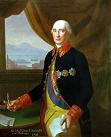





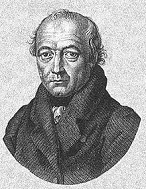
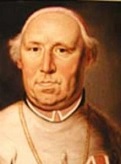





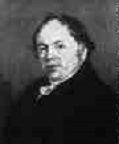



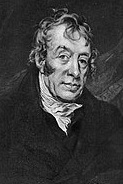
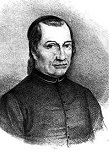
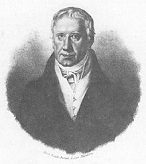



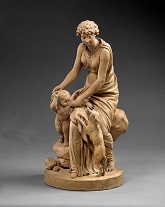

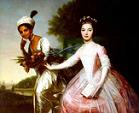


1799 The Time of the End begins this year, according to Jehovah's Witnesses founder Charles Taze Russell (1852-1916), followed in 1874 by the invisible return of Christ, and the End of the World in 1914. On Jan. 23 the French army of Jean Etienne Championnet takes the kingdom of Naples from a numerically superior (10x greater) Austrian army under Gen. Baron Karl Mack von Leiberich and occupies Florence, forcing King Ferdinand IV of Naples and his wife Marie Caroline (Maria Carolina) to flee along with Tuscan grand duke Ferdinand III and British Adm. Sir John Acton, 6th Baronet (1736-1811); the French then set up up the Parthenopean Repub. in the Piedmont (Naples), marking the emergence of the Camorra secret crime syndicate; Leiberich surrenders to the French on the promise of a safe return, but Napoleon reneges and has him sent as a POW to France, after which he escapes from Paris in diguise in 1801; meanwhile the Second Coalition against France is joined by Austria, Russia, Turkey, the Vatican, Naples, and Portugal, going after France on N and S fronts. On Jan. 30 the Turkish sultan reneges on his promises and allows the hated Janissaries to return to Serbia, fomenting revolt; too bad, the Janissaries beat them to it. On Feb. 6 Napoleon and 13K French troops begin a march E from Egypt to Palestine and Syria, and capture Al-Arish after an 11-day siege. On Feb. 22 George Washington's nephew (son of his sister Betty) Lawrence Lewis (1767-1839) of Fredericksburg marries his adopted daughter (Martha Washington's granddaughter) Eleanor (Nelly) Parke Custis (1779-1852), and after the death of Martha Washington in 1802 they move into Woodlawn Plantation, a house designed by U.S. Capitol architect Dr. William Thornton on 2K acres set aside by Washington from his Mount Vernon, Va. estate, which is finished in 1805. On Mar. 3-7 Napoleon captures former Crusader port Jaffa, then stinks himself up by executing all 3K of the garrison, pissing-off the whole Ottoman army to resist to the last man; on Mar. 18 Nappy sieges the seaport of Acre (St. John d'Acre), defended by Ottomans assisted by the British navy under Adm. Sir William Sydney Smith (1764-1840), and gives up after nine assaults, then hears of the 25K-man Damascus army approaching, sending 2K men under Gen. Kleber to scout them, who on Apr. 16 get into the Battle of Mt. Tabor, holding them off until Nappy catches up and decisively defeats them, after which he goes back to the siege of tough acorn Acre, where Lebanese emir #6 (1788-1840) Bashir Chehab (Shihab) II (1767-1850) refuses to assist him even though he and his family converted from Sunni Muslim to Marionite Christianity. Take your doughnut and get your ass outta here? On Mar. 25 after Austria declares war on France, Archduke Charles, commanding 60K Austrian and Russian troops defeats the 40K-man French army of the upper Rhine under Gen. Jourdan at the First Battle of Stockach, driving them back to the Rhine River, then again on Apr. 5 at the Battle of Magnano, causing Jourdan to retreat to France and resign his command, being replaced by Gen. Andre Massena (1758-1817), who goes on to become Napoleon's #1 marshal ("the Great Massena"). On Mar. 28 New York State abolishes slavery, joining R.I., Penn., Mass., N.H., and Conn. In Mar. a large French fleet under Adm. Bruix breaks the British blockade of Brest, cruises around without any significant engagement, then returns; too bad, Nappy's orders from the Directorate (to return to France), which Bruix was delivering are captured by the Brits. On Apr. 25-27 an Austrian-Russian army under reactivated Russian field marshal Count Alexander Suvorov crosses into N Italy and defeats the French at the Battle of Cassano d'Adda, ending the Cisalpine Repub., and the allies enter Milan while Russian troops enter Turin. On May 4 after a traitor in his ranks betray him, the British kill Tipu Sultan (b. 1750) (ruler since 1782) as he defends the walls of the capital of Srirangapatnam, and conquer the state of Mysore in S India, ending the Fourth Anglo-Mysore War (begun 1798), then divide it between themselves and Hyderabad; clever Tipu Sultan used mass rocket attacks on the pesky Brits, which inspires Sir William Congreve (1772-1828) to invent Congreve Rockets in 1804 - was it an eyesore and they had to hide it under the bed? On May 4 Napoleon's artillery finally breaches the walls of Acre, and on May 7 the Ottoman army from Cyprus arrives by sea, causing Nappy to step up efforts on Acre, only to give up on May 20 after two failed assaults on May 8 and 10; meanwhile the French convert the old Carmelite monastery on Mt. Carmel to a hospital, which is destroyed by the Arabs after they withdraw, and later rebuilt; after uttering the immortal soundbyte (about Sir William Sydney Smith) "That man made me miss my destiny", Nappy is forced to return to Egypt, where he hopes to get back into the action; a proclamation dated Apr. 20 making Palestine an independent Jewish state, which Napoleon had hoped to proclaim from Jerusalem after capturing Acre is trash-canned - proving a Zionist conspiracy behind Napoleon, and how for it to prevail the pesky Brits had to be be subverted first, enter Disraeli? On May 10 the Damanhur Massacre 100 mi. NW of Cairo, Egypt sees a revolt against the French viciously crushed by French Gen. Lanusse, killing 1.5K and burning the area down. In May royalist forces under Cardinal Fabrizio Ruffo (1744-1827), with the help of a British fleet commanded by Commodore Horatio Nelson recapture Naples and reinstate Ferdinand IV; the rebels are promised leniency by Ruffo, but Nelson massacres them and kills their leader Francesco Caracciolo (1752-99); the king returns and rules with an iron hand under the guidance of his wife, who proposes a "cleansing" action against French republican sympathizers. On June 4-7 Archduke Charles defeats the French under Gen. Massena at the First Battle of Zurich, causing him to retreat beyond the Limmat River N of Lake Zurich and regroup; the Helvetian Repub. totters, and is propped-up by the French. On June 18-19 Russian hero field marshal Alexander Suvorov defeats Gen. MacDonald at the Battle of the Trebbia River (not to be confused by the V by Hannibal in 218 B.C.E.), foiling his efforts to unite his army with French forces in Italy, then with Gen. Melas defeats the French under Gen. Joubert on Aug. 15 at the Battle of Novi as they advance from Genoa, driving the French from the region; France loses control of the Italian peninsula, and Suvorov gains the surname "Italiski", going on to lead his armies into Switzerland in an effort to join with Russian forces there, but is forced by the French to retreat to Vorarlberg, Austria, pissing-off Tsar Paul I, who dismisses him next year, causing him to soon die (of grief?). On June 22 Britain becomes the last nation to join the Second Coalition. In June Jean Jacques Regis, duc de Cambaceres becomes French minister of justice. On July 12 after the govt. of William Pitt the Younger gets scared of Jacobin activity, the 1799 Combination Act prohibits trade unions and collective bargaining by British workers; followed by the 1800 Combination Act. On July 14 a combined British, Turkish, and Russian fleet under British adm. Sir William Sydney Smith with 15K Turkish troops lands in Aboukir Bay and captures the remaining French fort at the W end under Gen. Marmont, who sends news to Napoleon in Cairo, causing him to head for Alexandria with 10K infantry and 1K cavalry, and defeat the Turks under Mustapha Pasha on July 25 at the First Battle of Aboukir, with 4K-6K Turks KIA, and Mustapha Pasha captured, becoming Nappy's last V in Egypt; on Aug. 24 after Sir William Sydney Smith allows Nappy's orders from the Directorate to return to France to get through, and Nappy hears about the unpopularity of the Directory, and also that the Second Coalition has almost reconquered N Italy, he secretly leaves Cairo for France, leaving his troops behind under the command of Gen. Jean-Baptiste Kleber (1753-1800), slipping through the British fleet in Adm. Ganteaume's flagship Le Muiron and landing in France on Oct. 8-9 at Frejus (Fréjus), home of his friend and Directory member Abbe Sieyes; in Sept. after giving up on a new Suez Canal, Kleber begins negotiations with the Ottomans to evacuate Egypt. On July 20 Joseph Fouché (Fouche) (1763-1820) is appointed French minister of police (Until July 7, 1815), going on to become "the architect of the police state"; Jean Baptiste Say (1767-1832), ed. of the Decade Philosophique Literaire et Politique since 1794 is called to the tribunate by Napoleon and assigned to the Committee of Finance - help me get away from myself? On July 23 an expedition led by Salzburg (Gurk) prince-bishop Count Franz Xaver of Salm (1749-1822), his vicar gen. of Klagenfurt Sigismund Ernst Hohenwart (1745-1825), and scientist Baron Xaver von Wulfen (1728-1805) reaches the summit of the 23,370 ft. (3,770m) Kleinglockner, 3rd highest mountain in Austria; on July 28, 1800 another expedition led by Austrian teacher Franz Michael Vierthaler (1758-1827) and German physician-botanist David Heinrich Hoppe (1760-1846) leaves, climbing the 12,461 ft. (3,798m) Grossglockner, highest mountain in Austria and highest in the Alps E of the Brenner Pass. On Aug. 29 Pope (since 1775) Pius VI (b. 1717) dies a prisoner of the French in Valence, France. In Aug. Prussian polymath scientist Alexander von Humboldt (1768-1859) decides to end cents. of Spanish and Portuguese inaction and begins a scientific expedition to South Am., landing in Caracas, then traveling into the interior and exploring the Orinoco River region; later he proceeds to Cuba, back to Colombia, then S into the Andes, finally leaving Guayaquil and arriving in Acapulco, Mexico in Mar. 1803; this year he travels through Venezuela, noting that Aragua Valley farmers are deforesting the region to grow indigo, causing a nearby lake to dry up, causing him to write a letter in 1804 to U.S. Pres. Thomas Jefferson with the soundbyte: "The wants and restless activity of large communities of men gradually despoil the face of the Earth", becoming the first known Western observation of human-caused climate change?; really just land despoilation? On Sept. 25-26 after unlucky Russian Gen. Alexander Mikhailovich Rimsky-Korsakov (1753-1840) replaces Archduke Charles, and Russian Gen. Alexander Suvorov crosses the Alps to support him but is forced back by the French, the Second Battle of Zurich is a V for 75K French under Gen. Andre Massena over 60K Russians and Austrians under Alexander Korsakov and Friedrich von Hotze, undoing all of Suvarov's Vs and causing the Russkies to withdraw from the Second Coalition after their retreat through the snowy Alps turns into a disaster; meanwhile the French take Constance and threaten Archduke Charles' flank as he prepares to invade France from the Rhine; at least the expedition isn't a total bust, since on his way back to Russia Korsakov brings the 1478-80 Madonna and Child with Flowers (Benois Madonna), Leonardo da Vinci's first work painted independently of his master Verrochio, and it ends up with the Benois family in 1880, who keep it secret until 1909, by which time everyone loves everyone. In Sept. Rome is recaptured by French Bourbon troops. On Oct. 18 after the British and Russians fail to take the Netherlands, the British surrender all POWs taken in return for an unobstructed evacuation. On Oct. 22 the Russians drop out of the Second Coalition. Hurry, this offer ends soon? On Nov. 9 the Coup of 18 Brumaire sees Napoleon overthrow the Directory (founded 1795), getting Sieyes, Roger-Ducos, and Barras to resign, and using his younger brother Lucien Bonaparte (1775-1840) (pres. of the Council of Five Hundred) to bribe its remaining two members to help him put the 3-member French Consulate in power, consisting of Nappy (first member, on Dec. 24), Sieyes, and Roger-Ducos, and convincing the councils to establish a commission to draft a new constitution; the French Rev. ends after 10 years, 7 mo., 11 days; Napoleon enjoys absolute power until Apr. 13, 1814. On Nov. 13 the French Law of Hostages is repealed, and Napoleon goes personally to the Temple to receive them. On Dec. 14 ever-pious sermon-collecting church-going Providence-relying Anglican (Episcopal) (Mason but not a Deist) (daily Bible reading and spoken prayers on his knees from 4-5 a.m. and 9-10 p.m.) father of his country and austere model of virtue George Washington (b. 1732) gets caught in a snowstorm while marking trees to cut for a new gravel path and fish pond, resulting in an acute throat inflammation, then goes to bed; after being drained of two quarts of blood by three eminent doctors he dies in a few hours; as he is about to croak, he crosses his hands neatly over his chest, then says, "Tis well", according to his personal secy. (since 1784) Tobias Lear (1762-1816); later somebody adds "Father, into thy mercy I commend my soul"; a case of covered-up medical malpractice?; on Dec. 26 Henry "Light-Horse Harry" Lee (1756-1818) (future father of Gen. Robert E. Lee) gives the Funeral Oration before both houses of Congress, containing the soundbyte: "First in war, first in peace, first in the hearts of his countrymen". U.S. Pres. Adams ignores his Hamiltonian-influenced cabinet and sends a new mission to France, outraging his fellow Federalists (who want French blood) and insuring his defeat in the election next year. On Dec. 25 the Constitution of Year VIII goes into effect in France before the results of a popular vote are announced, and when they are, the 3,011,107 vs. 1,562 count causes suspicions; there is no bill of rights, except for individual liberty and inviolability of homes; Napoleon becomes First Consul with a 10-year term, and then appoints two other consuls with only consultative powers, moving into the Tuileries (royal palace) and appointing Talleyrand as foreign minister. On Dec. 29 the Ottomans seize the Egyptian border post of Al-Arish from the French, causing the Frogs to get antsy, forcing Gen. Kleber to step-up negotiations. On Dec. 30 Christians in France are permitted to worship on Sundays. U.S. chief justice Oliver Ellsworth resigns after Pres. Adams appoints him U.S. commissioner to France to negotiate with Napoleon. Penn. auctioneer (Am. Rev. War vet) John Fries (1750-1818) arouses resistance among E Penn. Germans to the direct property tax passed the previous year by Congress to finance the war with France, beginning Fries' Rebellion among the Germans of Montgomery, Bucks, Lehigh and Berks Counties, causing Pres. Adams to call out the Penn. militia; Fries is captured, taken to Philly, and convicted of treason and sentenced to death but pardoned next year along with his followers by Pres. Adams, and he becomes a tinware seller - a long time since the days of the Romans and Goths? The Grisons are forced by the French to join the Helvetic Repub. Joao VI is officially recognized as regent of Portugal for his insane mom Maria I. After being driven from Bavaria, German Roman Catholic theologian Martin Boos (1762-1825), whose pietistic beliefs border on Lutheranism settles in Linz, Austria, where he is protected by Bishop Gall until his 1812 death, after which new bishop of Linz (1809-25) Sigismund Ernst Hohenwart (1745-1825) begins persecuting him and his followers. The Abbey of Monte Cassino, famous as the 6th cent. home of St. Benedict of Benedictine Rule fame is sacked by the French. Nguyen Anh's forces finally capture the Tay Son fortress of Qui Nohn; meanwhile French Catholic priest Pigneau de Behaine (b. 1741) dies, and is buried in Saigon with full military honors as a hero, complete with a royal bodyguard of 12K men and 40K mourners; too bad, Anh's son Canh, whom he had tried to convert to Roman Catholicism never buys it, and dies before his daddy, even though the priest had permitted him to continue with ancestor worship the good ole Catholic way, calling it a civil ceremony as long as he becomes a Catholic monarch? In 1799 the 14K Xhosa (Khoi) soldiers in British service on the frontier of the South African Eastern Cape, assigned to control the Bantu farmers rebel, and that great idea goes down the tubes, beginning the nine Xhosa Wars ends 1879). French Gen. Thomas-Alexandre Dumas (1762-1806) (later father of novelist Alexandre Dumas pere) opens his big mouth and calls Napoleon's Egyptian campaign stupid and incompetent, causing Big N to utter the soundbyte: "Your five feet ten inches could not save you from being shot by a firing squad now if I ordered it", after which he resigns from the army; too bad, on his way home he is captured in Taranto and imprisoned by the Sicilians for two years, where his health is broken by attempts at arsenic poisoning; after returning to France, he manages to father you know who in 1802 before croaking in 1806. James Monroe becomes gov. of Va. (ends 1802). Baron Jean Baptiste Antoine Marcellin de Marbot (1782-1854), "Bonaparte's Blessed Fool" joins Napoleon's army. U.S. treasury sec. (1795-1800) Oliver Wolcott Jr. designs the U.S. Customs Service Flag. Rocky Mountain House in WC Alberta, Canada is founded by the Hudson's Bay Co. as a fur trading post; meanwhile the rival North West Co. establishes the nearby Acton House; they merge in 1821. The Alaska-Russian Am. Co. is established by the Russian govt., with a monopoly to exploit Alaskan resources. The Dutch East India Co. goes bankrupt. The U.S. Congress buys West Point, N.Y. for $11,085. France becomes the second country to adopt a decimal currency. The name "Pilgrims" are first applied to the Puritan Separatists of Plymouth Colony way back in the 1620s, and sticks. The Church Missionary Society is founded in London to send hundreds of Christian missionaries to other countries. A 17 lb. gold nugget is discovered in Charlotte, N.C., the first found in the U.S., making it the gold capital of the U.S. until the 1840s Calif. Gold Rush. Daniel Boone settles near St. Louis, Mo. until his death in 1820; the region is controlled by Spain until the 1803 Louisiana Purchase. William and Dorothy Wordsworth move to Dove Cottage in Grasmere in the English Lake District, close to poets Samuel Taylor Coleridge and Robert Southey, where they become known as the Lake Poets. The U. of Cologne and U. of Mainz are closed. Henry Cavendish, Benjamin Thompson, Count Rumford et al. found the Royal Institution of Great Britain to sponsor science lectures. Zurich-born English-Swiss painter Henry Fuseli (1741-1825) begins exhibiting a series of 47 paintings based on topics from John Milton's works, hoping to found a Milton Gallery; too bad, it closes next year. This year marks "the beginning of the time of the end" (of the rule of gentile nations), according to Jehovah's Witnesses leader J.F. Rutherford. Johann Heinrich Pestalozzi (1746-1827) opens a school in Burgdorf, Switzerland. Pierre Samuel du Pont de Nemours emigrates to the U.S. with his sons, hoping to establish a colony in Va., which never happens. Architecture: On Oct. 2 after purchasing the land on July 23, the U.S. Congress establishes the Washington Navy Yard in Washington, D.C., becoming the oldest shore establishment of the U.S. Navy; the S boundary is the Anacostia River, the W side is undeveloped marsh. Gracie Mansion in N.Y. is built, becoming the residence of the N.Y. gov. While Napoleon is off in Egypt, his wife Josephine purchases the rundown mansion of Chateau de Malmaison in Rueil, 7 mi. W of Paris (dating back to the 9th cent.), which comes with 150 acres of woods and meadows, all for an exorbitant 300K francs, which pisses him off until she turns it into a showplace with a heated orangery, greenhouse, rose garden, and zoo, where she remains after her divorce until her 1814 death; Nappy stays there after his 1815 defeat at Waterloo before they ship him off to St. Helena. Inventions: Italian physicist-chemist Alessandro Giuseppe Antonio Anastasio Volta (1745-1827) makes the shocking discovery of the Voltaic Pile, reporting it to the British Royal Society next year; the first one is made of zinc and copper metal plates and wet cardboard soaked in salt solution, and he later substitutes silver for copper and cloth for cardboard to build bigger piles from which he can draw sparks and shocks, amazing the world and causing a sensation; in May W. Nicholson and A. Carlile use a voltaic pile to decompose water, observing oxygen appearing at one pile and hydrogen at the other, adding to the sensationalism with the idea that atoms are held together by electricity - and hence immortality is just around the corner? Science: English scientist Humphry Davy (1778-1829) proves that two pieces of ice rubbed together will melt without the addition of any heat, disproving the Caloric Theory of Heat; on Dec. 26 he becomes the first to describe the mental effects of Laughing Gas (nitrous oxide); "I existed in a world of new-connected and newly modified ideas." French naturalist Etienne Geoffrey St. Hilaire (1772-1844) describes and makes a color plate of a liger, the offspring of a male lion and female tiger, the largest existing feline. Scottish mathematician William Wallace (1768-1843) pub. the concept of the Simpson Line, the line through the three closest points to a point on the circumcircle of a triangle; in 1821 he improves the pantograph, inventing the Eidograph. A preserved woolly mammoth is discovered in Siberia. U.S. agriculturists first describe sweet corn grown by the Iroquois; it takes awhile, but by 1980 it is the #1 canned vegetable in the U.S. Nonfiction: Hannah Adams (1755-1831), History of New England. William Lisle Bowles (1762-1850), The Battle of the Nile. Karl Ditters von Dittersdorf (1739-99), Autobiography; completed two days before his Oct. 24 death. Anselm von Feuerbach (1775-1833), Revision der Grundsatze und Grundbegriffe des Positven Peinlichen Rechts (2 vols.) (1799-1800); opposes vindictive punishment, claiming that law is independent of morality. Johann Gottlieb Fichte (1762-1814), System der Sittenlehre. Arnold Heeren (1760-1842), Geschichte der Staaten des Altertums; begins the new approach of looking at the ancient world via economics and financial systems. Johann von Herder (1744-1803), Metakritik; contra Kant and Fichte. August von Kotzebue (1761-1819), Uber Meinen Aufenthalt in Wien (autobio.). Pierre-Simon de Laplace (1749-1827), Traite de Mecanique Celeste (Traité de Mécanique Céleste) (Treatise on Celestical Mechanics) (1799-1825); all the developments in gravitational astronomy since ooh-ooh-ooh-ooh-ooh-ooh Newton. Gaspard Monge (1746-1818), Geometrie Descriptive; incl. a gen. theory of curvature that is used by Carl Friedrich Gauss, making him the inventor of descriptive geometry (used in technical drawing). Hannah More (1745-1833), Strictures on Female Education. Mungo Park (1771-1806), Travels in the Interior Districts of Africa: Performed under the Direction and Patronage of the African Association in the Years 1795, 1796, and 1797; announces his big discovery of the Niger River, becoming a big hit and increasing interest in Africa, inspiring other explorers; "Whatever difference there is between the negro and European, in the conformation of the nose, and the colour of the skin, there is none in the genuine sympathies and characteristic feelings of our common nature"; "They [Mandinkas] were all very inquisitive, but they viewed me at first with looks of horror, and repeatedly asked if my countrymen were cannibals. They were very desirous to know what became of the slaves after they had crossed the salt water. I told them that they were employed in cultivating the land; but they would not believe me... A deeply-rooted idea that the whites purchase negroes for the purpose of devouring them, or of selling them to others that they may be devoured hereafter, naturally makes the slaves contemplate a journey towards the coast with great terror, insomuch that the slatees are forced to keep them constantly in irons, and watch them very closely, to prevent their escape." Mary Anne Radcliffe, The Female Advocate. J.F. Saint-Lambert, Principe des Moeurs chez Toutes les Nations, ou Catechisme Universal. Antonio Scarpa (1752-1832), Commentarius de Penitiori Ossium Structura; cellular structure and diseases of bone. Friedrich von Schlegel (1772-1829), Geschichte der Poesie der Grichen und Romer (History of the Poetry of Greek and Rome). Friedrich Schleiermacher (1768-1834), Reden Uber die Religion - Romantic dreams not yet all gone? Guess who came up with the White is Right theory and drove white women to bleach their anuses, a man named White? Charles White (1728-1813) An Account of the Regular Gradation in Man, and in Different Animals and Vegetables, and from the Former to the Latter; believer in the Neoplatonic Great Chain of Being theory that "All organisms are arrange in a static chain of being, rising through small gradations from plants to animals to humans" disputes Buffon's claim that only the same species can interbreed by citing the example of hybrids incl. foxes, wolves, and jackals, regarding whites and blacks as different species that had a different origin, with blacks being more primitive thus no doubt coming from monkeys (primates), their skin pigmentation indicating inferiority (primitiveness), adding that white women are inferior to white men because they have darker pigmentation in "the areola round the nipple, the pudenda, and the verge of the anus". Juan Yuan (1764-1849), Biographies of Astronomers and Mathematicians; adds the study of science and math to the classical Chinese curriculum. Music: Ludwig van Beethoven (1770-1827), Symphony No. 1 in C major, Op. 21 (1799-1800); incl. Adagio Molto, Andante Cantabili con Moto, Menuetto, Finale. Franz Joseph Haydn (1732-1809), The Creation (oratorio) (Vienna). Vicente Martin y Soler (1754-1806), Tancrede (ballet); Le Retour de Poliorcete (ballet) (St. Petersburg). Art: William Blake (1757-1827), The Angel Gabriel Appearing to Zacharias (1799-1800). Jacques-Louis David (1748-1825), The Intervention of the Sabine Women; to save Rome from destruction in 753 B.C.E. for their rape. Henry Fuseli (1741-1825), Silence (1799-1801). Francisco de Goya (1746-1828), Los Caprichos (Capricos) (etching series). Augustin Pajou (1730-1809), Fidelity, the Mother of Constant Love (sculpture). Johann Zoffany (1733-1810), Dido and Lady Elizabeth Murray; lily-white lady and her chocolate brown slave woman, showing the latter with uncommon dignity and equality. Plays: Louis-Jean Nepomucene Lemercier (1771-1840), Les Quatre Metamorphoses; written to prove that indecent subjects can be treated without offense? Novalis (1772-1801), Heinrich von Otterdingen. Johann Christoph Friedrich von Schiller (1759-1805), The Piccolomini (Mannheim). August von Schlegel (1767-1845), Lucinde. Richard Brinsley Sheridan (1751-1816), Pizarro (May 24). Ludwick Tieck (1773-1853), Prinz Zerbino (satire). Poetry: Thomas Campbell (1777-1844), The Pleasure of Hope. Thomas Moore (1779-1852), Poetical Works of the Late Thomas Little. Novalis (1772-1801), Geistliche Lieder (Sacred Songs). Ludwick Tieck (1773-1853), Romantische Dichtungen (2 vols.) (1799-1800). Novels: Charles Brockden Brown (1771-1810), Edgar Huntly; a forest full of hostile Indians; Arthur Mervyn; Ormond; a woman stabs to death a wealthy scoundrel trying to rape her. William Godwin (1756-1836), St. Leon; Gothic novel about "earthly immortality"; inspires his daughter Mary Shelley's novel "Frankenstein"? Johann Friedrich Rochlitz, Charaktere Interessanter Menschen (Characters of Interesting Men). Robert Southey (1774-1843), The Old Man's Comforts and How He Gained Them; The Devil's Thoughts; rev. ed. pub. in 1827 as "The Devil's Walk". Wilhelm Heinrich Wackenroder (1773-98)and Johann Ludwick Tieck (1773-1853), Phantasien uber die Kunst; the Romantic movement in Germany gets off to a fantastic start? Births: Am. "Crania Americana" natural scientist-physician (Quaker) ("Father of the Am. School of Ethnography") Samuel George Morton (d. 1851) on Jan. 26 in Philadelphia, Penn.; educated at the U. of Penn., and U. of Edinburgh. Portuguese Romantic poet-dramatist-novelist and Liberal politician Joao Baptista da Silva Leitao, 1st Viscount de Almeida Garrett (d. 1854) on Feb. 4 in Porto; educated at the U. of Coimbra; founder of the Portuguese Romantic lit. movement. Am. Mormon leader Phineas (Phinehas) Howe Young (d. 1879) on Feb. 16 in Hopkinton, Mass.; brother of Joseph Young (1797-1881) and Brigham Young (1801-77). German chemist (colorblind) Ferdinand Reich (d. 1882) on Feb. 19 in Bernburg; collaborator of Theodor Richter (1824-98). English artist-explorer Frederick Catherwood (d. 1854) on Feb. 27. German theologian (Roman Catholic) Johann Joseph Ignaz von Doellinger (Döllinger) (d. 1890) on Feb. 28 in Bamberg, Vavaria; educated at the U. of Wurzburg; rejects the dogma of papal infallibility. Czech "The Hundred-Petaled Rose" poet Frantisek Ladislav Celakovsky (Frantiek Ladislav Celakovský) (AKA Marcian Hromotluk) (d. 1852) on Mar. 7 in Strakonice. Am. Repub. politician and U.S. war secy. #26 (1861-2) Simon Cameron (d. 1889) on Mar. 8 in Maytown, Penn.; first "state boss" in the U.S., controlling the Penn. Repub. Party from 1857-77, then passing control to his son James Donald Cameron. German Basedow Disease physician Karl Adolph von Basedow (d. 1854) on Mar. 28 in Dessau; educated at the U. of Halle. English PM (1852, 1858-9, 1866-8) Edward George Geoffrey Smith-Stanley, 14th Earl of Derby (d. 1869) on Mar. 29; educated at Eton School, and Christ Church, Oxford U.; starts out a Whig then breaks with them and forms the Derby Dilly in 1834. English Harrods Dept. Store founder Charles Henry Harrod (d. 1885) on Apr. 16 in Lexdon, Essex; father of Charles Digby Harrod (1841-1905). Am. Dem. diplomat-politician-judge and U.S. atty. gen. #18 (1845-6) John Young Mason (d. 1859) on Apr. 18 in Greensville County, Va. English first Anglican bishop of Jerusalem (1842-5) (Jewish convert) Michael Solomon Alexander (d. 1845) on May 1 in Schonlanke, South Prusia (modern-day Trzcianka, Poland); emigrates to England in 1820. French "La Comedie Humaine" realist novelist-dramatist Honore (Honoré) de Balzac (d. 1850) on May 20 in Tours, Indre-et-Loire; drinks up to 50 cups of coffee a day for inspiration. English #1 fossil hunter Mary Anning (d. 1847) on May 21 in Lyme Regis, Dorset. English "The Bridge of Sighs" humorist poet Thomas Hood (d. 1845) on May 23 in London; father of Tom Hood (1835-74). French "La Juive" composer (Jewish) Jacques Francois Fromental Elias Halevy (Halévy) (d. 1862) on May 27 in Paris; born on the French Rev. day of Fromental; son of Elie Halevy (1760-1826); brother of Leon Halevy (1802-83); father-in-law of Georges Bizet; studies in the Paris Conservatoire with Luigi Cherubini (1760-1842). Russian "Eugene Onegin", "Boris Godunov" #1 Romantic poet-playwright-novelist ("Founder of Modern Russian Literature") ("the Russian Shakespeare") Alexander Sergeyevich Pushkin (d. 1837) (AKA Ivan Belkin) on June 6 (May 26 Old Style) in Moscow; aristocrat parents; great-great-grandson of black Russian Gen. Abram Petrovich Gannibal (1695-1781); educated at Tsarskoe Selo; enters govt. service in 1817, but proves too liberal for Moscow and is transferred to Bessarabia, then ends up as Russian historiographer until his untimely death. English inventor Walter Hancock (d. 1852) on June 16 in Marlborough; brother of Thomas Hancock (1786-1865). English astronomer William Lassell (d. 1880) on June 18 in Bolton. French Meniere's Disease physician Prosper Meniere (Ménière) (d. 1862) on June 18 in Angers. Scottish botanist (in the U.S.) David Douglas (d. 1834) on June 25 in Scone (near Perth); educated at the U. of Glasgow; namesake of the Douglas fir (Pseudotsuga taxifolia) of W North Am. Swedish-Norwegian king (1844-59) Oscar I (Joseph Francois Oscar Bernadotte) (d. 1859) on July 4 in Paris; only son of Marshal Bernadotte (Charles XIV) (1763-1844) and Queen Desideria Clary (1777-1860); father of Oscar II (1829-1907); godson of Napoleon I, who names him, causing the name Oscar (Ansgar) (Norse "God's spear") (Gael. "deer friend") to spread throughout Scandinavia and Germany. Scottish inventor James Bowman Lindsay (d. 1862) on Sept. 8 in Carmylle (near Arbroath), Angus; educated at St. Andrews U. Am. Texian Army co-CIC (1835-6) Francis White "Frank" Johnson (d. 1884) on Oct. 3 in Leesburg, Va. Honduran statesman Francisco Morazan (Morazán) (d. 1842) on Oct. 3 in Tegucigalpa. German hydrotherapy inventor Vincenz Priessnitz (d. 1851) on Oct. 4 in Freiwaldau am Grafenberg, Silesia. Japanese inventor ("the Thomas Edison of Japan") Tanaka Hisashige (d. 1881) on Oct. 16 in Kurume, Fukuoka; son of a tortoise shell craftsman; founder of Toshiba (1875). German-Swiss fuel cell chemist (discoverer of guncotton and ozone) Christian Friedrich Schonbein (Schönbein) (d. 1868) on Oct. 18 in Metzingen, Wurttemberg, Swabia. Am. rancher Robert Livermore (d. 1858) in Oct. in Springfield, Esse, England; emigrtes to the U.S. at age 17. French explorer (Timbuktu) Auguste Rene Caillie (René Caillié) (d. 1838) on Nov. 19 in Mauze-sur-le-Mignon, Deux-Sevres. Am. abolitionist Transcendentalist philosopher and educational reformer (vegan) Amos Bronson Alcott (d. 1888) on Nov. 29 in Wolcott, Conn.; father of writer Louisa May Alcott (1832-88). Am. mountain man and U.S. Indian agent (1854-) Thomas "Tom" "Broken Hand" "White Hair" Fitzpatrick (d. 1854) in Ireland; emigrates to the U.S. at age 17; a rifle explodes in his left hand, and his hair turns white during a harrowing escape from Indians. English sculptor Richard Westmacott III (the Younger) (d. 1872) in London; son of Richard Westmacott Jr. (1775-1856). Deaths: Chinese Manchu emperor #4 (1735-96) Qin Qian Long (b. 1711) on Feb. 7 in Beijing. Italian sculptor Bartolomeo Cavaceppi (b. 1716) on Dec. 9. Italian mathematician-philosopher ("the Witch of Agnesi") Maria Agnesi (b. 1718) on Jan. 9 in Milan. Italian dancer Barberina Campanini (b. 1721). Bavarian-Palatine elector Karl Theodor (b. 1724) on Feb. 16. French mathematics historian Jean Etienne Montucla (b. 1725) on Dec. 18 in Versailles. British Adm. Richard Howe (b. 1726) on Aug. 5. Scottish chemist Joseph Black (b. 1728) on Dec. 6 in Edinburgh. French architect Etienne-Louis Boullee (b. 1728) on Feb. 4. Italian scientist Lazzaro Spallanzani (b. 1729) on Feb. 12 in Pavia (bladder cancer). Dutch biologist-physiologist Jan Ingenhousz (b. 1730) on Sept. 7 in Caine, Wiltshire, England. French dramatist Pierre-Augustin Caron de Beaumarchais (b. 1732). U.S. pres. #1 (1789-97) "His Excellency" George Washington (b. 1732) on Dec. 14 in Mount Vernon, Va. (age 67) (epiglottitis); last words: "'Tis well"; the first of nine U.S. presidents to own slaves, and the first and only U.S. Founding Father to free his slaves in his will: "My creed is not words but deeds"; "Liberty, when it begins to take root, is a plant of rapid growth"; "It would be impossible to rule the world without God and the Ten Commandments"; "If the freedom of speech is taken away, then dumb and silent we may be led, like sheep to the slaughter"; "The bosom of America is open to receive not only the Opulent and respectable Stranger, but the oppressed and persecuted of all Nations and Religions; whom we shall welcome to a participation of all our rights and privileges, if by decency and propriety of conduct they appear to merit the enjoyment"; "Few men have virtue to withstand the highest bidder"; "It should be the highest ambition of every American to... bear in mind that his conduct will not only affect himself, his country, and his immediate posterity; but that its influence may be co-extensive with the world, and stamp political happiness or misery on ages yet unborn" - goes out owning the century? French scientist Jean-Charles de Borda (b. 1733) on Feb. 19 in Paris. Am. "one life to give for my country" Rev. War orator Patrick Henry (b. 1736) on June 6 in Red Hill (near Brookneal), Va. (stomach cancer); the Red Hill Patrick Henry Nat. Monument is established by Congress on May 13, 1986: "For my part, whatever anguish of spirit it may cost, I am willing to know the whole truth, to know the worst, and to provide for it"; "Is life so dear, or peace so sweet, as to be purchased at the price of chains and slavery? Forbid it, Almighty God! I know not what course others may take, but as for me, give me liberty or give me death!" Italian composer Vincenzo Manfredini (b. 1737) on Aug. 5 (Aug. 16?) in St. Petersburg, Russia. Spanish New Spain viceroy (1789-94) Juan Vicente de Güemes, 2nd Count of Revillagigedo (b. 1738) on May 2 in Madrid. Austrian composer Karl Ditters von Dittersdorf (b. 1739) on Oct. 24. English sculptor John Bacon Sr. (b. 1749) on Aug. 4. Am. Rev. leader (DOI signer) William Paca (b. 1740) on Oct. 23 in Md. Swiss Alpine traveller Horace-Benedict de Saussure (b. 1740) on Jan. 22 in Geneva. French Roman Catholic priest Pigneau de Behain (b. 1741) in Vietnam. German scientist Georg Christoph Lichtenberg (b. 1742) on Feb. 24. French "Black Mozart" conductor Joseph Bologne, Chevalier de Saint-Georges (b. 1745) on June 10 in Paris. Am. Rev. War hero William Dawes Jr. (b. 1745) on Feb. 25 in Marlborough, Mass. French pioneer balloonist Jacques Etienne Montgolfier (b. 1745). Indian sultan (of Mysore) (1782-99) Tippu Sultan (b. 1750) on May 4 in Srirangapattana (KIA). French Gen. Louis Andre Bon (b. 1758) on May 19 in Acre (KIA).